

OF
THE
HEAVENLY
RUNEBOOK,
STELLAE
793,
VOLUME IV,
Retrostar
Becca the Red was one of the best fighting Danes, bear-shirted, with a
lion's mane, and barely turned twenty, but
already an accomplished hunter adept with bow, sword, and ax, which Danes had to be to
be taken aboard a warship outbound for battle and prey and booty.
Dane-land was a small place, without great forests and plains or
much farmland, and far too crowded of late, so many cast eyes westerly and sought their fortunes and
livings
elsewhere, wherever defenses were weak and not too wary but the people
rich, and the isles of Britannica
was just what they were looking for.
An old wise man who did not toady up to a king? That was some
brave man! Didn't he value the head attached to his shoulders? It was no wonder that
some of the more thoughtful younger men visited him too. Becca the Red did not have to be told by other men how wise his grandfather Mimir was. He valued his grandfather greatly, and
sought his side as often as he could spare from hunting, practice-fighting, sporting and gaming,
building for pay on the chief's fleet of dragonships, and other manly pursuits.
The crafty one prevailed, and the plan was worked on in secret
meetings in Hedeby and elsewhere in chieftains' mead-halls all over Dane-Land.
It so happened that Becca the Red took part in several meetings, as his father,
Rasmus the Green-Eyed, took him along with him to learn how grown men deal with important
matters. It was rather boring to the young Becca at first, but when he saw that
the Danes were allied in the matter and were truly determined to carry the
daring thing through, he realized it actually concerned himself and his own life, and he
began thinking what his own part of it might be. Yet it troubled him deep within. He knew of an authority greater than his father in his family, namely his aged, very wise
grandfather, and he did not approve of the growing number of raids on
neighboring kingdoms and cities the Danes were making
with their sleek and deadly dragon ships. Plunder, riches of gold, silver, and beautiful women for sale as concubines later after they were "broken in" at orgies, was indeed coming back, but not all the men--there was
the rub to such ventures. Wives lost husbands, brothers, and fathers even,
and mothers lost sons, and sisters their brothers. While some men and families rejoiced
in the booty they gained by attacking some far city, others wailed and mourned their
dead. What gain is that? Mimir would ask. "If it were truly a good thing to do," he observed once to Becca, "there would be merriment for all in it, not sorrow mixed in as with the blood-soaked booty that comes from this raiding." Becca too lost an older brother, Ansgar, just that way. He recalled how his mother had wailed in their house, the sound
piercing through the walls and into the village to the other houses, until
a party of drinking men came staggering and begged his father to shut his wife up, she was spoiling
their celebration of a successful raid. Life went on in his family's house, but
never the same, as the loss of one brother and son was hard on the others. His mother too
seldom found anything to laugh at after that, and her eyes were most often downcast, dark and sad as she went about her household chores. The house was full of gloom, consequently,
and Becca avoided it as much as possible, only coming home late at night to crawl into
his bed.
So Mimir's wisdom acted as restraint on the young, budding warrior, Becca the Red. To please his grandfather, Becca thought how he might appreciate more warmth in his clothes, so he hunted a bear, brought him down with an arrow and a spear thrust, then
flayed the skin and pelt and had it made into a wonderful bear-shirt. Mimir had
outlived two wives, and a slave woman was his only helper now, caring for his
household needs. He might have married her, even though she was much younger, but he judged himself too old for
a wife now.
"Why not take her to bed, Grandfather, to warm your bones at nights? You don't need
to marry her and give her your goods when you die. They can be buried with you or burned in a funeral pyre. And she is young enough to still give a man pleasure."
Mimir shook his head. "I will not force an old man's love on her. She is
content to serve me as she is, my son. And I am content with her as she is. We
get along just fine together, so there is no need for any change. I won't
last too much longer anyway. I feel a chill strangeness creeping into my bones--
like cold wind is blowing there, scattering my elements, whirling them away into
the darkness. Someday soon, I feel, that strange wind will blow ice and snow upon my heart
and the frozen pieces will separate and fly away like leaves from a tree!" "No, no, Grandfather," Becca protested, "you'll live
many days yet! Life is good, it is sweet to the taste--you don't want to taste the bitterness of death yet! You've scarcely put a sweat on beneath your new bear-shirt, and now you will put it off for a thin, cold, burial shroud? Please don't talk that way!"
The old man laughed, then turned very stern. "But you are young and foolish, and
do not know the world yet and how it must face the coming doom, the Ragnarok of the gods! Everything we
know in this wide, bright world is surely coming to an end. Everything! Why, mighty, cloud-piercing Yggdrasil, the wondrous Ash-Tree that upholds the Universe, whose
topmost boughs go up to Asgard the shining abode of the gods, is being consumed even while we speak. An evil serpent and his spawn are busy night and day gnawing its root beside Niflheim, his home in the world of the dead, which will kill the tree and bring the Universe and all we see and know crashing down!"
Becca was appalled the first time he heard this, but what could he say? His Grandfather
knew all about it, and he knew virtually nothing!
"So don't look to Thor's hammer or Odin the One-Eyed Rune-Reader," his grandfather went on, "the Frost Giants and the Mountain Giants who live in Jotumheim, who are the enemies of all that is good, will someday
go to battle against the divine gods, and their brute force will prevail and conquer.
Asgard will be destroyed, Valhalla of the dead heroes will be destroyed, and all the broken, defeated gods driven into whirling darkness to wail
and wander forever."
Something in Becca's heart and soul would not be placidly, hopelessly resigned to fate and rebelled, resisted the awful, inescapable judgment that
his Grandfather described. But he had an immense difficulty that mocked him. He had nothing from his little store of wisdom and knowledge with which to counter
his Grandfather's dreadful words, but still he pleaded with him.
"Is that the utter end? Isn't there going to be anything good come of
it--just darkness and ashes and death?"
His Grandfather paused, rocking back and forth in his bear-shirt,
muttering old verses of a wisemen and skalds who had combined them
into long songs about gods, heroic deeds of men, and ultimate doom for all after
the defeat of the gods.
In his thin, quaking voice, he began singing a few verses he still remembered about
the end of the Universe:
"The sun turns black, earth sinks in the sea,
The hot stars fall from the sky,
And fire leaps high about heaven itself."
Squirming where he sat on a carved stool, Becca was beside himself, and wanted to run out of the room and
lose his tormented thoughts in hunting some boar or bear, but
he tried a last time.
"Oh, Grandfather! Is there no hope for us Danes at all? Surely, you
know of something! Surely the gods would not leave us bereft of every
last reason for living and drawing the breath of life into our lungs! What are these
mighty gods and all their powers for? Balder, Freya, Frigga, Thor, Odin--are they altogether vain and useless to us?"
Mimir the Sage heard his distraught, favorite grandson, knew that the
Northmen's gods were indeed
useless to men in the last extremity, but paused, took a shuddering breath, and his eyes closed tightly, then
sprang open and shone like two sparks from the
hearth fire, singing:
"In wondrous beauty once again
The dwellings roofed with gold.
The fields unsowed bear ripened fruit
In happiness forevermore."
Hearing this, Becca's heart surged, for in these ancient words
the old ones had recognized there was, indeed, a hope, a promise, for the
Danes to cling to amidst the catastrophe of the overthrow of Odin and Thor and
the Universe of stars and moon crashing and dying in darkness!
But what did the wise old ones see? What exactly was it? He had to know or die!
Becca sprang to his feet, then knelt over his grandfather,
putting his ear closest to Mimir's check as he dared, so he
would not miss a single word of his response.
"Is there more they say, Grandfather?" he urged him.
His Grandfather's hand reached and seized his grandson by his fiery hair,
almost wrenching it from the roots.
"Yes! One is coming, He is coming!" he croaked.
Then he sang:
"A greater than all.
But I dare not ever to speak his name.
And there are few who can see beyond.
The moment when Odin falls."
With these last words from an long-ago, long-buried sage or skald,
the old man collapsed back, breathing heavily, and
Ingmar his maid-servant hurried forward to bring a soft, damp cloth to wipe
her aged master's sweating brow.
She looked up at Becca with pleading eyes, as he rose, backing away, not
sure what to do. Was his grandfather all right? Or
dying? But at least he had not left him in despair. He had
given hope in the last fruit of his lips! Becca moved back
away, and slipped outside, waiting a short while, then looked in and
saw that his grandfather was resting, eyes closed,
and breathing regularly. The maid-servant looked up at him, her
face composed and relieved.
"Good Ingmar," he called to the maid-servant. "You are a helpmate for his
last days. Take good care of him! Do not fear. I
will see that you are taken care of well for it, when he takes his
last voyage. I--I thank you, Ingmar, for this service to my grandfather!"
Her eyes glistened, and she bowed her head to him, then returned to her watching her master.
Becca stood, amazed by his own words. What had he done? Thanked a servant?-- a mere slave who had been carried off to Dane-land
years before in a raid, from some foreign land she had probably forgotten? Yet
he knew he could go now, and not be worrying, with Ingmar (her Dane-given name)
tending Mimir. With a
whoop and shout almost of joy, he ran off, scattering the folk out of his path as
he made for the open fields.
It was only in the wilds of a wood he paused to catch his breath, and then
he thought. "But who is the coming "Greater Than All"? What would be his name?"
His Grandfather had failed to say, or the skald's verses he was chanting
were not complete enough to tell him. He saw he must return soon to find out if there
were more verses that would resolve his puzzle. If only there were runes carved on
big, tall stones that
recorded the name of this "Greater Than All" and told his exploits. He would have
to search for them in Dane-land and Jutland as well. But in the meantime, he
was out to do some hunting, and the stalking of a particularly noble, many-pointed buck soon swept any bad thoughts out of
his mind that could have spoiled such a beautiful, bright day as this one was.
Danes, great lovers of pleasure and ease and indefatigable boasters, could be extremely tight-lipped when they had to be--to keep the important
matters of state from slipping into the ears of enemy spies sent to their forest camps and waterside
villages to ferret out what next was hatching in their chiefs' conclaves. They had paid dearly when some Dane among
them had been too loose of tongue after drinking meed and ale too freely among
his friends. It had happened that the enemy they had gone to raid met them prepared
for battle, and they had been worsted. No, they had to have surprise on their side,
before the whole citizenry was aroused and came running with their
weapons to drive the Danes back to their ships. Silence on the subject
in public! Secret meetings! That was the key to
any raid's success.
So Becca also said nothing to others outside the meetings the chief called about
both the meetings and the matters discussed. All that outsiders could see was the
feverish activity taking place down at the yards and boatsheds of the dragon fleet. What the
cause of that hive-like activity was, they could only guess. And even if they
had heard that talismanic name, Lindesfarne, it did not matter so much. They still
could not know when the expedition would take place, or how many would go, and other such critical details.
To learn them, a man sworn to secrecy with a blood oath would have to break
that oath and later pay with the public butchering of his wives and daughters and sons
before his very eyes before his eyes were put out with smoking firebrands. Then his
skin would be flayed, piece by piece, in the famous way they had, excising rib by rib, until finally his lungs were exposed and then were pulled out of his living body and draped around his neck! So far nobody had ever broken that oath and the dreadful
punishment had not been exacted.
Oh, it was clear that the Northumbrian king had many eyes and ears, some of them Danes well-paid for the service, but nobody in the clandestine meetings divulged a single
item. As weeks stretched into months and the year drew toward the celebration day of the Birth of the
Christ Child, the king and his court grew tired of the matter of the impending attack,
and set little store in it. The Danes, just as well informed by their own network,
knew the main force of soldiers stationed at Lindisfarne had been withdrawn back to the king's castle, and few left behind for them to deal with. Many, both Danes and
Northumbrians, thought the expedition to Lindisfarne was even called off, for the
good reason it was thought too daring and the weather normally too stormy at that time of year. For all anyone knew, the cunning Christian monarch, the
Northumbrian king, would be laying a cunning trap, waiting to pounce on them when they showed up on his coasts. Wouldn't the Danes' fleet be sailing right into the mouth of a lion and
be utterly devoured?
Despite the frequent meetings taking much of his time now, Becca
saw his grandfather often as he could, prizing the moments with him. He could
see the strength fading in the old one, day by day, yet Mimir's mind remained
strong and his spirit fearless and unconquered by approaching death,
just as a great veteran warrior's should be, Becca thought.
If only he knew runes-craft and could carve on stone his grandfather's sayings! he thought.
As it was, he had to memorize them, hoping he wouldn't forget one.
They were all wonderful sayings of wisdom, and deserved passing on to
the young Danes playing in the streets, lest they grow up ignorant as
beasts.
So he asked him, "What is the chief prize that Dane men should seek?" He expected
to hear wealth, women, booty, many strapping sons, and a fine ship for raiding, followed
by a stately burial in a longship sunk into a lake, with women mourning and tearing
their hair and clothes, and the warriors burning it and singing chants about his
great deeds of war. But his grandfather replied:
"A man knows nothing if he knows not that wealth begets an ape."
That came as a shock to a wealth-worshipping, young Dane! But he continued.
"Is war bad for a man, fighting a vain thing, and
the sword a snare for him who holds and wields it?"
Mimir: "A coward thinks he will live forever if only he can shun warfare."
Feeling a bit better after hearing that, Becca proceeded.
"Drinking makes the heart glad, and puts shine in the eye of the lover and
the one he loves, and looses the latch of love; besides friends are friendlier,
and everywhere there is laughter where the mead flows freely. Is drink from the
drinking horn
the gift of the gods to us men?"
Mimir: "There lies less good than most believe in ale for mortal men."
The grandson was checked by this, for it recalled to Becca the many evils he had already seen
come of drunkeness in the village--the wife beating, the
servants abused by their masters, the crying children who could not escape
their father's mean kicks, and other such things that too much drinking, not to mention
the hunger it brought when everything was spent on ale instead of food, while
the master lay sodden on his couch with his mead cup refilled all day by cringing
slaves.
Becca thought of asking other, more pleasant things instead. "I have heard a skald laugh and
say, Life is not
but a fool's game, a jest, that's all! It is wrong to take it so serious.
We are all the offspring of some merry god's jesting."
Mimir responded: "A paltry man and poor of mind is he who mocks at all things."
Again, a bit shocked to hear that even gods might be mockers and poor and paltry of mind, for if a god mocked men, then that would
also be wrong even if he were a god, but he went on. "If not wealth, or much ale,
or a big ship, or the other things, then what is the better prize for a man to
hold in his heart?"
His grandfather did not hesitate. "I once was young and traveled alone. I met another and thought myself rich. Man is the joy of man. Be a friend to your friend. Give him laughter for laughter. To a good friend's house the path is straight, though he is far away."
How pleasing such wisdom was to Becca's mind! He was encouraged to ask more.
"Can you trust the nature of a man?"
Mimir: "None so good that he has no faults.
None so wicked that he is worth naught."
"Who can we trust most, man or woman?"
Mimir: "In a maiden's words let no man place faith, nor in what a woman says. But I know men and women both, and men's minds are unstable toward women."
Becca mulled over that for a while. It seemed that it needed more thought at another time.
In any case, it counseled him not to prejudge a man or judge him too harshly if he
did err or wrong him in some way, and be especially careful when he sought to place his faith in someone.
"Will we be judged for our wrongs someday?"
Mimir: "Cattle die and kindred die. We also die. But I know one thing that never dies, judgment on each one dead."
"The secret heart of a man? Where is it? Who can know it?"
Mimir: "The mind knows only what lies near the heart."
He still had his treasure of gold left over from his earlier days as a performer in much demand--
hidden away deep in a particular tree's clefted trunk. So what did he need of
other gold? he thought, if he was destined to be just a farmer herding cattle, pigs, sheep, goats, with some grain fields besides to tend. Besides, his father would just take his
earnings and rewards, if he ever performed again for the chiefs and
the king himself.
How popular he had made himself before his father went and brought him home for good--
afraid that the wealth he was being given for his dances, singing, and
fire leaping would draw robbers to his house if Becca continued to
entertain in the mead-halls.
Becca sighed at the memory, how four years before he had performed
before the king in the great hall at Hedeby on Jutland's coast. Built on a lake at the
head of a fjord, the town was ringed by great ramparts of earth and timbers
sunk deep in the earth, and the port was a forest of mooring masts, as
cargo ships from all over the northern world came to trade. In the markets he
mingled with men of all nations, dressed accordingly in their native costumes. Even Greeks, going by foot the thousand miles through every sort of danger and
difficulty just to seek amber, the treasure of the Baltic sea coasts--he
got to speak with one who told him about the Eastern emperor, who
ruled from a capital city beyond compare in the world. The amber was going to
adorn the necks of the empress and her ladies-in-waiting! He could name any price
if he got there safely! Becca was fascinated, asking him many questions, for the man knew the Danish tongue well enough. What was the best sea-path to
such a city and emperor? he asked him, and the man
told him the way to go, and what to take with him to trade in the East.
Thanking him, Becca put the information away in his memory-box for later
use. With over a thousand souls,
Hedeby was the biggest city Becca had ever visited, and the king's mead-hall
was jammed for the event of his performance with hundreds of warriors, nobles, and
the king himself and his retainers and officials.
He got off some shots at several wild geese in the water, but the
breeze off the water miscarried them and he
only wounded one, then let them go and
wandered up into the woods to see if he might flush any gamebirds there.
One bird with so little meat wasn't worth trailing with a good, long swim, so
he wasn't interested in pursuit of it.
His grandfather preferred venison over gamebird anyway.
A nice young doe would be very tasty in the stew Ingmar would
make for old Mimir--as his few teeth were not much good for chewing steaks these days!
As he crouched low with his bow and made his way carefully through the shrubs and bushes the deer
preferred for forage, he thought of the
performing he used to do.
Perhaps the hour was too late, for as time passed no deer came out to forage on the shrubs, so he decided to wait in the woods for the early morning when the deer would surely emerge hungry and not so wary as in the dusk.
He found a big, old log, pulled enough of it away at the side to be able to crawl
into it, then pulled the wood down to create a blanket for him. Here he knew he would be warm and dry enough to pass the night hours. He slept, dreaming of his
pleasant days as a performer before great men.
"Hear this riddle, great lords! Tell me what I am! My nose is downward [which he demonstrated], and I go on my belly [which he also demonstrated], and I dig into the ground [he clawed at the earth], driven as directed by the grey enemy of the forest and my master and protector, who walks stooping at my tail."
All the while many lords of his audience were shouting various answers, which others hooted at, until
someone got it right: the plow, and the grey enemy of the forest being the ox,
of course.
He first sang the verses
recalling her long, wearisome journey, asking this favor from every rock, stream, sea, lake, tree and plant on earth, until at last she had got round to everybody and everything, and only failed to ask the mistletoe, which she thought too spineless and insignificant a shrub to be concerned about. Balder was safe and would live forever! she thought with relief. But she had not reckoned on the envy of Loki,
a god who was most cunning and thought of a way to put his rival out of the way. Everyone so far enjoyed the game of throwing anything at hand at Balder, but it bounced harmlessly off, for all things had sworn never to hurt Balder. But Loki knew something, and so he used Balder's blind brother, Hoder, to do the deadly deed. He sharpened the woody
stems, small as they were, and glued them together with glue boiled from
deer antlers and hooves, and so fashioned a dart, on which he
twined some mistletoe leaves and berries to make it look harmless. This he
had the willing Hoder throw at Balder, everyone thinking it was some kind of a joke. Hoder threw the
camouflaged dart.
Loki then directed it to pierce Balder's heart, for the mistletoe was the only plant on earth that had not sworn to do Frigga's son no harm, and it did not bounce harmlessly off Balder's breast, as all the rocks, spears, even flaming brands had done. It pierced Balder right to the heart.
Balder was stricken dead! The news sped across the world. All the earth mourned, and as a punishment the mistletoe was
condemned to seek support and climb other plants and trees forever, without any strength in it to
make it stand by itself. After singing this tale, and falling down with a sprig of mistletoe
on his breast, Becca was carried out of the mead-hall. The warriors used their black shields to
carry him to the shore, then he was taken by a small boat to
the pyre-ship, and then the ship was set aflame, though
he was really still safely aboard the boat.
Later, returning home with all this treasure and the cattle pulling the
cart carrying the sheep, enjoying the wild
acclaim of his village and the admiration of all the
women along with the envy in the eyes of the men, he found all sorts of
messages coming, by boat or by courier on horseback--entreating him to
come to various places all over Dane-land and even in farflung
Norway.
It was then his father, seeing the pile of these important messages with the
seals of great chiefs and even a royal seal of the king of
Norway at Trondheim on one of them, put a stop to it, gathering
the whole lot and casting them into the hearth fire.
"I can't let you go again!" he declared to the stunned Becca who
dashed to sweep the messages from the fire, but couldn't save them. "This
has got to stop now!"
Becca had been beside himself, understandably. He had done so well,
the cheers of the warriors and nobles in the king's mead-hall still resounding
in his ears,
so how could he stop, when all the world seemingly wanted to see him
and his cunning arts and would pay him any amount for him to come and perform.
"No, father, I cannot disappoint such important and powerful men! They cannot
be insulted. I must go to them!"
This made his father very angry. "I will not have my youngest son, after losing one older,
be lost in turn! If you grow rich, and you will grow very rich at this rate,
while still living under my roof, I shall not sleep one night in peace, for
fear of a band of robbers breaking in and murdering all of us for your gold!"
Gold drew thieves as thickly as a pot of honey drew flies! Everyone knew there was sense to what his
father said, and Becca wisely withdrew quickly and nursed
his disappointment in the woods by hunting. He came back when
he was good and ready a day later, dragging the hindquarters of
a buck on a makeshift sledge and the many-pointed antlers
strapped to his shoulders.
His father, who had been worried that he might not return home at all,
was greatly relieved and also pleased with the buck.
After that, there was no argument, for his father would hear
not a word more about the matter, once he had decided it.
Besides, it was his house, and his father's word was
law.
Thus it was in the land of the Danes, and Becca
knew that as well as any Dane. He still
had regrets and misgivings, since he knew he was
missing the excitements of the larger world outside his
own village, but it could not be changed--not while he was
living at home and too young yet to set up on his own.
It wasn't easy for his aspirations to be crushed
so early in the tender, green bud, but somehow he endured it without
angry words with his father, which would have done him
no good and perhaps some lasting harm if he had dare raise his
own hand against his father.
Different from his brothers? Howso? Yet as he thought about
his brothers, he saw the difference his father may have
been talking about. After they had gone on raids and returned,
they had changed into strangers. Twisted--that is how they were, just like the
twisted oak of Grandfather Mimir's staff! Before the raids,
they had been brothers, running and doing things together, always
together. It was such joy to be with his brothers then.
They hunted, swam, raced, and played pranks together on the
village folk. They were punished together too when caught.
Nothing could separate them then! Yet later, when they went
off on the ships, he was too young to follow, and the
first time he felt separate from them, and it was a bitter
thing, but he still hoped he would grow up fast and join them,
and everything would be as before.
Yet things never did change back to what they had been.
His brothers returned, and were no longer brothers to him--they were cold,
distant, aloof, even superior in attitudes. They wouldn't
tell him what they had done, and refused to do any more
household chores, dumping them on him and the servant, old
Tiggard. It was a disgrace to be treated like this, but
he had to bear it, and Tiggard--he was even beaten if he didn't
obey them fast enough as they lounged about the house at all
hours of the day, feasting and drinking up their earnings
from the raids.
Once he had found his brothers taking turns dunking poor
old Tiggard's head into the rain barrel, until he
was half-drowned. How they had cursed him, their own brother,
ridiculing him when he pulled Tiggard away from them.
"We're only having a little fun with him!" they
jeered. "Can't he take a little wash now and then? He
may need it, he stinks so bad!"
When he went and told his father how Tiggard was being
mistreated, his father sighed. "It can't be helped, son! They are grown men now.
They can use their numbers to beat me too, if they
so decide they want to take over this house and
stick me in a corner. You see how I can scarcely walk anymore, my
feet and legs hurt so bad. I can't take a sword against my own sons, they
know full well, no matter how bad and boorish they behave
in my house and toward my household. So what can I do
with these beasts whom I have fathered?
All we can hope is they will grow tired of
their life here and take their earnings and
build houses of their own and raise families that
will occupy them. Then we will have
peace under this roof--only then! If they
go on raids, let them! Good riddance to them! We have peace
without them here, for a while at least. Only you--
I thank the gods you were born years after
your brothers, so that I wouldn't lose you so soon!">
He was rewarded for his vigil, for there were the deer,
five or six plump does in the herd, picking at the shrubs' buds while
the canny buck stood somewhere near in the trees out of sight.
He soon had his doe, and carved out the choice, tenderer portions his grandfather
could deal with best, including the inner organs that
made such good stew stock when cooked with lentils, onions, lingonberries, and savory herbs.
Hurrying homeward, he went straight to his grandfather's and found
Ingmar already up and going about stoking the fire and getting
the utensils out for the morning meal. He brought in the
deer meat, and she smiled at him, and took it gladly to fix for
the old one's first food of the day.
Would he be eating with his grandfather? Ingmar asked him.
"Later, I may return for a some portion of it," he told her. "But
take all you like of it, whatever he doesn't want."
Leaving his grandfather's lodge, Becca returned home, then remembered, going to check the notches he
made on a wall of the house, that recorded his age and the months he had lived.
He saw, notching the last day of the month, that he had now reached
his birthday. It was time for him to claim a match for a berth as crewman
on a raiding ship!
So he applied went to his father even before he
had eaten his first meal, and asked him. His father
did not protest, seeing it was his son's year to come of age.
He replied to Becca he knew a captain that was related to
them, but even with that relation he had to
submit to a test of his fighting prowess and strength
against a battle-proven warrior. Was he ready for that? his father
asked him. Becca nodded, and so it was decided:
his father would go to the captain and a testing match would
soon be set. It could even happen that very day!
Becca had excited thoughts as he ate the morning meal with his
father and brothers, and his mother and sisters serving.
It was almost too much to think about and eat at the same time.
His brothers had lately warmed up to him and were already discussing the coming match, and
counseling Becca how best to fight with sword and
the battle-ax, and other particulars they had never seen fit to discuss with
him before.
Of course, they assured him, the warrior would not slay him if he
failed to not fend him off with shield and swordplay,
but he would suffer disgrace and maybe not be taken
on a ship if the captain thought he did too poorly and
wasn't worth the risk.
"Better to not test than to shame and disgrace our family
and our father's name,"
Hedmon, eldest of Becca's brothers, declared. Becca's hair
rose from their roots, but he
held his angry words back, as he realized this brother
was no equal to the eldest brother they had lost--Ansgar who was
solemn and careful of speech--and
spoke without knowledge and was no great warrior himself,
having been turned down by two captains before he
succeeded in getting on a third ship, but only because it
was under-manned and desperate to make up fifty for the oars.
Becca kept his own thoughts. He had
prepared for this, long in advance, in truth. Training himself with all his weapons in turn,
he mastered them, but he still was unsure how well he
would do when the real test came. He knew he could
shoot with the best and hit his quarry, but
it was swords and battle-axes that decided
a fight man to man.
He was taller than most Danes of his age, but
not so broad in the shoulders as many older ones. He could
run swiftly as a deer, but that did not
help him swing for swing of the broad-ax
or sword against a war shield. There it was
the force a man could put into the
blow, that often decided the match, he knew
from times watching the various prospects being tested
for the warships.
But he knew he had more wits than most men.
Could he make them serve him so that he could
overcome the broad-girthed warrior?
So he had observed the matches with keen eyes as captains
tested the applicants for their crews.
When the time came for his own match, he
felt he had a good chance, having seen
the weaknesses of being too big were about
equal to the weaknesses of being too small.
He was in between the two, and was both
strong and swift. Surely, that would prove
an advantage, if he used it with cunning and
the right timing.
Meal over, the family and the others of the
same clan met, discussed Becca's testing and
giving much advice whether they had experience
or not, and
decided to go together to the event on the day
set. But first Becca's father needed to
speak to the captain. He left and
soon returned, informing everybody it was
indeed today, the captain was impatient to
get his ship manned, and was wasting no time!
Down to the ships! he ordered Becca, his
brothers, and their brethren followed.
Near the waterside, with the dragon-headed prows
of ships ready for sailing casting shadows
over the waterline and sand, the
match was arranged.
The applicant, Becca, and his opponent and testor,
were called to present themselves and their weapons,
and they both left their assembled brethren and
curious other villagers and stood in the center of
the small crowd.
Then for the first time each man took the others measure.
Pitted against a big, broad-shouldered,
big-bellied warrior, Becca saw he had the
perfect antagonist to test his green willow of a theory.
By this time, planks were pulled out of the lumber piles and set up so those of
the two clans who wanted could sit down.
Knowing Ivar's reputation,
Becca's father and brothers Hedmon, Hoder, and Eric sat down to
watch, all grim-faced,
knowing that this was the
supreme test of Becca's
manhood. Would he succeed
or would his head with its flaming red hair end up dangling from
Ivar's iron-studded belt? Ivar was as big around as some men were tall,
so he could carry a lot of heads on that belt!
Becca's family was prepared to
fight Ivar if it came to that, but
they could not, would not, stop the
testing, as this was the immemorial way of the warring and ship-wise Danes,
to insure their captains good, fighting
crews. Without high quality maintained,
the crews and the ships would never return
from the long and hazardous raids across the stormy sea waters.
Sitting on the planks laid on crewmen's wooden lockers, their swords
drawn, facing Ivar's clan who were seated with their
swords also drawn, the two families of their respective clans waited. The two men were
taken with a man carrying a battle horn a short distance, where they each
briefly knelt before a big wooden hammer of Thor and a raven of Odin,
and then they returned, the horn was blown, and
the battle was begun, as the captain looked on.
The testing did not take much time.
All that was required was that a man, either the
applicant or the testing warrior,
was shown weaker than his opponent,
or too poor in swordplay and liable to be killed if he kept on,
and the match was called off with a sign from the captain to the
man with the horn, who blew a blast and ended the event.
Everybody present knew, of course, that Ivar
was too thick-headed to remember such niceties.
He was like a big black boar of the thick swamp oaks,
who lunged out at passing warriors, no matter how
many were hunting him--it did not matter how many
arrows he took, he kept fighting and slashing with
his tusks. They knew that even the gods might not
be able to save the loser of this match, since Ivar
was in it and he knew no mercy.
Becca and Ivar, their weapon of choice drawn, circled each other, as everyone held
their breath. Both held shields too, and Ivar had chosen
to drink too much mead too, and was in a berserker-like
frame of mind, with much snorting and fuming and rumbling of
his throat. Suddenly, bellowing the Dane war cry Ivar lunged upon
the younger, slighter man, intending to split him head to
crotch with his sword, as he had done to many a
man in the raids.
Becca whirled aside, letting him pass, slip and slide in the
sand, then faced him, jeering Ivar with special taunts he
knew. Snorting and rumbling, Ivar came rushing at him again,
and Becca seemingly vanished, leaping aside at the last moment.
Ivar Hairy Breeches found he was slicing thin air, but rushed onward, then
stopped, shaking his head and turning around with a bewildered
expression. Everybody present, including the captain, could
see that Becca could have easily followed and caught
Ivar in the back of his head with a thrown ax, but had held off to
wait for Ivar to regroup. Somehow, he refrained from
calling the match by having the horn blown--this was just too
good a match and spectacle to stop, and his own fighting instincts overruled
his good sense.
Ivar meantime was doing some hard, if not fast thinking, apparently, as
this had not happened before to him and he realized he had to
do something differently if he were to catch this
elusive Becca with his man-splitter.
He moved more slowly and carefully toward Becca, keeping
his already narrow eyes focused on him like two traps on
the same quarry. Just before
he reached arm's length from Becca, Becca sprang back like a deer,
which brought Ivar's immediate plunge forward and the
Dane's bull-like war cry.
But when Ivar swung the sword, where was
Becca the Red? He had flipped his willowy body and vanished in air! What witchery was this?
Dumbfounded, Ivar felt a little tap on his head, looked up, and
saw the blade of a battle-ax suspended over him.
The scene exploded.
Dozens of villagers and clans of Ivar and Becca
erupted, all shouting at the same time and scrambling to get near the champion and
touch his red hair for good luck, and
Becca was carried on the shoulders of his brethren, rejoicing all the way, to the proud ship he was to sail. After congratulating the young warrior for his triumph, Captain Soren was most pleased to show him his oar and
seating, and then explain his duties, which were all guaranteed and spelled out
according to the law of the Danes governing ships and crews and plunder.
Poor Ivar, skunked so badly by a mere youth, slunk away with his own brethren, cursing
Becca, but unable to understand what had happened.
"It is witchery!" he protested. "That saucy red-headed boy, I tell you, he done cast a spell on me!"
Now Becca already knew the strict laws he agreed to obey in
order to man an oar on Soren's ship or any such ship and
to follow the captain unquestioningly as his commander on any raid taken.
Among them, no fuel or quarrel was to be taken aboard or
allowed on board.
No woman aboard either. And any news or reports went directly
to the captain. If any captives were taken in raids or war,
they were to be brought to a meeting stake or pile, and there sould and
divided according to rule. A man's war booty was his own, and
his kindred did not have a right to it, he could take it to his grave
if he chose. Simple rules, for the most part! Tried and true rules!
They kept peace and maintained order aboard ship, with fifty
crewmen and captain and sometimes thirty more crammed in if necessary, warriors or captives. All were as good at the helm as they were at the sword.
As for Soren's ship, close inspection and a tour of it with the captain
pointing out various items showed Becca it fitted the standard
admirably. He was proud to win a place on such a fine vessel. Broad and shallow, it could sail as easily up any creek as it could on the storm-tossed sea. Seventy six feet from stem to stern, and sixteen oars
a side, each either 17 to 19 feet in length, all beautifully shaped and fitted through round oarlocks cut in the strake, with the holes fitted with shutters
that closed when the oars were shipped.
Sixteen strakes a side of solid oak planks, she was fastened together
with tree-nails and iron bolts, and caulked with woven animal hair cord. The strakes,
fastened in this manner, could glide like a serpent across a choppy sea, and not take on water, though the strakes were so flexible, able to take the pounding of the seas and not break up as other, more rigid
ship hulls did in severe storms at sea.
With pride Soren demonstrated the large wooden rudder and its wooden movable tiller, fastened to the hull with a cunning wood piece that gave the
blade full play. Since Becca's father had special way with fashioning these
rudders and tillers and the most cunning part, he had been kept
busy making them and was well paid enough to stay in the village and in his
home, without having to make raids to earn something
more as he grew older. That is how Becca did not need Soren's instruction, for he
already knew the
secrets of the special rudder and tiller the Danes' ships carried.
Becca's heart was thrilled with the thought of their soon launching of the beautiful
dragon-headed ship.
The sight of their war shields, ranged for alternating colors of black and yellow along the sides, along with the dragon prows jutting out into the
water, had thrilled him since he was a little boy hanging about
the shoreline watching the
ships come and go from the little port. Now he was going to sail
on one of them as an oarsman!
This particular raid did not require much provisioning for a long sea voyage. They knew they would find plenty provisions where they were headed: Lindisfarne, the Holy Island. It lay directly across the northern sea between
Norway and the big Saxon island.
They knew this venture was established by the king's command, and there was no turning back now from the venture, as the ships were all ready and accounted for. They sailed on a certain date known ony to the captains, the chiefs and the king. They only had to
obey when they heard the summoning horn blast, and run to the ships with their weapons
and whatever they wanted to carry along in their individual lockers aboard ship.
Becca returned home for his things, then went quickly to see his grandfather, and told him he was tested and approved and was a crewsman on Soren's ship.
The old man was hoarse today and his speech slurred returning his greeting on this visit, Becca found. Mimir's eyes were closed, and he wasn't sure his grandfather was awake as he
gave his news to him.
"We're going on a raid very soon, Grandfather!" he told him. "But I will be back
with some gold for you."
"Lindisfarne?"
"Yes, who told you!"
Mimir's lips curled slightly, as if he were about to smile. "A
raven can fly in the high windows of the king's great hall and learn many things
there and then go and tell the other ravens. That is why
the king must beware of even birds in the rafters of his grand mead-hall!"
Becca laughed, but was still puzzled, and wanted to know how
a bird had told his grandfather.
"If a tell-tale raven has flown to your bedside, Grandfather,
can you also tell me when we will sail?"
Mimir smiled this time. "Tomorrow, before dawn."
Becca was scandalized and looked around, seeing only Ingmar
busying herself with sweeping in the house and seemingly paying them no attention. Had she somehow found this out and told his grandfather? That was a
fearful thing to do, to tell the king's secrets, even if it was to
his grandfather!
"Don't worry, my boy!" Mimir croaked. "If you do not sail
before dawn tomorrow, I will tell Odin's raven not to come again
to this house and whisper tales to this poor old man! In fact,
Ingmar may just clap him into one of her meat pies, after she plucks out his feathers to
bolster my pillow! Wouldn't a raven pie be tasty!"
Becca chuckled at this, and then he left, for he saw his grandfather
was now sleeping, his mouth gaping open in the way of old men sleeping.
Returned home, Becca sat and worked at polishing and sharpening his
sword and battle-ax. He had time to think about the soon coming venture too while he worked. When he was satisfied his weapons were in order, he
packed a few things--sharpening stones, an extra knife, some arrowheads,
a chipping knife to make more arrows, which he wanted along in a wooden locker handed down to him
from the few items not buried and belonging to his lost brother.
Cautioned by his father, he laid in some
dried vennison too, with smoked, salted codfish and herring,
he might need it if they didn't find enough provisions after all, if
the king of Northumbria should meet their flotilla with his own and
force a long, hard battle on them, whether at sea or on land. Drinking water
would have to be had aboard ship from the captain's stores.
His mother gave him an herb for staunching bleeding from a wound and
another herb to purge it of evil taken from the enemy's blade or the arrowhead.
There were some cloths to wrap and dress wounds too.
When he had checked everything and seen that they were were
satisfactory, and even his father was pleased with his preparations,
he went and lay on his straw pallet with wool blanket over him, for he wanted to gain an extra hour or two
of rest, just in case. After all, it had been a big day for him,
the testing, to be followed shortly by the launching, if his grandfather's little bird was telling the truth!
He rolled from his pallet and sprang to his feet, his
heart pounding. He heard the second blast of the
horn, and knew what that meant--"To the ships on the double!"
He was prepared for this very moment. He had his things laid close by his bed, and so grabbed his
locker and weapons and without giving any
word to family or to his father he made for the door and
was surprised when it opened to him, and his father
faced him. He was shocked, as he nearly ran his father down.
This was something his father had never done before, he
took Becca in his arms. "Serve with honor, but don't do anything so that I will
lose you!" his father whispered into his son's ear. "I never
told you before, you were always my favorite son, and my heart would
stop if I heard you were lost too! Alas, my son Ansgar! My son Ansgar! He is forever lost, but
you are still mine! So do your duty, fight
well for your captain and your ship, but come
back alive! Alive! Then I shall have joy, not
unending grief!"
Too astonished to know what to say at his father's display
of emotion, Becca pulled away,
then ran for the yards.
A hundred ships sailed in the flotilla that
targeted the Holy Island, Lindisfarne, and all its treasures.
The various fleets met at a prearranged point off
a chosen island that belonged to the Jutes who hadn't sailed with the Saxons generations before, and then sailed westerly toward the Northumbrian coast.
Storm or good weather, they were not to be deterred from
their objective. Previous days had seen sheet lighning, and much
thundering of Odin's hammer striking a shield, but now calm had
settled across the northern world. Stars had even fallen, and
other fearsome signs as well. Yet the calming prevailed. Spies had reported to the king that
now was the best time, as the monks' Christmas celebration
was concluded, and the island would be jammed with the
offerings brought to it by thousands of pilgrims
who sought the blessing of the St. Cuthbert's bones in the
great church on the island.
Moreover, their delay had put the
Northumbrian king off, and he had recalled his main forces to
deal with some raids from the Picts and other tribes of
the far north. He was certain the Danes would not dare
to anger his God by attacking on his holiest days of the
year, when there was so much rejoicing in the birth of
the God's Son. Even the heathen, idol-worshiping Danes were not thought
capable of that much impiety.
The crew aboard Soren's ship was like the others, and did not
think much about these matters, which were left for the captains, chiefs, and the king to
deal with. Instead, they worked like a team together to make the voyage
as quickly and uneventful as possible,
quick to perform each duty as best a man could. Many had
not eaten since the night before, but there was no grumbling, not a
word. The captain brought out some food from his stores, and
this was shared, and they kept up the work without pause. The
wind was brisk, and the waves choppy, the wind blowing
the wave tips into their faces, but no raging storms yet to test them
and the ship. Perhaps Thor and Odin would favor them with
good weather all the way! it was hoped.
Keeping in sight of each other, the fleet moved
toward Lindisfarne. When they first sighted it,
the towering church was standing above the waves, with
the causeway to the coast the pilgrims used twice a day invisible under the high tide of water.
They all knew they would strike just at dawn, when
it was best to catch the unwary by surprise.
For all they knew, when they rushed from the ships
and ran up into the village and the churches and
monasteries that thickly covered the island's
northern half, they would catch the abbot and
his monks and even the guards still asleep in their
beds and dormitories! They would make short
work of them then!
Already, it was decided what each ship's crew
was to do. Soren's crew would send at least twenty men to
run in first, and attack and subdue the guards of the
king stationed on the island. There were many
pilgrims residing with the monks in the big
dormitories and even in the small, conelike
dwellings, these might be armed, but the soldiers
would be dealt with first. Soren was one picked
by Captain Soren for this duty. The other thirty men
would be sent to the big dormitories and the
stone huts. After they had
gotten the pilgrims and monks, selecting out
the best younger ones for sale, they could join in with
the sacking of the main edifice and the various storehouses.
Altogether, the fleet provided about 4,000 warriors
for combat and transport of valuables afterwards back
to the waiting ships,
and not all these would be needed, if the
Northumbrian king was not hiding a force somewhere of
ships that would attack them while they were
taking and sacking the island. To
deal with this threat, since spies had been known to
give false information before, some of the fleet was
detached to guard their own ships while the men were
on land raiding the monks' treasures.
The hours passed as the fleet waited for the
right hour, and no storm brewed and
hurled waves and winds at them.
The attack vessels, Soren's among them,
moved in, and then drew up by the shoreline with
a lightly falling surf. The men leaped out and
pulled their vessel up on the sand partway.
There were no coves or a creek to sail up, so this
would have to do for a few hours. As long as
no storm struck, the ships would be
not be in jeopardy.
Organized on the beach by their captains and
commanders, they were given the final order, and
they ran silently toward the sleeping
Christians in their tall, grand, stone and masonry buildings.
Next the pilgrims and monks! There was less difficulty
here, and the monks bore no arms at all! Only a few
Pilgrims carried swords, and fewer still drew them in time
to defend themselves. The Danes swept through the
dormitories and the stone huts, and
left them littered with bodies. Some captives were
rushed together at a collection point, and later they were sent back under guard to the ships, for
division and sale at the stake if there was time for that. Otherwise, they would have to be divided when they returned to Dane-Land, and that was not so desirable, as
relatives might have other ideas who got what.
It was only when it came to his dealing with the monks that
Becca felt something, a bad feeling, enter his heart. These were
not men like other men, who could carry weapons and defend themselves.
No, these were ones who carried crosses, not weapons, and
could not defend themselves. The monks
were young and old, and the young ones quickly taken for
sale as slaves. They were not the problem. But what to do with the old ones? Soren
ordered them slain, with no delay.
As Soren went away to join the other captains and commanders
in ransacking the big church and the storehouses, Becca was
left with his men put in his charge now to dispatch the monks.
The pilgrims, he had slain without thought as they drew weapons to
fight him and his men. Yet why should the monks
be a special problem for him? After all, they were nothing but strangers and aliens
to him--Christians worshiping an alien, invisible God, whose
only image was the Son of the God, called Christ. But when he
raised his ax over the first in line, the old man looked like
a grandfather to him so that he thought of his own, and he hesitated.
That hesitation was a turning point for him. He could not make himself bring the ax down and
split the man's head wide open. Why? He had caught a
look from the man's eyes, the glance of an old man upon a young,
foolish man about to do some very bad, shameful deed. It
smote him in his heart, and he drew back, letting his battle-ax
fall to his side.
His comrades rushed up, all talking at once. What is the matter? they
wanted to know. We are to hurry with this lot, they reminded him.
We have much to do yet to get all the goods to the ships along with the
captives, they said.
"I can't kill these old priests in the robes," Becca protested, backing away.
"I took the mariner's oath and joined to fight soldiers, soldiers who bear arms, not old men who bear nothing, who bear only
those crosses round their necks! It disgusts me to kill
harmless, old men like wretched chickens or sheep! They are more than that! And I am more than a beast which does such things!"
His men were shocked, but one or two were angry, and
shouting. "The captain will deal with you! He will hear about this!"
"Go, run and tell him then, if you are such low animals!" Becca hurled back at them. "Tell him
I am a man, Becca, sent to fight men, not little chickens and sheep! Give me men, armed
men, and I will gladly fight them, man to man. These, never! Never!"
By this time, he was shouting so loud, that it was amazing they did not
start fighting each other.
But then Soren came running partway toward them just as they were about to
start a blood-letting of Danish blood, and knowing nothing about the
trouble, he called to Becca to come and join him in sacking the
great church. Becca turned to the men, and some stepped forward after taking a look at the old monk Becca had spared, and he ran with them to Soren, while
the others who remained dealt with the remaining monks according to
Soren's orders.
The awesomeness of the church, even during the raid, was
beyond anything the raiders had encountered before in their lives.
Nothing in Dane-land compared. They lived in hovels, their
king's mead-hall fit for only a kennel of dogs in comparison with the
magnificence rising pillar upon pillar, hall upon hall, to a soaring
roof that touched the sky!
But they were here for business, not sight seeing and standing around
with their eyes wide and their mouths agape!
In the church, the men were surprised to find it so vast and full of
great halls and all sorts of staircases and levels, with furniture of
all sorts, and even stairs that led down below the church into
crypts and secret storehouses. While Soren and other commanders and captains were
seizing the altar's golden cross, saints' reliquaries, also gold but
encrusted with jewels, and the rich brocades of the curtains and
draperies, while smashing whatever they did not want to take with them,
Becca and his men ran up to the next level.
No gold, so they were not interested in the contents of the big chamber,
and started almost immediately to hack everything in reach to pieces
and throw things through the tall windows, smashing out the
translucent panes of fine glass.
Some Danes seized the huge books and began ripping out the pages,
for a fire they started right in the center of the chamber.
Becca saw a book being torn apart, and he
grabbed a couple leaves and looked at them. They were
completely a mystery to him, of course. But he had seen nothing
so fine in all Dane-land, the lettering so perfect and regular
from line to line, page to page. It was most amazing to him, the
craft and cunning that had gone into this rune-book of the monks,
and now his men were burning what must have taken years of
the monks' labor to write and bind together.
Whether he had thought it out or not, he felt he had to
save some of the book closest to hand if he could. He grabbed
a big section of the leaves, snatching them before the fire
could ignite them, and stuffed them into his
bear-shirt for safe-keeping.
Then he went and left the chamber, but thought to open
a small door into an large wooden cupboard, and there he found
some young monks, scribes perhaps, all crouched down in the
shadows, writing tools and bottles of ink scattered around them.
He dragged several out, and saw that they were not
monk, but the young ones that the older ones trained
in schools. He pulled out a leaf of his
book fragment and thrust it at one boy, and
ordered him to read.
The boy could not understand Danish, but he
knew what the red-haired Dane wanted, and trembling,
his voice shaking, he began reading the lines as he
pointed to the words. Hearing him do this, Becca was
satisfied he had what he wanted, and he had an idea too.
He took the boy and pointed to himself, saying his birth
name, Becca. Several times he did this, then he pointed
to the boy, and waited. The boy said, Aelfric.
Becca repeated the name, so he would remember it and
the boy's face, and then he and his men tied the boy's hands behind them
and herded them out as captives.
Since the writing and book room held no gold or any
valuables the Danes were seeking, and the smoke was now thick,
they departed it and left it to burn. The captives were
taken to the square for transport to the ships.
Downstairs, and in the underground chambers, there was still
a lot of valuable things to discover and take away before
the flames made it too dangerous to remain there. Becca
and his companions were now free to ransack them too.
Becca found Soren and the others had completed the sacking
of the main sanctuary. The underground chambers contained many
crypts and chapels, but they found
a trove of golden ornaments not only decorating the chapel altars but
laid in the ornate stone caskets which they pried open with their
swords and axes. They found enough to fill many sacks, in fact,
and a man could only carry one sack away at a time, it was so heavy.
That accomplished, Becca and his men, together with a hundred or
more others from the other ships, left the building just in time as
the roof started aflame, and the entire edifice was
being consumed end to end.
Meanwhile the storehouses had all been looted, carts
loaded up, cattle yoked and made to pull the carts, and
stores of every kind of food, drink, fine clothing,
bedding, furniture, golden treasures from the sanctuary,
all were transported to the ships, with the captives
driven there too on foot after the unsuitable ones, those
too big or able to fight back, weeded out with a
battle-ax laid to the skull.
Still, the king, when he was certain what he was up against, would have to call out his main force to deal
with them, he couldn't just send a few hundred men he had on hand after sending
so many soldiers to deal with the invading Picts on his northern marches.
Not willing to split his forces and risk defeat at both places, this king was
too crafty for rash actions like that. He would first muster
as large a force as he could before he moved against the sea raiders.
How long would they have till the king knew for certain
Lindisfarne, his holy island and St. Cuthbert's, was taken
and sacked by a very large fleet? It would be only a couple hours, at the most,
as the causeway would appear above the receding waters in the first tide of the day, and
the king could always send a force if he chose to challenge them. Even if it
was just a feint, it would serve to disrupt their evacuation of the hostages and
treasure, for they would have to turn and fight.
So, to avoid the king's nipping at their heels, they had to move quickly to the ships with the booty
and salable captives, load them aboard, and set sail for home!
When they got to the boat, a bearded, older Dane jumped down to
stop them.
Aelfric watched the two Danes begin to argue right there on the beach in front
of the crewmen, and
the older man darted a cutting glance a time or two at Aelfric.
The men waged a fierce battle with their words, while each
held a clenching hand on his sword as if itching to draw them out for
battle. That they did not come to blows and shed each other's blood was a wonder to the Saxon noviate.
"What's this I hear about your not wanting to fight like a man?" he
challenged Becca. "Since you won't fight and then turn your belly up like a cowardly dog, you can swim back to
Dane-land! For you'll not sail again on my ship, son of Rasmus the Green Eyed!"
"Fight like a man, you say?" Becca shot back. "Chopping old, defenseless grandfathers down, monks who carry not even a wooden club to ward off the wild dogs,
that is fighting like a man to your mind? I came aboard your vessel agreeing to fight
with my sword, ax, and bow, fight with other men for their goods, not to slaughter chickens and sheep and
then boast about it to the fawning women and foolish children in Dane-land!"
Soren's face flushed. "Oh, so that is how you view your countrymen, your blood
brothers? Are we less then fighting men, then, in your eyes, for
killing these Christians and taking their goods from them in a fair fight? We
did nothing dishonorable!"
"You know perfectly well, it wasn't to fight fair that we came as we did,
like wolves at night on a fold of sheep. No, we came to take them by surprise, then
kill the guards and make off with the treasures of the monks before the king's army
could be got up out of their beds and driven here in time to catch us! Isn't that
so, Captain?"
"Yes, that was the plan all right! You knew it well as anyone, and you
agreed to it. For you to object now is too late. And for disobeying me and breaking your solemn oath I'll make you swim all the
way back, for no boat of the Danes will carry a low, cowardly oath-breaker such as you!"
"All right, I will swim back! I am no oath-breaker!
And you will answer to that charge before the king, for to him I will make my appeal.
I will tell him what you commanded us, that we slaughter all these weak old men like sheep and chickens,
though that was not part of my oath to you, and you knew that full well, didn't you.
You only add that part because...because..."
By this time, Soren's chin beard was twitching right under Becca's chin, as
they contested the matter to the bloody finish, whether his death or Becca's.
"Say, say it all!" Soren roared. "Because what?"
"Because you are still a Dane of honor, my blood relative and a brave man, and I think you are heartily ashamed of
what you had your blood brothers do here, and won't admit it to someone younger
like myself because...because you are also prideful and too full of yourself!"
The captain looked as if he had been slapped twice in the face, and his eyes rolled up
in his head, then as everyone watching breathlessly fully expected him to
seize his sword and swing, instead he spun away, facing seaward,
his hands clenched as he roared like a wounded bull.
Raging back, he stopped, then turned around again, roaring.
Finally, he stopped as if he had regained his sanity, slumped against the
ship's hull, as if pondering his next move.
But his hands then went slack at his sides, and he turned, his face
covered with sweat and deathly pale.
He did not look up at Becca, who was still prepared to
see Soren rush at him with his sword.
"Son of Rasmus, your words have pricked my heart to the quick. You won much treasure for us with your arms, I cannot deny it. What from it do you want? Tell me!
I won't kill you or prevent your sailing with us this last time, but
only keep out of my sight--and say no more to me, say no more."
"You ask what I want? One thing I ask from this venture--that slave named Aelfric there.
I will pay gold for him if I must. All other booty is yours. It sickens me.
I want nothing from it!"
"So be it! Take him! But say no more to me as agreed
until the end of this voyage. For I shall surely then slay you and cast
your flesh to the fish to eat!"
Soren, still without looking at Becca, climbed aboard the ship, and
Soren and Aelfric followed.
Understandably, it was a very sober-faced, quiet crew all the way home to Dane-land.
There was none of the rowdy jesting and talking aboard Soren's vessel, which they heard from the other
ships, as the crews anticipated the celebrations in their villages when they
reached home with their golden treasures and slaves.
As Becca sat at his oar, with scarcely any need to work it as the winds
sped them homeward most of the way without the oars, he had plenty time to
think over the raid and his part in it.
He was amazed at the power of his own words falling like a sword upon a man's secret heart. He had not
imagined his words could cut so deep as they did into Soren, a war-scarred veteran
of many bold raids. What had he said to render the man so weaponless and
exposed, when
he had been ready, just a moment before, to cut Becca his challenger
into many pieces if he could? He had uncovered a man's
hidden shame, which was perhaps a secret even to the man himself.
Truly, that proved he was a man of honor, or a man who at least respected
what was honorable and noble, even if he had chosen not to live up to it.
But was that all?
As Becca sensed, and wise old Grandfather Mimir hinted from time to time, there had to be something more than just plunder that lay as the motivation of the raiding Danes, particularly as they were always attacking Christian kingdoms and Christian lands. For centuries they had heard of the Christian God and His Christ, and had ransacked enough churches and Christian
dwellings to know what the cross signified, that this Christ of the Christians had died on a Roman stake in an earlier age, and had made himself thus a sacrifice for men's sins. Missionaries had come, indeed, to their lands to teach them this very message, but they were either run off or slain on the spot. After all, they had their great, noble,
fearless, and concubine-rich
Northern gods, and did not want to change them yet, as their gods were giving them such great success in their long-boats on the raids they conducted year after year.
Their gods paid well to believe in them, so why convert to Christianity which preached
penance, piety, and purity? So they remained
in their easy religion and were satisfied with it, for all their lusts were
accounted for and indulged endlessly. Only were they satisfied? No, never!
The ferocious way they treated the Christians they captured in battle and the
way they dealt with the cities and towns, churches and monasteries and schools--
that spoke of how unsettled and unstable and inferior they really felt deep inside their northern
hearts. All the time they felt something was missing in themselves and in their
religion, but what was it? Becca looked out upon the tossing waves, and
it seemed they, the Danes, were just like them--never resting, never at calm. Why was that? Then it came clear to his mind. The increasing contacts with Christian things on their raids
reminded them, like cold slaps of sea waves in the face, that they lacked one essential thing, which nothing they won by bloody conquest could fill. They hauled home beautiful women captives and fine clothing and costly crafted things from towns and cities and the
plunder, sacks of gold, jewelry, and coins from the sacked monasteries and churches and
towns and villages they overran, but all the Christian wealth they could desire did not satisfy. In fact it had the opposite effect, it reminded them of their own inner poverty and starvation of the soul.
So, the wealth angered them, spurred them on to greater ferocity than before.
Wolves to begin with, they deliberately took sense-dulling drugs and much mead before battle, and wore bearskins and became "berserkers," men so enraged with blood and violence
they became savage animals that would bite off ears and rip their victims with their teeth.
They weren't merely out for plunder, no, they were out to cover their secret
shame by acts of revenge and and expeditions to utterly
destroy the civilization and the Church that offered them something they were
denying, while feeling the pangs of utter soul starvation gnawing within and
rendering them hollow men.
That denial, that flight from the answers that Christian faith provided for men's
soul hunger and yearning for God and salvation, fueled their rage and
lust. It sent them again and again out from their northern bases to hurl
their longships, swords and battle-axes in lightning raids upon the innocent,
and sleeping Christian townships and communities round about Dane-land. It had
even sent them
across the northern sea to attack the farflung
isles of the Saxons and Britons. Would they ever stop on their own, until they laid the whole world waste? It seemed unthinkable that the Danes would stop. They had the ships
to carry them anywhere on the wide seas and to every country on earth. All the
treasures of the nations lay open to them to seize and carry off.
What power on earth could stop them now? The fury of an arrow speeding toward
its target could not be recalled to the bow.
There were, as agreed, no words between them. They did not even look at each other.
Soren saw that the ship was firmly tied to the land, and then after a final check
to see that nothing was left behind that was valuable, stepped ashore and
without a backward glance left Becca and his slave. Becca and Aelfric
were in no hurry, as Becca knew his father and brothers would be coming.
Word would have reached them by now that they were back, and the word
was not good either, thus the delay.
Did he have a home to return to? Becca, not knowing for sure, waited patiently.
Finally, he saw his father coming, but no one was with him.
Limbing badly because of an attack of gout, his feet bandaged and leaning on a stick, his father's head was down, as if he avoided the glances of passers-by, and
then they were standing before each other.
His father lifted his head and his eyes met Becca's, in a moment that was
uncomfortable for each.
Rasmus's green eyes squinted, as if he were in more pain than the
gout had ever given him.
"What could you be thinking of, my son!" he rasped out. "I hear you
refused to fight, and so Soren would have left you at Lindesfarne, to the delight of the
Saxon dogs to carve up at their leisure, except that he felt pity for
me the father, that I should bear such disgrace. Now I have the duty to
kill you myself to retrieve my honor! And I will do it! Drawing his sword,
Rasmus shuddered with pain more from his son's disgrace than his
throbing gout.
Shocking Becca, Rasmus slumped down to his knees. He pulled and tore at
his own clothes and hair, grabbing dirt and casting it over himself. "My son! You were
the best of my offspring! Except for Ansgar, the others are evil brutes and oafs, but you--you
were my best hope for my declining days! You are the precious jewel of my old age!
Now you have thrown away your prospects and mine too--for what? Why did you do this terrible
thing to Soren my friend and relative and to me your father,
disgracing me and my respectable name? This is worse than if you had fallen to
a Saxon arrow or sword blow in foreign parts. Here you are, a living coward!
You have brought unending darkness and grief and shame to me.
How do you answer to this?"
As Mimir had no doubt observed, it is strange how fortune can strike at the most
inauspicious times. At that very
moment, when his young life seemed so eclipsed and cast into shadow,
Becca the Red knew what he would do to recoup his losses. He also knew what to say to his
bereaved, distraught father.
"Father, get up! Get up! You have no reason to be ashamed of me and for yourself.
Enemies who cannot face me have told cowardly lies about me. Go and ask Soren if this is not so!
I did not break my oath to him. I won more treasure for him and my brother
Danes than anyone else. Envious, base fellows saw me do that, yet from
evil spite and envy have
sought to rob me of my deeds. Ask Soren, father!"
Rasmus got to his feet, shakily, but a different expression in his face.
He brushed the dirt from his clothes and his hair, and squared his jaw.
He seemed to gather hope that his son's words were true. He had not
heard from Soren, just from two men who stopped by his house with
the "news" that his son had disgraced the whole expedition with his
base conduct and cowardice. He had believed them, and had not gone
to Soren to see if such were so.
"I will do it, my son!" Then he
left Becca, who stood gazing after his father limp away, while
Aelfric observed from a discreet distance.
Becca turned to find Aelfric was looking at him. "He will find
that my words are true, as the sun and the moon are witnesses, for Soren will not lie to him. Soren
will be loath to tell him assuredly, as he himself is wounded in his own
heart, but he will tell him the truth. Be assured of that. No, my
enemies' lying tongues will be torn out before this day is
through! My father will see to that, and Soren will not lift
a hand, nor anyone else, to save them from my father's wrath!"
The Danes retained grisly but effective laws in their tribal code, and a way to deal with liars in
their midst that would prevent them committing ever again from that particular crime. For that reason they had few professional liars at court or serving the various chiefs. Soren confirmed what Becca had said, and so
the men were hunted down and taken by Rasmus and those elders and warriors
who went with him. The fight was soon out of them, for they knew
they were guilty and not believed any longer, since Soren
had not sworn against Becca as they thought he would.
Soren's own nephew was one of them, but the uncle and
their own fathers stood by
silently, as the two liars had their tongues cut out
by Rasmus, who as Becca's father had the right
and privilege of punishing the lying pair for defaming his honor and
his household.
Mute to the end of their days, they learned a costly lesson, that
to murder a man's reputation was the same as to murder
the man himself. "To defame a man unjustly behind his back, that is worse than open cowardice," observed old Mimir to Becca when he heard of the incident.
The very worst family crisis over, Becca had now to decide what to do
with the days and years ahead. If he would not go on any more raids, how could
he support himself and the wife and family he planned for himself? He went down to the yards.
Not able to think with the people staring at him, probably still wondering why
he had gone on the raid if all he returned with and wanted was a half-baked
little Saxon slave, he left, with Aelfric following. He went up
to the hilltop. Leaving Aelfric and
walking to a solitary place, he sought counsel beyond that of
any man's.
Hearing of this upcoming venture while
he began work on his ship, Becca knew he wanted no part of it. His grandfather
too had no good feeling when he caught wind of it, his ravens
never failing somehow to bring him information.
"Listen, my son, think twice about going with them! Tell the rain to fall in the same place. Command the waves to fall on the same rocks upon the shore! Tell the wind to blow on the same spot tomorrow that it blew yesterday! Even the fool knows a leaf does not grow on the same tree the following season--it comes once,
grows and dies and withers away, and never returns to that tree," he told Becca.
"Only a simple fool thinks that he can count on a harvest just as good as the
one before, or that his orchard tree will bear the same bounty unfailingly each year, counting his
apples beforetime, for as things may well go, and flocks of birds come to
fill their beaks, he may find nothing!
Nothing!"
Becca, who remembered with disgust what the Danes did to the
harmless priests, wanted nothing more to do with such raids. There had to be a better way to make a living. If the farms around the village had grown too tight and small, divided up too many times to households bursting with lusty sons, then he needed to sail
beyond Dane-land to other, broader, richer but men-poor lands--there his
living could be made by his cunning and strength. Whenever he
thought of Lindesfarne, it was a like a foul taste in his mouth, his
lips curled with disgust.
"I went to fight soldiers, fight with grown, armed men such as myself, but
they commanded me to slay feeble old men, grandfathers and crying children and cowering womenfolk! Is that a soldier's duty? Pfaugh! Never again!"
Becca sat for a little while, then realized
he was not going to find anything that way.
No tree would come to him, so he had to go to it! That meant a lot of
walking and searching, perhaps for days, by the looks of it! He
told Aelfric to wait for him, and went a distance further
where he could be alone.
He knelt down, and clasped his hands in the way he had seen
Aelfric pray.
Desperate, he would try this God of Aelfric's, to see
if he would listen to the prayer of one truly seeking him.
He had never prayed such a long prayer, even to Odin, whom he
had seen his father sacrifice to since he was a boy old enough
to be taken to the raven god's shrine. He had brought bowls of
curds and sometimes fresh goat milk. His father too would
take curds and milk, with honey mixed in, to Odin.
If a special favor was asked, such as a cure for his
father's painful legs and feet, then
a goat was taken to the shrine, sacrificed, and the
priest ate well that day after the god was offered
the fat and liver.
Becca rose to his feet and looked around. He had
tried the woods on the hills that all the shipmasters
had used for years. Why should he remain there, he wondered.
Why not go further. Of course, it would be much more difficult
to bring a tree all the way, without the easy slopes to
descend from where he stood. Water was not the far awayto float
the logs anywhere they wanted to work on them,
and that was the reason they had worked these woods.
He called Aelfric, and together they walked on.
"I feel we are to go further on," he told Aelfric.
They walked on and on, all the while Becca feeling
this was maybe a wild goose chase, all for nothing.
Yet he felt impellled to continue until he heard from
Lord Christos. He had to know if this Greater Than All
answered a man's heart cry and prayer. If he did, then
he was greater indeed than Odin and Thor, who never answered
his father's prayers despite all his faithful sacrifices.
Finally, they reached a ridge that was windswept, with few
trees on it. Few trees grew on it for good reason.
It was mostly scanty tufts of grass and exposed rocks and trees
had a hard struggle to grow there, because the gales from the
seas on the western side of Dane-land over-swept the land and
cast their salts on this ridge. Besides that, it was
distant from any village, and too hard to bring any tree
back from there for cutting into boards.
No wonder woodsmen avoided the area.
Suddenly, he felt something, a knowingness, a certainty,
that this was the place to search.
With pounding heart, and a dryness in his mouth,
Becca signalled to Aelfric to begin a thorough
search, and they parted company.
Becca continued walking, passing one stunted, twisted
oak after another. Some were rotten too at the core,
as he tested them with his ax, to hear the
sound them made as his father had taught him.
Then he noticed one tree and forgot the others immediately.
This one was very tall, and straight, and he
held his breath as he went up to it and thumped it
with his ax. It sounded true, and
his heart leaped. Could this be it?
He stood back, to see how tall it was, but then decided to
climb up, testing the trunk all the way.
Aelfric came and watched him doing this.
He yelled down from near the top, he
was so excited. "It's good for the keel!"
He scrambled down to the ground and
got got his breath. Then he heard in his heart
these words, which he knew for a certainty were not
his own imaginings, for he had never thought such thing in
his life, nor did he know anyone else who had
ever spoken such things.
He swung his ax and sank it into the tree, and left it as
his sign that would tell any woodsman
to leave this tree alone, it was his, and he
would return and fight for it if necessary!
He had hired six oxen, but they were not enough.
Finally, he wondered if he would ever get it out.
Aelfric prayed this time, seeing his master
was at his wits end.
Then Aelfric, on ending his prayer, came
to Becca and told him, just wait a
week, a snow will come, it will be
so slick and icy the tree will be easy
to get out, and you will need only the
six oxen, so you need not hire any others.
Yes! Becca thought.
Why hadn't he thought of it!
So he waited the week, with
great impatience, and it was as Aelfric
had said. The weather turned, and
the cold was sharp and then snow!
It was not like other snows, for it turned
wet, and then froze again.
The ground was covered with a sheet
of ice. The oxen could still walk,
for their weight brought their feet
through the crust so they could get their
footing, but the trunk slid over the
ice and snow like a sled, they found.
It made easy work of the
work, and they got the tree to the
boat shed that Becca had already
set up near the water.
There Becca and Aelfric worked on the trunk, cutting it down to the size and shape
required. Then, that completed, they worked do the
ribs, using the wood from the tree's branches he had
also brought.
So Becca continued slowly at his work, with Aelfric's help, and his father's
advice guiding him, not to mention his grandfather Mimir's wise counsels. In the evenings
he took Aelfric to his grandfather's where the boy translated the
heavenly runes of the monks' holy book to them--the very task Becca
had saved him for. Both Mimir and Becca learned many things in
the halting Danish of Aelfric as the days passed, though he could only
translate one verse at a time in a word by word manner. Mimir had
ranged far afield in his younger days, coming to know parts of different tongues
and languages, and knew
considerable Saxon words too. This helped Aelfric greatly.
Becca said nothing, but pulled out of his bear-shirt the sheaf of manuscript pages torn from the
Heavenly Rune-Book of the Lindesfarnians. He laid them on
the lap of his grandfather and watched his reaction.
His grandfather looked down at them, and seemed bewildered. "What are these
things? Is this your booty and treasure, won by your weapons?"
"Yes, Grandfather! These are all my takings--runes from their holy
book, which I have brought to show to you. My bonds-man Aelfric
of the Saxon monks is
here with me, to read them for us. Do you want to hear them read to you
now?"
Ingmar, working in the shadows, knocking drinking horns and crockery and wooden bowls together as she
washed them, fell silent all of a sudden.
Aelfric went to the side of the old Mimir, knelt and took one of the vellum
pages in his trembling hands.
Ingmar brought a lighted tallow-fed lamp, for it was dim in the
room at that hour.
Stumbling at first, Aelfric read, but where was the translator of
the Roman's tongue of Latin?
Neither Mimir or Becca or anyone else but Aelfric in the village knew
the old Roman tongue that was still spoken in some parts of the
southlands, but only by monks in the northern Christian lands.
But when Aelfric had finished reading a verse, he paused, then
in Saxon, translated. Mimir, who knew some Saxon,
then gave the meaning of the words he knew. Together, they
worked out the meaning of the verse. When they had finished, and
knew what the verse meant, Becca was very pleased. The first runes
had been revealed in all their glory.
The page happened to be from the Book of Isaiah.
But what did it mean, this servant who would be coming to the earth to
suffer for the people who had committed wrongs?
Becca turned to his grandfather to explain this, and to Aelfric too.
Was this speaking of the same coming "Greater than All" that
Mimir had revealed from the ancient sayings of the wise?
And to whom has the arm of the Lord been revealed?
For he grew up before him like a young plant,
and like a root out of dry ground;
for he had no form or comeliness that we should look at him.
He was despised and rejected by men;
a man of sorrows, and acquainted with grief;
and as one from whom men hide their faces
He was despised, and we esteemed him not.
Surely, he has borne our griefs
and carried our sorrows;
we esteemed him stricken,
smitten by God, and afflicted.
But he was wounded for our transgressions,
he was bruised for our iniquities;
upon him was the chastisement that made us whole,
and with his stripes we are healed.
All we like sheep have gone astray;
we have turned every one to his own way;
and the Lord has laid on him
the iniquity of us all...
Yet it was the will of the Lord to bruise him;
he has put him to grief;
when he makes himself an offering for sin,
he shall see his offspring, he shall prolong his days...
therefore I will divide him a portion with the great,
and he shall divide the spoil with the strong;
because he poured out his soul to death,
and was numbered with the transgressors;
yet he bore the sins of many,
and made intercession for the transgressors."
"My son, could it be the Saxon runes are speaking of
us too--that he bore our transgressions too? That he bore
my iniquities, though I be a Dane skilled in warcraft
and raiding from our ships and my hands are covered with blood?"
Becca was indignant. "You are a transgressor? How can you say
that about yourself, Grandfather! You were always wise and good! There is nothing wrong with being a brave warrior of Dane-land!
The runes do not speak of you."
"Oh, but I am hoping against hope they do! I see the darkness, I feel the cruel, icy darkness,
creeping into my bones and chilling my veins and my heart.
You are too young to know, but I was a foolish, hot and hasty youth.
I killed men, many men, just for gold and treasure and slaves.
I slew the monks and priests of the Christians wherever they fell into my hands. Once when a
monk came to this village bearing the word of his Christian God, all written down in a book
he carried, I threw his book into the fire and axed the monk from
head to foot,
then roasted him in our dinner fire! That is the iniquity that weighs
heavy upon my heart, for which I will stand for judgment before
the gods someday soon! Woe to me! Woe to me!"
"No, no!" cried Becca, very distraught. "You are wise and good!
You will not be judged for those deeds. It is too long ago, it is
long forgotten. No one knows but you and me, and I will tell no one
else. And Ingmar and Aelfric will be commanded by me to
speak of it to no one."
"Oh, but the ravens of the gods are listening! They tell
Odin everything they hear is happening here. And the blood of all those I
wrongfully slew, that blood speaks too. It has voices in it,
and it cries out for revenge from the ground. Someday very soon my
own blood will be required for payment, and my soul shall be cast
down in chains to the fires prepared for the wicked and cowardly
Danes! Woe is me!"
Becca was horrified. He did not know what further to say or do.
But he turned to see Aelfric, and Aelfric was holding up one of the
rune pages, and reading something, and smiling broadly!
Amazed, Becca asked him what was he reading that made
him so happy.
Aelfric bowed to his master, then came to him, showing him
the page. "This will surely speak comfort to your grandfather," he said.
Becca stared at the page, which was full of
runes unknown to him, but pulled from the Book of Romans.
"Read it then to us! At once, for I cannot bear to see
my grandfather grieve so sorely!"
With his grandfather helping from his stock of Saxon words he
could translate to Danish, they proceeded to uncover the
meaning of the words from Paul's letter to the Romans.
we have peace with God through our Lord Jesus Christ.
Through whom also we have access by faith into this grace
in which we stand, and rejoice in hope of the glory of God.
...For when we were without strength,
in due time Christ died for our sins.
For scarcely for a righteous man will one die,
yet perhaps for a good man someone would even dare to die.
But God demonstrated his own love toward us,
that while we were sinners Christ died for us.
Much more then, having now been justified
by His blood, we shall be saved
from wrath through Him.
For if when we were enemies
we were reconciled to God through the death
of His Son, much more, having been
reconciled, we shall be saved by His life."
Never had he seen so much peace or felt so much peace under
that roof. Ingmar, she was smiling and joyful, even
though in tears. Aelfric too was
changed, from a lowly bonds-man and slave to a brother in
the same faith of this "Greater than All," this great the Son of God Jesus
Christ whose willing self-sacrifice of his life and blood had
taken away all their sins forever.
"Aelfric," he said, seeing him in a different way now. "How could you bear losing your home, all you had known, and torn from your homeland and brought here
a slave. Will you ask for your freedom and want to return home now? I am in a mind to grant it, if you wish."
Aelfric seemed surprised, then shook his head slowly. "Until this day I was
praying for escape, but now I feel another way. I wish to remain with you, and serve you!"
"But surely you were sad and crushed by what we did to you and your
former masters at the Holy Island. All your friends too--they are
dead or serving as slaves in other parts of Dane-land. Don't you feel
bitter and dream of revenge against us Danes?"
"My true master, sir, is not a man but the Lord Jesus. He is
Lord and King over all the earth, and he allowed this to happen to me,
and I trust him to take care of me now, even in a foreign land.
Whatever happens, he will tell me someday what it means."
"You really believe that?" the astonished Becca
cried.
Aelfric solemnly nodded. "My father and mother and my
brothers and sisters too were all slain by Picts raiding from the
north country. Passing monks found me under the hay stack and took me away and clothed and fed me, teaching
me about God and also the letters in the holy books. But
though I have lost a second home, God has not forsaken me."
"How can you say that?"
"Well, I hear his footsteps sometimes, walking in the shadows,
and feel him reaching out to me, to let me know he is near."
Becca was satisfied with Aelfric's words, and he turned back
to his grandther.
He saw his grandfather believed the Runes, had indeed found the answer
to all the troubling sins of his youth. This was more than he
had hoped, it was beyond mere comfort given an old, old man
on the doorstep of death, and it encouraged him
to do the same.
Ingmar came forward this time, and knelt, confessing, "Young
master, I was a Saxon too like your
bondsman, and a Christian. I too believe
the holy book. I too am a follower of the heavenly Son who
died for us!"
Somehow Becca found his way out, his mind whirling with the
holy peace he had encountered for the first time in his life, and it
was burning in his heart, shining and driving away all the darkness away
he had ever known.
"They are all going to come to grief," thought Becca as he watched
the Danish men and the strongest of the youth rush to apply to the ships' captains. "My grandfather is
right, they are counting sweet apples they will never taste, and if there happens
to fall an apple in their hands, it will become bitter and poison in their mouths and bellies!"
Indeed, it did turn out to be a rotten, evil-tasting apple and a
bitter harvest--this second expedition. Two hundreds ships
set out in a grand armada toward the northern Saxon kingdoms of
England in the coming year. To help supply the ships the village was stripped of all fighting
men, including Becca's brothers who could be not dissuaded from
joining, particularly since their earnings from past raids were running low, and they needed to refresh their wealth since they refused to do anything else to
support themselves. Left to carry on the farms and work in the depleted
village, Becca and his father and Mimir and Aelfric and the
womenfolk of the household, not to mention Ingmar the good maid-servant
of Mimir's, went about their
tasks and work in the strangely silent village.
Then the first ship was sighted as Becca labored down at the yards on his
boat with Aelfric, with his father coming to visit from time to time to
give instructions and help fashion one item or another.
The ship made landfall at dusk, and was drawn up slowly and with great difficulty, and there were no
shouts of victory and excitement on board, nor was there any sign of
heaped booty. The king's flags were not flying either, telling of
success.
Becca's three brothers climbed down, glum and unwilling to say
anything as they just stood there. The women rushed up to them, to
try to get them to tell them. Where were all the crew? All they had was barely half their number that
launched forth two weeks before. Some were even lying in the
hold, with rags wrapped around their limbs and bandages on their
heads. More women came running, then
started wailing as they found out from the men that one or another
husband, brother, father and son was missing, not among the ship's
number. It became a terrible scene, as yet another ship like the first one
straggled in, with few aboard, and no booty, and even missing a captain.
Women, whose hopes ran high at the first sight of it, now were dashed as they
found it was no better off and one after the other
was told she was a widow.
This was the case for all Dane-land, according to the word of the
returned raiders. Bereft of both their best fighting men and
most all their ships, Dane-land was soon in mourning. The village,
with the facts known at last,
was full of wailing of the women and the
wretchedness of all who had lost family members.
Becca saw this wrath fallen upon them was worse than he had imagined. Could Dane-land, small
and surrounded as it was, survive
an attack of its many enemies now that their best fighting men were
lying slain, food for the ravens, on a distant battlefield? Who would help defend
the
Danes? Would the Jutes? He was not so sure--as the Jutes and the Saxons were
close relatives, and many Jutes had emigrated to the British isles and remained there,
bearing no love for the Danes who now came raiding in the dragon-ships. If
the Saxons should come across the water, the Danes would be
swept off their own land and have to flee!
Even the king was taken, tortured and slain! What would the Danes
do now? Becca could not help himself. This was his nation in the depths
of a great disaster. He wept for his people. The brave men, the fearless,
clean-limbed
young warriors, who were so mighty of arm and strength--
cut down like dogs for the birds to feast upon!
Never to be buried, their bones chewed by the wild beasts.
Without any thought beforehand about it, a song
composed itself in the pain of his heart and poured out of him.
Tell it not in Jorik, declare it not in the streets of
Winchester;
lest the daughters of the mourning Northumbrians rejoice,
lest the daughters of our enemies exult.
"Yon blue mountains of Lothian and Strathclyde,
let there be no dew or rain upon you in summer, nor snow and ice upon you in winter,
for the shield of the mighty was defiled,
the shield of our king, Hagen FairHaired, not anointed with oil,
but broken in pieces and thrown into the fire like worn-out plowshares.
"From the blood of the slain, the
strength of the mighty, the carved and ivoried bow of Hagen turned not back, the
sword of Hagen returned not empty.
Hagen and his son the bold prince and heir,
both beloved and handsome!
In life and in death they were not divided;
they were swifter than eagles,
they were stronger than lions.
"You fair golden-haired daughters of Dane-land,
weep over Hagen FairHaired your fallen king,
whose ships clothed you in scarlet and pearls,
who put ornaments of gold upon your headbands and arms.
"How are the mighty fallen
in the heat of the battle!
Royal-hearted Hagen lies slain upon the fields of Jarrow.
I am distressed for you, my king and your chiefs;
very kingly and generous you have been to me;
your favor to me was wonderful,
passing all you gave royally to
singers before me.
How are the mighty fallen,
and the weapons of war and the beauty of our
dragon-prowed ships perished!
There is none your like that shall
come again!"
But mourning could not go on forever for able, life-loving youth such as Becca. He
returned vigorously to work, with his assistant Aelfric.
The ship, now a year in the making, was
taking shape. Months passed, and
he made even more progress. Without standing too
close, it looked as if it were finished. Still his brothers did not
come, at least to take a look! He knew why. They had sunk to
low classes, mere laborers on their father's fields--doing
work the hired men had done in better times. Now they hated and resented
farm work, and did it poorly too, so they gained little by their
efforts and his father's holdings produced little for
his household. His father then grew angry and told them
he would not suffer their idleness, and soon turn them out if they did
not mend their ways! How they hated hearing that rebuke! All this they held against him, envying him and resenting
him because he had not gone and suffered with the rest, and
his lot in life even had promise of much improvement, with his own
ship as evidence of that promise.
Becca knew Olof well enough, and said nothing. He knew
what to expect, and he was not disappointed.
Olof approached nearer, watching Becca fit the boards to the ribs running
from the keel, which was one huge log cut to form a single
beam.
Becca heard some chuckling, and was annoyed but he kept his peace
and continued working.
"Nei, nei, that'll never do, son of Rasmus! She'll sink beneath thee, sure
as I am standing here!"
He kept it up, repeating himself, until finally Becca had enough
and turned round to face Olof.
Yet this was the elder man, so Becca was not going to grab him
and send him with a kick back toward the village.
"Oh?" he replied. "What is wrong with what I am doing? My
father instructed me to do it thus."
Olof grinned, showing his broken, stained teeth. He spat to one
side, missing the boat. "Then he should have told you that
the boards all overlap, or you will have
the water coming up between and fill the ship! You'll be
swimming as soon as you launch, my boy! Hehehehe!"
It was all Becca could do not to grab an oar nearby and give
Olof's head a swipe that would have made it spin.
Somehow, remembering this was an elder, he
controlled his anger and swung back around to
continue his work.
He knew as much as Olof did, that the
ships of the Danes's were clinker-built, with
all the boards overlapping below the water line, then
sewn, not nailed, to the ribs, thus giving them
flexibility that would keep them from breaking up in
the worst, pounding seas. So what was wrong with his work?
Fortunately, he saw his father approaching, and Olof
seemed to lose interest all of a sudden and
ambled off in another direction, as if avoiding
Rasmus.
His father came up to Becca, and glanced at
Olof beating a retreat.
"What's he had to say, son?" Rasmus said.
Becca shook his head. "I don't know if
it is of any worth, father. He was laughing at
my work, and I have tried to do it exactly as you
showed me. But just to make sure it is right,
would you inspect it?"
Rasmus agreed and stepped up to the
work in progress, examining it with utmost care
and taking his time. He even pounded on the
boards with his fist to see how
the hull responded.
Becca thought his father might even
knock the boards off, he struck them so hard.
At last his father grunted and stepped back.
"She'll is sound, son! Fine work!"
Becca sighed with relief. He had done
a lot of the boards, and now wouldn't have to
redo everything, costing him much time and labor.
Becca didn't expect to see Olof again for a time,
but he was wrong. He showed up again,
about the same time the following day.
He repeated himself, questioning
the quality of Becca's work and the seaworthiness of
the ship. This Becca was prepared for, and
he steadily ignored him and his taunts. But then he
shifted and began questioning
Becca's own abilities to be a ship master, and
this hit home, as Becca already knew he could
not claim much of any experience along that line.
"Got the knowledge, son, to
steer a ship like this? How many ships have you
commandeered anyway? None? I thought so!
Well, what causes you to think you can do it now?
Do you know the winds and the locations of the
rocks and reefs that the ships come to grief on,
all the way from the Jute-land to the Saxons and
their isles? It is one thing building a ship
to sail, and another thing being the captain!
Got what it takes, son? What folly is this,
you, the son of a farmer and cattleman,
going to sea in his own ship? I never heard tell
of such a thing. You'll surely come to
nothing--the first sailing and you will end
up on the bottom of the sea! The gods
can't help you either--they
don't suffer young fools gladly, you know!"
Becca was stung. He whirled around, his
tools clenched dangerously in his hand.
"They don't suffer old fools gladly either!"
Becca spat at him savagely.
Olof's face colored, and he seemed as if
to protest such insolence from the younger man.
"Farmer! You little goat-herd! Why--"
Becca moved toward him, and Olof sprang
away with surprising agility for his years,
and then when Becca contined toward him
turned and ran back up the road. Then he
stopped, hurling insults.
"By the high gods Odin and Thor, you will answer for this effront to my
dignity, son of Rasmus! You aren't
more than a wretched whelp of a nasty bitch that lets a whole pack have her, yet you think you can be a ship-wright
and a ship captain in one man! No one has ever
claimed to be both and lived to boast about it!
Well, I gave you my best advice, and you
flung it back in my face! You'll hear about
this, son of Rasmus!"
Just to end the matter, Becca
grabbed his bow and put an arrow to it and took
aim, as the dirty-mouthed old carper was still within
range.
Seeing this, Olof did not waste
another moment to dispute with him and
yelled bloody murder and ran for his life.
She was a quiet, retiring soul, and seldom left her hearthside and the
loom, so he was surprised to find her outdoors and come all the
way down to see the ship. She stood looking at it
admiringly. Her expression made him feel proud, better
than he had felt for some time, for he had
doubts like any man should, who was doing a great, difficult work like this
for the first time.
"You have done what others have described, but it is much better than
their words! Yes, I am very pleased by your work!"
"But why have you come, just to look at it? You never leave the house."
Her expression changed, and she glanced with concern toward
their house.
"Your father," she began, pausing, "he is not well enouch for
taking a ship's command, and I wonder if he will insist he go with you. I know he wants to go and
help you on your voyage East, but he really could not, it might kill him!"
"Don't worry, mother," Becca told her. "I will think of something,
to get him to stay with you. I would not be the cause of
much pain."
His mother sighed, and shook her head. "I hope so.
He is so impatient with his condition. He wasn't old when
his feet and legs went bad. He wants to
be free and happy and active again as he was in his youth. But he
is not young any long. I am not young either. We are growing old now, and it is
time to give these things up and let..."
She didn't have to finish. Becc knew and just nodded.
He touched her shoulder. "It will be all right.
I will think of something to say to him, so his pride
will not be offended."
His mother's tears glistened in her eyes, as she
clasped his hand briefly, then turned and hurried back
to the house of Rasmus.
She caught his glance, then turned and walked slowly away,
only turning once to glance back at him.
With an ominous feeling already in his heart from seeing
Olof dart away like a big black crow, he went round the woodshed, and then found the bear cub
lying on its side. He knelt and pulled it up and saw
it was dead, a wound in its ribs like a spearthrust.
What was
that? He saw some bluish smoke rising from the
middle of it. He leaped up and over into the
ship and found live coals had been thrown in, and
a fire was burning the strakes. He grabbed coals
with his bare hands and heaved them over the side
as quick as he could. But even without the coals the fire was
growing, not dying back. He leaped out, ran to the water,
tore off his bear shirt, soaked it in water, then ran
back and beat at the flames.
Soon he had smoke with no fire. He
grabbed a bucket, and ran back and
got water and then poured it on the
burned area in the ship. The ship was saved!
He called again and again, "Aelfric!"
Then he went back for another bucket of water and saw something
dark on the waves. He had missed seeing it before,
he was so intent on putting out the fire.
It looked like old clothes, laundry discards hung on
two poles thrown in by
washer-women.
Becca's father was distraught at the news.
His eyes roved in their sockets, as he sought some reason for this
crime, and to discover who had done it.
Finally, he shook his head and sat down heavily in his chair.
"Go fetch your brothers to my chair, and I will deal with them.
"No, I will go with you. I don't want them to defile my house
any more with their presence!"
He rose, despite his painful feet and legs, and using his
staff and also leaning on Becca's arm, they
went out.
Danes were not fond of riding and preferred the good earth beneath their feet, but they found a mule and spreading a blanket upon it brought it
up and Rasmus climbed on.
By this time curious Danes were gathering, and
they had heard of the fire in the ship and also that Becca's
Saxon slave had been slain. There is no keeping such news
from such folk, for in any Danish village everyone knew everyone's business.
A small crowd left the village, armed with staves, pitchforks, and also iron weapons, and made its way to the tillable fields and grazing
land
Rasmus owned.
When they neared the hired men's hut on the property,
Becca's brothers came out bearing weapons.
Helmod and his brothers, Hoder the Cross-Eyed, and Eric the Black chiming in, began to protest,
claiming they were innocent and that their honor had been defamed
by some envious liar and braggart.
"Shut up, you are the malefactors!" Rasmus cried. "No one else remains
in the village who would dare commit such a vile, cowardly deed as this!
You have disgraced me a final time. I won't dirty my
sword with your filthy blood, but you are banished from my presence forever.
Get off my ancestors' sacred land--I disinherit you of all your claim to
it--all goes to Becca my son upon my death! You carry nothing
away from here but your wretched clothes and your dishonor--now go!"
Seeing this was final, that their father was resolved, and that
he had the backing of the village, Becca's brothers
began to plead, still clutching their weapons but falling to their knees.
Rasmus turned around. "I am going back to my chair to sit down and rest! I will not look upon them
any more! Now, fellow Danes! Purge the stinking goat offal from my land!"
Becca did not have to do anything. Hurling obscenities, clods of manure, and threats, villagers raised their
weapons and rushed at the three, who sprang up, threw down their weapons, and ran for their lives. Pelted
with rocks,
they soon vanished from view as they fled up the valley toward
the thick wooded hills.
Then Becca sang a song, a different kind of Lament, for
a brother in Christ who was wrongfully slain while defending his master's ship.
Daughters of Dane-land
answer me if you know!
This one named Aelfric, a foreigner of the Saxon tribes, was my true brother, for only a short time,
but he proved more than true to me.
And he was more a brother than my
own blood brothers,
base, cowardly, slatternly fellows who now run in rags in the
woods and bear unending disgrace.
I sing to thee of Aelfric the honorable Saxon! He opened to me the light of the Heavenly Runes;
my soul is ravished by the beauty of them;
my hope is shining in them, fairer than any
golden ornament won in war,
fairer even than the movement of
a mighty ship on the waves of the cold, northern seas.
Farewell to you, my Saxon brother!
You gave your life to save my ship!
Now, since I cannot bring you back from death,
launch forth on the proud ship sent down to take you to Valhalla,
and ascend to the glad, golden hall of the One who was smitten for our sins.
If not for you, I would never have heard tell of Him!
I owe you all this I have learned of Him,
And I owe you my ship for which you fought and gave your life,
For my ship you fought and gave your life, when you were yet too young and your
arms too short for the long oars!"
After the banishing of Helmod the Eldest, Hoder the Cross-Eyed, and Eric the Black, no one would dare touch it or do it any harm.
But who was to man it now that the best Danes were
rotting on Saxon fields?
Applicants for crew came forward, but for want of better they were the lowest specimens of
Danish manhood.
Mimir did not see there was such a great problem.
He looked north and pointed with his boney finger. "Go to those brethren of ours, the
ones across the water. You'll find all the men you would want there, all
anxious to do your bidding in Mandal and Holm. I was there once,
carrying slaves and concubines there after a raid, and
found the villages over-full of goodly young men able to row and fight."
Becca was astonished. "Can you mean that, Grandfather? Those
tribes are wild, crude, and rigid beasts, they are not like our Danes,
so much merrier and gentlemenly! Why, I couldn't bear some of the revolting
things they eat--the fish they soak in lye, then fry in
rancid cow butter! Ugh! Others bury a lake fish and dig it up later and eat it
like the finest thing imaginable!
I really can't have such savages on board my fine ship! It would
make my stomach heave if I saw them cooking or eating such offal like swine
in a gutter!"
His father snorted. "Well, then, take these wretched dregs of Dane-land aboard,
and don't complain to us again!"
His father strode out. Becca looked after him, then
smiled and followed.
In the weeks after he and his father took a small craft Becca had built for
his own ship to carry and boated over the narrow channel between the lush, green Danish islands and peninsula and the huge, barren territories of the
northernmost tribes, and as soon as it was known that they were Danes and
had even been involved with the sack of Lindesfarne, the whole
area round was buzzing with the news of their arrival. Everyone there had
already had been excited to a fever pitch about the taking of Lindesfarne's treasures by the Danes and
aspired to do the same, if only given the opportunity. That is why so many new
ships were being built up and down the coasts and fjords, in a thousand
different hamlets and villages. Many men were sacrificing all they possessed in
houses and lands, selling
even their birthrights, to get enough money to pay the carpenters and buy the sail cloth, and
necessary provisions and fittings.
This was the reason, then, that Becca was soon very busy interviewing eager applicants
for the crew. It was very difficult to make choices, Becca found.
Most all were more than suitable. Such manly fellows, able to fight
and row with the best of the Danes of old. But were they
obedient? Would they follow orders? He could have no quarrels and squabbles on board, nor
would he tolerate anyone questioning his authority as captain when every
storm or battle depended on their obedience to see through without disaster.
Did they understand that part of the contract well enough? They were
all brave, strong, vigorous, and adventurous. But
would they obey even at severe cost or hazard to themselves?
He wasn't sure, for the tribes he dealt with in their villages
were just as he had heard they were--wild, crude, and unbendingly
rigid and set in their ways.
To find out, he had to devise a test for obedience. After all,
there was the added problem that he was not of their
tribes, but was an outsider, a Dane. Wouldn't they resent that
and conspire against him in a difficult situation when he needed
their obedience most?
He decided to tell them the full truth, not keeping anything back. So he
told them they were being
recruited for his long-ship, but not for raiding but for
service to some great king who would hire them for
his wars. They would surely find fighting, and
perhaps good pay, but not quick rewards they could enjoy back
in their own villages. Would they still want to go, if
the voyage did not promise them booty and a quick return home to
celebrate, drink, and eat their earnings with their friends, wives,
and children? They might be gone for years, not just
days or weeks or even months. Could they see fit to
join and still take orders, when they weren't
loading themselves up with treasure from captured
towns and villages?
He put these questions to the applicants, and it was like
water thrown on a fire. Almost all of the men shrank back and
went away. This eliminated
the unwanted ones right at the start. Whenever he
gave the same word in each vilalge, he found very few still willing to
go with him. The ones that did agree to
it were unlike the others who were all eager to reap quick
and huge rewards from their service to a ship captain. They
were more adventurous and committed to a life of independence
and voyage than the others--not so tied to their little villages
and the surroundings they had grown up in. They were freer
spirits, he saw, freer in their minds and hearts to cast anchor and sail off into
unknown waters for years on end without getting up a mutiny.
Taking the few he found willing to join him from each village,
Becca and his father made their way, Rasmus riding a horse
to save his feet and legs, through the south part of the northmost
tribes.
It took more time this way to find the fifty men he needed, but
it was worth all the extra trouble. The fifty he did
get seemed most remarkable to him, and committed to him
as a captain even above the tempting visions of treasure and beautiful
concubines that dazzled and drew most of the northern tribesmen.
What were they seeking then as their rewards? He asked each one, and
got varying answers, most unlike any one else's. He was
intrigued with these men, they were such individuals, men who thought
for themselves and were not content to follow the herd.
Their fellow tribesmen were all common sorts, all
pretty much the same in their desires, hopes, lusts, and animal-like
needs. What did they need to think about anyway? But these fellows who joined his crew, they each
had a different sea-path chosen, where men had seldom sailed
before or thought to sail. In a way, they reminded
him of his own heart. He too was sailing a different sea-path
than his fellow Danes, was he not?
He shared this with his crew, when he had assembled them
all together. They were full of questions he
was happy to answer. They asked about Lindesfarne, and
his refusal to slaughter Christian men, women, and children of the
Saxon race. He replied that he had given oath to fight and
bear an oar, not slaughter harmless people for no good reason, he
told them.
Though they had never heard anyone say this before, these men
were sober and considered his words before one or two
spoke again. The first was from Holm, one of the
three men who had left the village to join Becca. His name was
Andreas.
This was a startling idea for Becca. Leave his own birth-home?
He hadn't imagined such a thing before. His father
looked at him as if he should consider it, surprising him
even more.
Afterwards, Becca consulted with his father.
"How can you consider such a thing? To take of their people for my crew, that is one thing. But to forsake our
own people and reside among these crude, wild folk? You've seen yourself
how they live, with their own beasts sharing their
houses in all seasons. And if the stink of their cattle on them wasn't enough, they don't bathe, they just
go to the sweat lodges now and then when their wives
can't take the stench of them any longer. You always know where they are, because
you can smell them first!
No wonder! You've seen what
rank things
they eat too. That takes away any offense they might have to their own
unwashed bodies. Working with them, yes. But I could never
think of residing among them!"
"Why not, son?" Rasmus replied. "You see what Dane-land
is like these days. It isn't worth a goat's entrails. Could it be more dismal? They ruined themselves for this
generation at least. There is
no future there for the household of Rasmus, none that I
can see. Why not move to this more populaced land and people who
are untutored and wild but are yet friendly to us and willing to learn new
ways and hear new things. There is hope for a better
life amongst these savages, something I do not see in our diminished Dane-land.
Our Danes will take a generation or more before they recover
from the folly of Jarrow. I am too old to see the recovery and take
any joy in it. In the meantime we would fare
much better in this adopted land."
Becca could not argue with that counsel. It seemed
very wise indeed. So he did not refuse to hear about
it again, when it came up, and put it way to
to ask his grandfather about when he returned to
Dane-land in the next few days to retrieve his ship.
Recruitment concluded successfully, Becca and Rasmus left
the northernmost tribes, and returned home, taking
half a crew's number with them to help outfit the ship. The rest were left to
requisition supplies they would need, all specified by
Rasmus, which they would take on board on their return. Rasmus
had already found a house in which to move with all
his household on their return. It would be a fully loaded
ship! They might have to take some goods and small cattle
on hired boats, of course. The biggest livestock might as well
be sold and another herd built up in the pastures of their new home.
Pulling up their little boat on the beach, Becca
ran to see his grandfather and tell him the news and
how his venture had gone. But Ingmar met him with
sad but relieved eyes. She motioned for him to proceed after her,
and he knew immediately that Mimir's last hour had arrived.
All he hoped now was that
he was just in time after nearly missing it.
He found his grandfather sleeping, but there was something different,
he scarcely drew a visible breath.
Becca knelt down and put his ear close to
the old man's lips, to catch anything he might say. Aside from a
word or two, his grandfather seemed to be mumbling in his sleep.
His grandfather moved slightly, and groaned, then slowly, very slowly
he began speaking.
"Hear me, my son! I have been waiting long for you! I prayed
the gods, and the Greater Than all the Gods, that He
bring you to me on the wings of a great wind before I
pass from here to the darkness..."
These were painful things for Becca to hear, but he
did not dare interrupt, and presently, after a pause for breath and
strength, the old one continued.
"You must remember my words! Do not forget them. Get a
big stone and write them with sacred runes, lest they be lost
to the young ones who come after us.
They must not be left ignorant of the things to come.
I have seen them! The heavens have opened and disclosed their
secrets to my eyes...
Fitful breathing followed, and he halted again,
in an attempt to gather his strength. Finally,
though it took some time, old Mimir again took up the thread
of his last words.
"The Danes will lose their manly character and strength of heart and their noble, fighting
spirit. They will be assailed by greater tribes and powers who are
coming with their armies and fleets time and again.
Oh, for a time they will be great, and they will have kings far into the
mists of times to come, but they will not be
brave like ours now, they will not be soldiers, they will be
wearing fine robes and live in great mead-halls, that is all.
Then a great ruler, foreign to us, the greatest of
men, will come and take the
scepter away, and the Danes will be made his slaves.
They will gladly give up their freedom, thinking
that a small price to pay for what the
fierce ruler of the world will give them.
I was shown his face and countenance. He was
seemly to the eyes, but he devoured our people like
a wolf who has not eaten for a long time. He
ripped all our flesh off, then crushed our bones for the marrow,
even the skull was gnawed to pieces. We were made mere slaves.
And we did not resist him, whatever he chose to
do with us.
We were already killing our children in the womb--
for profit and for the ease of a life without children
to clothe, feed, and train.
We were already killing the old in their beds to
make way for those who were younger.
We had cast away our weapons and no longer could raise a force of brave fighting
men to defend our lands. We
asked others more powerful to come and
drive away our enemies when they attacked--that
is how cowardly and fat we became.
We loved pleasure and ease, but in the end
we lost everything we desired in life..."
"But who is he, Grandfather?" Becca
broke in at last. "What is the name of this
despicable man? Was it shown to you?"
His grandfather seemed to be troubled, and
he shifted on his bed.
"No, no!
No man knows his name, but only his number.
His grandfather then thrust out first one hand, then the other,
reaching for Becca.
Becca felt his grandfather's hands drop on his own after
feeling his face and shoulders.
Mimir's finger tapped out six times in Becca's palm,
three times he did this.
When he was finished, his grandfather seemed
relieved. "That is his number! You do not have to
know his name, for that is a mystery until he appears on the
earth to rule it. For he will come suddenly and
ascend his throne and command that this number is
put to the foreheads and hands of all Danes and all other peoples
he rules as slaves--and they cannot buy or sell anything
without his number!"
Becca's head was whirling. This number was greater than any
he had known. But now he knew there had to be such a number.
The heavens had revealed it to his grandfather! And it was
a name of a most wicked ruler!
"But why?" he pleaded. "If he makes us all slaves in our
own land, why must we wear his number?"
His grandfather replied without any hesitation.
"Because he claims to be God! He claims to be Greater Than All!
But he is a vile, lying imposter, yet many people will believe him and fall down and worship
him. Even the priests, who serve Odin and Thor in that day, though they
call them other names of their own, will
worship him! They won't care that they are mere slaves to him, just so
they can fill their bellies with the food he gives them. But you must not do that! For if you do, all who
do that will be destroyed with him, when
the Greater Than All, Jesus the
Nazarene, comes with his mighty
men of war and sweeps them off the earth and hurls them into
the flames of the dark burning lake prepared for them..."
After his grandfather breathed his last breath and lay still, Becca
held his hands clasped in his own to keep them warm, though the beloved spirit
had departed. Finally, he let his grandfather's hands
go and arose, and Ingmar
came to the bedside, and Becca and his father stepped away so she could
wash the body. Clean blankets were laid round him, and other preparations
made for his funeral pyre and the mourning vigil. Then then
Becca, hearing the wailing of the
village women for Mimir the Wise already breaking forth at the news
of his passing, left the village to shed
unseen tears as well as to think
over what had happened and the strange, troubling things he had heard about
the destructions of the end times to come.
No, it was better to seek other ways to a better life! But
what could those ways be? He had some vague ideas of how to
find them. He had heard of great opportunities to serve mighty kings
in the East. But it would take ships to reach their dominions,
and if they arrived on foot they couldn't demand as great a price
for their service, so he was determined to go by water in his own ship.
Would his father go with him? He did not think so.
His father preferred the comforts of his own hearth at this time
of his life, having hazarded his life often enough in previous
years. If he could scarcely walk, he wouldn't want to go along.
Even the rocking of the boat would disturb his legs and feet and
give him great pains.
So he would have to leave his father, mother, and their household,
after seeing that they were safely settled in their new home in Holm
or Mandal,
where the people were most friendly to them.
How long would he be away? He decided he would not return until
he had gained his fortune bearing arms for the king he chose to serve.
He was young and had many good years of strength in his body, so
he was in no hurry. The crew would be the same, for they were
all about his age, with no households and wives and children
to be concerned about leaving so long.
Yet he already felt grief at the thought his father and mother
would be gone, passed from this life, before he finally
returned to them. Would he only find their grave markers when he
arrived back laden with spoil from his ventures in the East?
What could he do? How could he do otherwise?
He decided it was best not to think about something he
could not change, and so he finished his thoughts in the fields
overlooking the water and made his way back to the village
and his father's home.
As he neared the village and saw the smoke curling from his father's
chimney, he thought how was much packing and loading of household goods to do before they could sail, perhaps in a few
days time. He would have to go to Hedeby and hire a big, wide tradeship, a knorr, for a few small boats to accompany them in his ship would not be enough. He was thankful he had brought so many from his crew, for all would
be handy. So many hands would make fast, light work getting
his father's goods and furniture from the home to the ship and whatever
boats they could hire. It was best they be quick
in their departure, too, as then there would be less time to grieve over it.
Only when they were aboard ship and headed toward the northern coasts, would
they have time to reflect and realize they had given up their fatherland for
a foreign land. Then the womenfolk could shed tears, and the strong men
could stare silently out to sea. Danes were sea-rovers, after all. The open, wild sea
was their pasture and road. It was
something they knew could happen to any of them--leave-taking of their
ancestral homes. Yet when it happened they shut the doors of their empty
houses, and drove out the cattle and sheep and took them away, leaving only
a silent homestead behind, they still felt torn in their hearts. It could not be helped!
"You are a servant, by your own choice, in my father's household then!" Becca
told her. "Take good care of him, and when I return I will come and reward you
with enough silver pieces to keep you in your own house if you prefer one then, for the rest of your days.
If anyone mistreats you, he will answer to my ax and sword!"
With his grandfather's heart aboard, enclosed by the sheaves of the Book of the Heavenly Runes, Becca did not feel so forelorn as they launched
forth and watched the Danish fatherland recede from view across the waters.
He decided to take Mimir's heart wherever he roamed, for no one had given him
more wise counsel, and the heart would remind him of it, perhaps when he needed
wisdom most.
It turned out that it was well he did this! He would need to remember Mimir's wisdom, not to mention the Heavenly Runes' even greater wisdom, many times in difficult circumstances in the coming years. Following the sea path described to him by the Greek trader in amber at Hedeby, Becca
and his ship set off to make a living with his arms and seacraft.
It was a bright day, with no clouds, as they launched, and they were soon on their way, the breezes good enough to fill the sail and save their oars.
But within a couple hours, everything seemed to turn sour.
Bad weather--contrary gusting winds, forcing them to furl the sail,
get out the oars, and fight their way through the sea rather than be forced back
to Dane-land. They made such poor progress that way, and
were exhausting themselves. Then downpours, hour after hour. They struggled to find a safe anchorage as the daylight failed. The next day, the same. Their food and water stocks
draining down, they fished, but got few fish, and poor ones at that, for their
efforts. Hunting gained them little but a few, scrawny rabbits and other small
woodland creatures for the stew pot, and it was raining, so that the fire smoked and sputtered,
and never did cook anything all through. Days of this, and the rope and leather
rotted, and grew mold, and rashes broke out on arms and legs, and even fever
took men to the sick bay where they languished under cover. Such little meat and fish,
they were hungry most of the time. The weather grew more fierce, and the
landings they made were no better. They met hostile, armed groups wherever they
touched land to fetch water and hunt provisions. Clouds and fogs
kept them fearful of ripping their ship open on hidden reefs and rocks. All this
time the men grew more fearful and anxious, as the number of the sick increased.
One day Becca noticed stains on the oars, and he examined one or two and it was
the same: blood! He grabbed a man's hands, and they were cracked, oozing blood!
He went from one man to another, and found the same thing, the men had kept it from him, that their hands were cracked and bleeding.
Becca awoke as if from a trance, gazed at the cloudy heavens, and
then ordered the men to put him to land and wait for him.
Glumly, sick, dispirited, the men obeyed, and he got out on some sea rocks
and climbed ashore.
When he had climbed round to a more solitary place out of sight of the
ship, he began to pray openly. He was shouting above the crash of the waves
nearby, as he could not help himself. All the turmoil in his heart
was in his words. "What is this you are doing to us? It is you, Lord Christos,
who wield power over heaven and earth! You are the God I bow to, not Odin
and Thor and all the rest. You! Why is this happening to us?"
He stood there, feeling foolish all the while, as the waves kept
crashing, and nobody answered. He looked first around, then up at the sky
with all its rain-dark clouds, and felt the dampness of his clothes
dragging on his body, and wanted to be anywhere but there. But he
had to get an answer! For the sake of his men he had to come back
with some direction! What was he to do?
He knew they couldn't go on like they had. It had to change, for they
were finished! Obviously, there was no blessing on their voyage. The men
were close to rising up and demanding that they return to Dane-land. They
were all superstitious men, and thought that somehow they had offended
Thor and Odin--so that their efforts were all in vain.
Becca's heart sank at the thought that perhaps they were right.
They had offended the gods, and this was the result. But he didn't
believe in them! So how could they be doing this to them? Surely,
Lord Christos would protect them, and warn off these gods, if they
were trying to ruin his voyage? Who was greater, Lord Christos, or
these doomed gods of his ancestors, who were all going to be defeated
someday by the Frost Giants, as his grandfather had told him?
He sat down, discouraged. He felt he was getting nowhere in his
prayer. What else could he say to God anyway than what he had
just said? Would many words bring an answer? He doubted
that very much. So he waited, pulling his wolf shirt up around his ears. He was determined to sit there
until he turned to stone if necessary. Let his men
return to their homes--and take his ship too! What good was it anyway
if God did not favor him?
He must have drifted off, his mind lulled by the
sound of the surf. Then words drifted into his
thoughts, as if cast up by a slow wave. They curled round
in his mind then began to recede in an ebb flow. But he
realized, this was his answer! He sprang in his spirit upon
the words and would not let them go, though they were dark
sayings.
Once aboard, Becca could see from swift glances and the mood of the men that
they were all very expectant, wanting to find out what he had done ashore,
and why he had gone.
Becca thought furiously. "I will call them to account, as the Lord
commanded. Maybe then I will be given more instruction."
When the men assembled, and they were listening closely to him,
Becca's eye happened to fall upon the bear amulet shining on Bjorn's chest, and
as he looked at another man he saw he was wearing a raven-decorated
bracelet in honor of Odin, and yet another had a shirt with a hammer design, all
point to Thor of course. These things spoke to him. It was plain.
What else was the reason for the curse? It had to be this!
They were dishonoring God by bringing all these idols aboard, and
God was saying, "I the Lord am a jealous God. I will have no other gods before Me. I have had enough of this! Choose you this day whom
you will serve, your vain, lifeless idols or Me!"
Becca was at a loss for words, even if he now knew the reason for the
disfavor that had fallen upon the ship.
"Men, we are at fault for what has happened to us! The gods have not done
this to us, for they are vain, useless dead things that foolish men
make and then serve, though they themselves fashioned these gods out of
wood, stone, and women's looms. We dishonor God, the Living God!
Greater Than All has told me, that all these idols must go, they
must be cast from us! Will you obey? This is the only way we will
receive favor."
Becca was surprised more than any other man on board, when he saw
his crew rush forward, tear the amulets from their necks, dig
wooden images of Thor or Odin from their lockers, even
pull off valuable bracelets and clothes with the signs of
gods engraved or woven into them and cast them in a heap on the deck.
He too was just as relieved, for he thought they would have
stubbornly resisted his call to cast away their ancestors'
gods. But it was such a repugnant thought, that they should have
endure another day of such wretchedness as they had suffered
for weeks, reducing them all to desperation, that
they gladly gave up their helpless, useless gods.
They had to dispose of the idols and objects of magic
and sorcery, but how? Burn them or merely cast them
overboard.
It seemed best for them to burn them, he thought. Then they
would see them utterly consumed, and shown to be powerless
to save themselves.
So they continued at his command down the coast and found
a harbor and anchored. It seemed safe enough, with no
fires or signs of habitation, and they went ashore, though
still carrying all their arms. They found wood and
started a good fire, and soon they were casting in the
objects and images, all watching the flames consume them.
When these things had turn to ash, the men brought buckets,
put out the fire, then scooped out the ashes and cast them
into the sea. When this was done, their hands and arms were
dirty, so they washed and then returned to ship, but
not before a curious buck came down to the shore and
received an arrow from Haakon's bow that pierced his heart.
They lit another fire, and before long were feasting, enjoying
a meal together they had not enjoyed since they left
their homes.
Providence smiled upon them after that. They
sailed all the way down around the
lands of the Romanized Gauls and Franks and the peninsula of Hispania and through the Gates of Hercules' Pillars into the
Great Sea. But after the Gates of Hercules, the
countryside grew very wary of the northern, dragon-prowed ships. Wherever they made landfall, if there was a village or town, the people fled away, sometimes leaving their meals on the table! They usually had tall, stone watchtowers to give them warning of
Northmen's longships coming, so they could get away in time to avoid them.
Becca had tradegoods to barter and intended them no harm, he just wanted to buy some provisions and take on water,
but it was everywhere the same along the coasts, the people fled at the sight of them. It was apparent that his countrymen had been there before them, raiding and attacking
these coastslands. Sicilia was a very large island, with many cities and big mountains and plains. It appeared very fertile too, with many cultivated areas showing fruit trees and grain fields. At the largest city they were allowed entrance as a tradeship, since they did not come with a fleet of warships. They were much in need of water and bread. They did not stay long, as prices were high and the crafty merchants knew how to separate visitors from their money, all too quickly too. Down around to the south of Sicilia they came to some small, sun-scorched rocky islands between Sicilia and Africa. They were called the isles of Malta from earliest times and the original Maltese people had never been driven off, though now men of all nations came and traded there in the markets of the
two largest cities. Becca did not think these barren-looking islands were
fertile enough to be of use for provising the ship, but he was wrong after they entered the harbor of a city they found hidden away behind the headlands.
More than that, the location of these islands was just right
for a great trade center. The commercial
worlds of north, east and west and south sent thousands of merchants who thronged the islands to buy and sell, just as the traders came from all over to buy and sell at Hedeby in the far north.
Going ashore, Becca and his men passed through arches to the covered suks of the Arabs, and
were passing through the carpets and jewelry and copper ware shops, regaling themselves of the delicious foods and fresh breads and sweet nectars of the street venders, when Becca saw some slaves, captives from some raiding ship, their hands all bound behind them, and ropes
fastened to iron neck collars, all tied together.
One young slave caught his eye, for he seemed different, more polished and
cultured from the others who looked like common farmers and vinedressers. There was pain in his eyes, understandably, but no defiance or even despair; clearly, the man had
spirit and a knowledge of his own worth and dignity despite the misfortunes of falling into the cruel hands of the seafaring raiders, the Saracens.
"Not for sale!" he was told, as his sign language eventually was understood by Hakim and his fellow Muslim business colleagues.
Becca would not be dissuaded.
He took a gold coin, then several jewels, and held them out to the dealer.
Hakim eyed it, but scowled and turned away.
Becca went and stood round in front of Hakim, and then held up the
money, with another jewel, this time amber earrings set in big plates of silver, added.
The trader stroked his beard, and eyed the amount, then nodded, snatching the
money and prize amber earrings, and the slave was Becca's.
Handlers quickly untied him from the others, and pushed the slave toward Becca.
Becca sought the man's eyes, and he saw he was right: there was a look of true
intelligence, even if a lot of pain and fright was in that face right at that moment.
Becca reached round and untied the man's hands, and watched
his slave rub his wrists and begin to look as if he weren't in pain any longer. Then he did something unexpected, unseen before in that market. He stretched his hands with gratitude to Becca, as if casting himself on the benevolence and charity of his
new master.
When it was late, he let the slave hold the tiller as he had done, for he had watched
long enough to see how it was done. The slave smiled and took the duty, as
Becca's crew glanced with surprise and even shock at them.
Gaining the man's confidence with this act of trust and also some other acts of
kindness, Becca worked with him to find out as much as he could about his
former life. He learned that the young fellow's name was Alexios and he was a Cypriote, and had been taken
by an Arab saracen that had suddenly pounced on his waterside town, taking
many of the youth like himself for sale in Carthage, Alexandria, and other
African cities. Thousands had vanished to cruel fates before him, so he expected
nothing better at the hands of the slavers. He never expected to see his home again and had despaired of his life,
for the Saracens were known to be very cruel, and slaves were often worked to death.
Here he was no farmer or had worked in olive orchards and vineyards. But he
was probably destined for a mine or a brick maker or dye vats, some such
drudgery that would kill him in a few years.
"He whipped you too," Becca observed from the marks on Alexios's back. "What
was the reason for him whipping you?"
"He knew we were Christians, of course, and so he forced us to convert to
his god, whom they call Allah. Those who refused were whipped until they converted. But I could not
accept his cruel, false god and deny the only true God. Mohammed, the one who
is the champion of this religion, is not a true prophet of God, for
his book says that God has no Son, and I know His Son, He is Christos,
who is Savior and Lord! How could I deny Him! I would rather be whipped to
death. And so they whipped, beat, and starved me--and would have killed me,
except that our slave master, Hakim, decided against going that far with me, as he hoped to yet get some money for me in the markets if he spared my life. Just the same, whenever he
saw me, he had to grind me to the floor with his foot and he spat on me and hurled every insult these barbarous Saracens know. And
then he always mocked me and my God, saying that worse was to come, in the African mines or in the
quarries, which he said were too good for infidels like me! Jews were pigs, and
Christians were monkeys, he said, quoting his holy book that Mohammed wrote! To Hakim we Christians were fit only to be slaughtered or to be made low caste and forced to pay high taxes."
So, with the Greek slave able to give Becca all the information he needed
to make it to his destination, they sailed across the Great Sea all the way east to the
farthest end of the Great Sea,
passing by Cyprus on this journey until they reached the City of Constantine, New Roma.
Were they good enough? They were tested in every art of war and
handing a ship at sea, and came through with flying colors. Becca was told he could
name his price, since he was of exceptional worth to his new masters. Becca
declined to name a price, only said that he preferred a tenth of the
spoils of war he and his ship could win in battle, and a tenth more for
the the widows and poor of the city. Asking so little for himself and showing his
love for the poor of a city foreign to him, immediately gained him wide approval
and friendship. In this way, not grasping for every advantage for which he could, Becca was not like the other barbarians who flocked to serve in the armed forces of the Emperor. He was cunning enough to hold his own in any bargaining but he was wise and good, and these sterling qualities along with his
feats of bravery in fighting the emperor's chief enemies, the invading Arabs of Arabia
who followed Mohammed and his successors, travelled all the way up the chain of authority to the emperor. One day a bejeweled, magnificently silk attired imperial herald came to greet Becca's warship on return from a campaign, riding right up to the ship berthed at the imperial wharves on a quadriga drawn by four white richly decorated horses, his pages carrying the imperial standard, to deliver a summons even before the ship could be unloaded of the booty and an accounting and division made. The herald stepped down from the imperial gold quadriga onto a piece of carpet. Becca came forward to him, and the herald extended his hand, which Becca took, not knowing what else to do. Was he to bow? He had never bowed to anyone, even the king of the Danes did not demand such
obeisance. The herald did not seem to be effronted, showing no sign he was displeased at Becca's behavior.
But there was more! Becca was called to court, a most
rare invitation for a newcomer, and barbarian at that!
So, dressed in his best, going to the Hall of Ambassadors in the palace, he witnessed with his own eyes the majesty he had only heard about before, but could scarcely believe.
Although the emperor allowed few imperial guards to be posted
nearest him, since some previous emperors had been slain by their own guards
enlisted in various power struggles, the palace was thronged with them, inside and out. Uncountable warriors all equipped with golden shields and wearing shining tunics of silver mail. Why even the posts that held up the walls and ceilings of the emperor's palace were made of gold and held inset jewels in them!
The emperor's riches were beyond numbering, his war ships and
armed horsemen beyond count, and the walls that encircled his sea-girt capital were at least three days journey by land! If the thirteen miles of land and sea walls alone, with all their
fortresses and walled harbors along the Golden Horn and Bosporus, were stretched out, wouldn't it be a hundred miles?
And this great ruler of the Empire of Eastern Christendom wanted to see him and speak to him, a Danish sea-rover, Becca the Red, the son of Rasmus the Green-Eyed! Wouldn't his father be proud if he knew?
After his audience with the emperor, Becca was given some days ashore to
relax and full freedom to go anywhere he chose with his men, who were also given passes. After all, the emperor had chosen them to be his special bodyguard whenever he sailed on the Bosporus or the Sea of Marmara. For this great honor they were given magnificent tunics and shields, and all new weapons. As Becca and his crew toured the city, Becca's ship was completely outfitted and restored in the emperor's shipyards by the
best shipwrights. The only thing a bit strange to him was the name they were given by the imperial recorders: "Varangian." "Varangian?" He and his
men were called to be called that, whether it sounded strange to his ears or not! Deciding that it wasn't the worst thing Danes were called, he did not argue for "Dane", and let it go.
They toured the city, which was the largest and most splendid in the world. The lands alone were
a great sight to see, built by Emperor Theodosius in the 4th century.
The immense, tall, domed buildings, the palaces, churches, baths, and huge commercial
districts strung out along the major thoroughfares, all pillared and covered with canopies, drew their chief attention, since they had not seen the like anywhere else, except perhaps in Gaul where the ruins of the Roman cities were still very
impressive. The Port officials showed them the special
fortresses guarding the shoreline and the ship-defying chain that was winched up from both sides to block the mouth of the Golden
Horn, the inner harbor of Byzantium. Then, from a high tower Becca looked down upon the Golden Horn in the midst of the city. Hedeby would have fit in just one small
piece of it, and be swallowed up so it couldn't even be found! But this city was larger than his eye could see, even from the vantage
of this tower.
Surely, there was no other place on earth that could as rightly claim such a name as this! he thought. As he looked up into the vast dome overhead, pierced with many windows all
around, he thought for sure he was looking through heaven's window as the
light flooded down, multi-colored, into the sanctuary where thousands
of worshipers and priests daily assembled. This indeed was the center of the world, of the universe, for him! Could there be more glorious spot? The beauty and splendor was indescribable and left him speechless.
As long as Divine Wisdom
stood overlooking the sea approaches to the city, Becca's rune would testify that he, the son of Rasmus and the grandson of
Mimir, had stood in that glorious place, and it would still be there
on the day that the Usurper who claimed to be Greater Than All ascended his throne to rule the world.
So the Danish Varangians were pressed soon into active service for when the Caliph launched yet another armada to take the capital, just as Mohammed had commanded, that they should strike
at the head of their enemy, then mop up the other cities and countryside at their leisure.
Becca was allowed to follow Basil, but both he and his men were prevented from any sight of the workshop where the
Greek fire was produced, as this was a most secret
place of all, its secrets guarded on pain of death if they were
compromised in any way. How naptha, saltpetre, petroleum and other ingredients
were blended in a way to produce the volatile Greek Fire, only
the Basil and his select workers knew, and they weren't telling, so Becca learned nothing
that the man in the street did not know.
Afterwards, Becca emerged from the munitions buildings and
talked some more with Basil. "If we Danes had this wonderful liquid fire of yours,
we could have conquered all the Saxons and taken their lands years ago!
Danes would give anything for the list of the ingredients! They would
pay any amount of gold for it!"
Basil shook his head, and spoke low as if they might be overheard. "No, sir,
we would never sell such a thing. Our city, our homeland, our people of Christ
all depend upon it not getting into the hands of our enemies or even our friends such
as you. Don't think they haven't tried countless times to wrest the secret
from us! We have been offered enormous bribes for it, but we cannot
hand our city and people and our holy places over to the infidel, though they offer us all the gold and treasure of the whole earth! God himself gave the secret of it to my forefather. We
have heard from his lips, as it was passed to me by my own grandfather and father,
that God answered the prayer of the Christians for such a great weapon, that they could use it to ward off the coming hordes of the infidels who follow Mohammed their prophet.
The Lord God told my forefather this: "I will protect you until the time you grow
rich and fat and heedless of my commands. When you abandon me for the sake of
your luxuries and sinful pleasures, when you turn as unholy as the heathen who
assaults your walls, then I will give you over to the
cruelty and oppression of your enemies. Until then you will be saved by
My Hand and you will overcome your enemies, every one."
Becca had to wonder. "How long will that be?" he asked Basil.
Basil did not smile, just shook his head slowly. "Perhaps we are beyond
the point now, and are being judged, and will not survive this
coming attack. But we still have the fire, only we know that
the enemy may have something similar, for he has made many attempts
that we have heard about. God
will not let us have preeminence forever if we have abandoned Him. That was
His stern warning to our rulers and the people. Even this holy nation
may fall to the infidel--for God plays no favorites when you
pollute his sanctuary with your sin, unbelief and rebellion."
Basil then showed him how the fire was to be used, by a tube
being inserted through the prow of Becca's warship. A pump was
installed, and when the Greek fire container was brought,
it had to be handled without jostling it, as it could explode,
Becca was warned. Water only increased the flames, so
if a fire started aboard from a spill of the Greek fire, water could not put it out.
It burned on water just as greedily as on wood. Even metal and masonry were consumed!
Nothing so far had stopped Greek fire, Basil observed. With it Byzantium stood as a fortress beyond peer,
throwing back the repeated onslaughts of the Muslim infidels, century after century.
How long that would be the case depended on their love of God and faithfulness to his commands, he concluded.
Once he was saved from drowning or being burnt alive in the pools of floating Greek fire,
the captive sat glowering at them, showing no sign he was grateful to them for sparing his life.
Alexios looked doubtfully at the captive, shaking his head at the thought that an enemy should be accorded such rights. If he had a whip, he would have been tempted to use it, to get all the information he could out of him that way. But of course, he could not,a s a slave, do any such thing. The prisoner, his hands bound behind him, gave him a look of pure venom as he
slowly spat out the words. "Hasayn! I am the son of
Walid Husayn ibn Ibrahim of Al Alexandriya. Why did you spare my life? Kill me with your sword! It is a shame that I should live while my brethren perish?"
"Why do you wish to die?" Alexios asked. "What good is it if you perish like the others?"
"You know nothing, Christian! We go straight to Paradise, as the Prophet has
promised. But now I shall not go there, if perchance I do not fall in battle with
the infidel."
Alexios's face colored, as he knew full well what Hasayn meant by "infidel."
"YOU are the infidel!" he protested. "We Greeks were at peace with you, but you came and
attacked us, driving us from our homes on our own island that has belonged to us for
over a thousand years, even carrying some of us
off to your ships to make slaves of us! How dare you call us infidels! We knew God and Christ His Son centuries before you even left your viper's nest in the deserts of Arabia!"
Hasayn's face showed he was gloating, satisfied with the
effect he had on Alexios.
"So I come from a viper's nest? What do you come from? You are a slave to your captain, are you not? You are Greek, you say? Did he carry
you off, or did we? Are you one of those we carried off to our ships and made
slaves of? Is that the cause of your anger toward me? I had nothing to do with
it, if that is the case. Evenso, if I had the chance of enslaving you, I would gladly do it, for that is commanded by our God and our holy book. You Christians are nothing but pigs and monkeys--fit only for being slaves, if we do not kill you first."
Alexios was furious, and Becca, glancing over and seeing how the interview was
going, intervened.
He took Alexios aside. "What did you learn from him?"
Alexios had a hard time calming down, and finally he did and was able to answer
in a reasonable way.
"I am sorry, master. We Greeks from the islands have too much emotion, and it is hard for me to listen
to the insolent things he says. He says he would enslave us if he could, if he did not kill us first. He is nothing but a dog, a barbarian!"
Becca's brows lifted. "Why? What could make him want to do that, since his own country
is rich enough to build a mighty war fleet, and one able to do that surely does not need to
attack this land and people to find provision for itself?"
"Oh, they are greedy and covet the emperor's gold and silver, the wealth of the Christians, no doubt, master.
But the chief reason for what they do is this: they believe their God, their religion, compels them to attack us, wherever they
find Christians, and drive us either into slavery or into the grave. That is
their reason for what they do. Otherwise, they would not have come to hazard themselves and their ships to Greek fire, though they had heard of it and knew how
bad it could hurt them."
Becca could not believe it. "But we Danes attacked others to
take away their gold and silver, and also make slaves of some of them. But we did not
seek to do this to the entire earth, nor did we think the gods Odin and Thor commanded it.
Does he really believe such a thing is commanded him and his people?"
Alexios nodded grimly.
Becca was sickened by the thought. "How can there be room enough on even this wide an earth for
both these people and everyone else? They will continually be at war, and
not rest as they take the sword against everyone who is not under their heel. Even
we Danes will find these wolves coming to take our flocks."
Alexios nodded again. "Yes, they are on our doorsteps today, master, but tomorrow, or the next day,
they will be on yours!"
The great iron sea-chain that
blocked the mouth the Golden Horn was let down into the water, and they were able to pass through
into the waterway and anchor within a small, enclosed harbor of one of the
fortresses.
But thousands of people, seeing them, rushed to line up in an informal triumph.
Cheering, shouting, throwing flowers, the crowd's
favor was evident, that they were over-joyed with Becca and his men's
victorious attack on the enemy fleet, even beyond that of all the other
commanders serving the emperor.
Or he might say, or add, "The only way from a mountain top is
down!"
How true, how wise! Becca thought, as he glanced
at the citizens of the world's greatest city
calling his name and shouting their gratitude and
God's blessings on him and his men.
He wondered how they would respond, if in the next
campaign he did not do so well. Was all this
glory so fleeting! Surely it was! So
why take pride--after all--what glory
he might earn now, it might all be
gone in a moment later, when the circumstances
turned against him. Better not let
his heart swell up in pride! he
cautioned himself. He knew he had a long
way to go, before he and his men returned home.
There would be many pitfalls, toils, and snares
in store for him in the sea-path ahead, he knew.
The cheering was, for him, premature. "Better
a king's favor at the end, than at the beginning
That, he recalled, was yet another wise saying of
his grandfather's!
With the cheers of seemingly the whole capital still dinning in their ears, garlands
of flowers drapped around their necks, Becca and his
men made it to their quarters in the Varangian barracks. The captive
was with them, and Alexios was one who eyed him most closely, to watch
his every move, since as a Greek who had suffered most from
Musim Arabs he had good reason to distrust this one the most.
Becca and his crew supposed rightly. They were going to be rewarded handsomely
for playing a major part in the triumph. So
how was the emperor to reward his imperial bodyguard, both
Byzantine and mercenary, and his navy, and
his Varangian auxiliaries? Banquets were arranged, with entertainment of music
and dancing, a bag of silver coins awarded each navyman. But the
ship of Becca received special largess from the imperial treasury. Gold coins instead of silver given out to each
Varangian, and silver fittings were ordered by the emperor for their swords and
shields. Besides this, each man received two new suits of
clothes and unforms. Finally, the barracks of the Varangian guard was
carpeted, the stone floors that were so cold in winter would not be
much warmer to the the men's feet, and fine blankets were also
dispensed to them from the imperial stores. The imperial kitchens were also ordered
to supply meals directly to the Varangians, thrice a day, and no longer would they
need their own cook, who was nothing so good as what the emperor's cooks
could provide.
The fifty of course were very happy with
all this, for the more they earned, the sooner they could
return home with their earnings to live on the rest of their days. Becca too was pleased, for he was well treated
besides all this, he received a double share as captain
and commander. A special, private audience with the emperor was also arranged,
so that the emperor could learn just how Becca had achieved such
remarkable success with his ship, which had shot like lightning through
the enemy fleet, leaving nothing but flaming hulks on the water along
its path.
It was all done so quickly that Becca did not have time to look around
at the imperial suite, but found himself facing a man in a private
chamber with only two attendants present. He knew this had to
be the emperor, as his escorting guards bowed low, then left them.
"I received news of your prowess even far as the Gates of Hercules and Sicilia, but you have exceeded them all!
I am very pleased."
Becca was amazed. "How did you know of me, sire?"
The emperor smiled. "I could not be where I am without another army, one of
sharp eyes and ears who go everywhere across the world, and
tell me what is going on with the barbarians, so that we can be
prepared here at home if they should come here."
Becca understood that very well, but Sicilia and Malta? That was a long way off! And he hadn't noticed anyone
giving him special attention there.
The emperor noted that Becca was still a little doubtful.
"You took aboard a Greek, Alexios by name, at Malta, a slave from the market that had been captured by
the infidel, did you not? Then in the battle today you took aboard a certain barbarian, of the infidel Mohammed's faith, did you not?
His name is Hasayn, according to the report I have been reading just before you came."
The emperor glanced toward the table in the room that was
stacked with scrolls and papers.
"Yes," he continued, "we know about you, more than you
knew was possible, but that is not the point of this talk. My
admirals and commanders are amazed at your successes against the enemy
today. You put most of my commanders to shame. And though they
are unhappy, I am most pleased. I wish not only to reward you
specially, but to find out what gives your ship such
an advantage over ours."
"Your majesty, I would be happy to tell you, but the
building of my sea-steed was tedious from start to finish, and so would be the
description of how it is built. It is the cunning craft of my
ancestors that made it, and I followed their wisdom in every part of
it until it was finished. We do not rush the craft, it has to be done
right with much care, and then it will all fit together
perfectly and do what it is supposed to do."
"But it can't be only your ship, I believe it has to do with your
leadership as well. Tell me, how did you
come to this great fighting ability of yours that afforded you
such an amazing, swift progress today right through the heart of the enemy's fleet?"
Becca was embarrassed by this point. "But," he protested, "my
men could not be held back a moment longer! When they saw the
massed ships of the enemy ranged against us, their good Danish blood
boiled up and they all itched for this fight! And I fight no
differently than my ancestors or my brother Danes. I am no different
from them. We were all raised since boyhood to cast aside our
fears and wield the ax, the
bow, and the sword, and to ride the steed of the sea."
The emperor smiled again. "It is clear you learn your lessons well,
Commander--for I am making you commander of the auxiliaries,
whether Varangian or anybody else from among our confederates and
allies."
The emperor glanced toward an aide, and he came forward with
a chain and gold medallion, which he put on Becca's neck.
"I am greatly honored, Your Majesty," Becca responded.
"And moreover, I direct you to
go to the arsenals and ships to
instruct my shipwrights. Also I want you to
teach my navy your seacraft that you learned back in
your homeland, which enables you leave the formation of
our navy and to dart in and between
the ships of a massed fleet while you do it the most damage.
You were so swift they could not touch you! I myself was
watching you from the palace tower!"
Becca's interview, with a few more words,
was soon over. But he was shown every courtesy as he was
escorted out of the palace, the gold chain and medallion from the emperor
signifying he was a naval commander shining on his
chest.
These Bulgars were barbarians like so many others, no better, no worse, but ungovernable, it was
thought, so the emperor wanted them driven out. Becca was to prevent them
fleeing by boat from the scene of the next battle along a big river. Though
beaten, they could still swim to safety, then regroup to attack the
emperor's army again. No, they had to be completely crushed and all of them either killed or
rounded up, to break their barbarian spirit and force their chieftains to
negotiate.
Knowing that this was their last time in some weeks ahead before they
would enjoy a comfortable, warm bed again, the men retired early and
were fast asleep. Becca made a last patrol of the barracks, saw that
Hasayn, his Moslem captive, was asleep in the small chamber with a guard posted nearby, and then
retired to his own chamber. The carpets for his chamber were
rolled up outside, ready to be installed when he left for the
northern campaign.
A torch or two was burning in the hallway where the carpets lay, but
no guards were posted, as everyone was trying to get as much sleep
as possible for the next day. The carpeting began to stir, however,
and something crawled out, then slid along the floor to the doorway
of Becca's chamber, and pushing it open very slowly, slid in like a
silent shadow.
Becca felt a body crash down on him, and he fought awake and
began to fight for his life, but realized his assailant was not
moving. But there was a second assailant he faced next,
and he felt a knive plunge into his shoulder. That was all
he needed to respond, with a ferocious kick that sent
his would-be killer smashing against the stone wall. The
man gave a cry and slumped own. Becca
staggered away, holding his shoulder with the assassin's
dagger still in it, and reached the hallway, and
got a torch. He called his men, who leaped
to his aid. And together they returned to his chamber, and the
entire story was now revealed. The man on his bed was
Alexios--dead! He had bled to death from a knifing wound in his back.
But the other? Hasayn, who was lying unconscious, but
badly hurt from his head wound, crumpled against the wall.
Becca seized Hasayn with his hand and shook him.
"What were you doing, attacking me like this?"
Hasayn's eyes rolled in their sockets, but he
seemed to remember Becca and what he had tried to do to him.
"I hate you, infidel!" Hasayn mumbled. "Allah Akbar! May the Caliph
be avenged!"
Then his eyes closed, and Becca knew he was dying.
"Wait, why did you strike me, when I spared your life? I
showed you mercy, Hasayn!"
A sneer apppeared, logsided, on Hasayn's face. "But--
but you knew I was a snake, master, when you spared me.
If I bite you, an infidel, it is your fault, not mine! This way, I go straight
to heaven as a hero, don't you see?"
Letting Hasayn fall, Becca stepped back,
still holding his shoulder, but with a
cloth pressed hard against it to staunch the blood. He had already extracted the dagger, and called for the naval doctor to be brought, then
sank down on the bed where Alexios lay.
He knew now what had happened. Alexios, whose name
Alexios had told him once meant Protector, had
thrown himself between Hasayn's dagger and himself,
having crept in during the night just to make sure
of his master's safety. He had been lying at
the foot of the bed when Hasayn entered like a gliding dark shadow.
He did the only thing he could, since he wasn't
the superior in arms that Hasayn was and couldn't
stop him any other way.
How had it happened that his guard let
Hasayn get away? Becca wondered. He had to
find out, even before the doctor arrived.
He could have sent a man to find out, but
wanted to see himself what had happened, and
question the man if he were still alive.
But Torkel was not going to answer any
questions, Becca found.
In the light of his torch Torkel lay
on the tile, his throat slit with his own knife.
So he went and laid Torkel's knife down by his body, and
then covered him with a fine blanket.
Could he take the body home, or bury him in this foreign land?
And Alexios? Shouldn't he find a metal-lined coffin for him, and take his body to his
family and relatives on his home island?
They would want his body for burial, surely. What to do?
His mind whirling, and feeling throbbing pain in his
shoulder, he returned to his chamber to avoid
the stares and remarks of his crew. He
wanted to be alone more than anything, to
consider his own thoughts and what he must best do
for both Alexios and Torkel. As for
the treacherous dog Hasayn? Let his carcass be dragged out
and burnt in the city dump with the
other carcasses of dead things hauled there!
The sooner the better!
And he thought how he had
tried to treat him kindly, to
bring him around to
a loving, forgiving Christ rather and away from
own cruel desert god! It had not
worked with the likes of Hasayn--
he had used his kindness only to
try to kill him, and taken
away poor Alexios's life and
Torkel's too--two brave men
he and his crew would sorely miss in the days
ahead!
The doctor came, glanced at the
bodies of the two dead men in the
chamber, then ignored them--for the
dead did not require his medical attention--and treated Becca's wound,
and the news was not so bad. The
dagger had struck a bone and not penetrated deeply
into his chest, and if it had, he might
have suffered a punctured lung and bled to death,
as his servant no doubt did. But now
he would mend swiftly, if all went well.
The doctor cleaned and cauterized the wound,
using the ointments he brought and the
dressings and bandages as well, then
gave final instruction to not disturb the
wound and to rest as much as possible while
the mending proceeded. If anything seemed
amiss, he was to be called at once.
The doctor took his leave without
mention of pay, as he was on the
royal staff, attending only the strategoi (supreme imperial commanders), and came to Becca's
aid because Becca had been put on the list
by special imperial order--a sign of how
good an impression Becca had made on
the emperor!
Becca heard quite a lot more than this
from the doctor--somewhat more than he
knew what to do about. The doctor was outspoken, in fact,
about the emperor, Constantine VI by title,
of the Isaurian dynasty that had ruled since 717.
So valued was a court doctor, he knew
he was not expendable. Of noble blood, powerful
enough to command his own imperial guards when
he cared to take them along, he cared
nothing about spies and what they might
report about what he said, and so was
immune to anything they might do to
trouble him. He told Becca that
the emperor needed all the friends he
could get at this time, even if they were
barbarians in his employ, as he had quite run
out friends among his own countrymen after just a few years. He had
begun reigning at a young age, for he was
now only 26 years of age, though he looked
much older. He had aged particularly
fast in several years, after cutting the tongues off
four of his father's brothers upon accession
and blinding Alexios Moselle, the esteemed and popular Armenian general
who was in charge of all the imperial forces.
That had greatly angered the emperor's Armenian
allies, who had put him in power against his
own mother's wishes (who exercised the imperial power herself
alone during his regency), and he turned
on them and crushed them most cruelly
despite the great favors done him by them.
With his military in disarray due to his
treatment of the loyal Armenians,
his first major foreign enterprise had failed badly,
sending an army out to the north which was then defeated by Khan Kargan
of the Bulgars, thereby exposing the entire northern
themes to massive Bulgar invasions. What had he done that
had not weakened the empire and divided it? Diplomacy
might have saved the say with Khan Khargan, for the Bulgars
were like any crude, illiterate and ignorant barbarians and
lusted for gold more than lands that required careful and laborious tillage to
produce their grain and fruits, and he could have
been bought off and an imperial army saved from defeat, losing
forces they sorely needed to push back the Arabs encroaching in the
south and east.
To make matters even worse for the realm and
for his own throne he had divorced his wife, Maria
of Amnia, and married Theodote his mistress,
hoping to get a son from her, as Maria
was childless. This angered the people, because
Theodote was unpopular with them and Maria was much loved
for her charitable giving and piety.
How long would he reign? was the question.
How long would the Dowager Empress Irene, his
mother and the widow of the late Leo IV the
Isaurian, his father, permit
the son to ruin the whole country like this?
There were certain rumors going about, that
the empress, Irene of Athens, was very restless of late, and
was being sought out by many great patricians,
nobles who were some of the most powerful in the
realm. Perhaps, they would be able to
do something, to rein in this
emperor from making further mischief
for them all? Like the barbers, the doctor
knew everything too, for he was in contact
with everybody who was somebody--and so his patient
was spared nothing!
Shaking his head over the follies of
the young emperor, the
doctor went away, leaving his patient to
mull over all these things along with the
deaths of his two servants.
After hearing what the doctor
said, now Becca was unsure that to
continue with the emperor was
perhaps not such a good idea. Wouldn't
this latest campaign fall flat as the other had?
Greek fire had saved the day
against the Arabs on the sea, true enough, but
on land the Bulgars had proved
a match for the best imperial
army sent to drive them back north. However vital the
sea lanes were to the realm, the land was
just as important, or even moreso, since
an empire needed lands, plenty of them, to
support the whole apparatus of state and
the royal throne and household and capital. With
the drastic shrinkage of the borders
caused by the Bulgars, how long could
they absorb such losses in territory and
still continue to fend off enemies that
ringed the realm on every side?
But Becca had first to consider hiw
own strategy and particular
priorities.
Was it time to call an assembly
of his crew--to determine how
they might think about
this imperial campaign against the Bulgars and their
own role in the Varangian imperial bodyguard?
He thought about it in the remaining hour
or so before dawn, lying on the side of the bed where
Alexio's blood had not reached, unable to sleep, and
interrupting his thoughts to give orders
concerning the bodies of the
dog-assassin and his own two friends.
This seemed a boon to the refuse handler, and he
readily agreed to the task. So
Hasayn was wrapped in some old carpet and hauled off
in the dump-man's hand cart, and then disposed of
where dead dogs were carted and dumped into
shallow graves. With some such unfortunate
dogs, Hasayn shared his grave.
At nightfall, the city's wild dogs crept out of their dens and
made for the dumps that lay outside the walls, though there was
one inside, the first such dump of the city that was still being used.
Inside the walls, the dogs had found enough holes to
hide in during the day, lest they be found and
driven out of the city or killed where they were hiding.
A hundred or so of these soon scented the fresh burial, and
began furiously digging to get at whatever lay beneath the
shallow topping of dirt.
Ringed by the beaten dogs, the
victor tore at the cadavers.
When the dust cleared a bit,
and the sky lightened enough to make some things out,
the bodies had disappeared, and
instead all anyone viewing this grisly sight could see was a mass
of moving haunches, bolt upright tails, and
hairy rib cages and the only sound, crunching
jaws as they devoured Hasayn, part by part,
and then got to gnawing his bones, including
his detached skull. When these
dogs were finished, there was little left
for the rest of the pack--some fingers and toes
and palms of his hands, some ribs and pelvic
bones, and of course the flayed skull with the
staring, lidless eyeballs.
But the moment the top dogs slunk off,
their bellies dragging, the rest
scrambled in, and the whole process was
repeated, with initial
madcap fights and chases and
contests as to which dog got what
delicacy. Yet there wasn't nearly enough for
them all, of course, so they were
left hungry, their bellies paining them, and then they did what they
always did, they sat back and howled.
But not to much or too long! They were
creatures of the night, and nothing but beasts, but
they were cunning in their wretched lives of
surviving in such a place, and so they knew that
men with swords might come if they made
too much of a fuss and
hunt them down relentlessly with torches and
hunting dogs--so they too, after
a little howling, slunk off
to their dens as soon as it grew too light to safely
forage.
Now all that was changed forever! He also
took the carpet that was made Hasayn's winding sheet (the same he had
hidden in), which was still a new salable one, coming from
the imperial palace's own carpet factory. In the main carpets emporium
it sold immediately for a substantial sum despite some blood stains that needed
cleaning with cold water. Now Claudius had
more money, and putting the two sums together he
purchased a strong, young donkey to draw his cart, and thus rose to
the status of professional carter. Claudius the Carter! He could now leave the nasty smelling,
filthy work of refuse handler for the
dumps forever and take his
place among the other carters and bid for the day's
business at the countless wharves or among any the teaming markets and shopping
avenues he chose to operate in. Yes, there might well
be some vigorous opposition by the established carters who might not
like newcomers like Claudius, but in this big a metropolis they couldn't control
all the cartage trade and so he wasn't one to
be put off easily, he would just keep at it and wedge in sooner or later and
no one would put him out. After all,
heaven had smiled on him, and he knew it! This was his
golden opportunity, and he was thankful to God for it--being
simple and uncomplicated in his mind and thinking and so more clear about what is a true blessing from
God and what is not.
Now, being on the rock bottom, the only way he could possibly go was up!
Now he and his valiant fifty were
warriors in liege to Charles the Great himself!
Salaried too! They didn't have to wait for a campaign to be concluded
before they began drawing pay from the treasurer of the court.
The administration of the Frankish crown was most efficient too--
paying promptly on time in either Frankish coinage or imperial East Roman
byzants.
Charles the Great had lands sprawling across most of the world, so
there was opportunity for service in many different places, most of
them accessible to ships such as Becca's, via the coasts and
the many intersecting rivers that flowed to the the various seas,
north, west, and south.
Charles's realms stretched, in fact, from the environs of Dane-land
to old Roma, and from Brittany in the far west to the
Goths and Huns in the far eastern marchlands of Scythia and
the Kingdom of Kiev and Novgorod. His capital was a roving one,
but often he preferred residence in Aachen,
his chosen capital city and where he had built a
splendid palace for himself and his court, with heated floors,
as the Romans had done, and a swimming pool indoors. Yet the
great king was restless, and couldn't be held there for long,
and would set off, from one part of his realm to the other,
fighting and subduing enemies along the borders,
even adding to his territories. For this reason,
he was always seeing good fighting men, Frankish
or some other tribe, for his armies.
Becca could hardly believe his good fortune. Leaving
instructions and money for the coffins of both Alexios and
Torkel's bodies, his shoulder wrapped and bandaged, he and his men had
gone dutifully to the front against the Bulgars, not
with enthusiasm after the doctor's revelations to him about
Constantine VI's cruelty and unpopular mistress-wife and
his mistreatment of his friends and allies, the Armenians.
But after he threw the question open to his men, whether
to obey the command or not, and listened to
whoever wished to speak out, he decided they still must
fulfil their contract with the emperor, whether he was
a good ruler or not. So far the emperor had not
mistreated them, and seemed to trust them above his own
people. How could they, the Varangian Imperial Guard,
let him down if he counted on them so much as that? It would
have been a base thing, to Becca's mind, to
betray the emperor's trust.
No, they had better do what they had
agreed to do, but after this campaign, then they could
reasonably move for a change, or even
decline further service.
So they had gone up in the ship, passed through the
Bosporus channel, and sailed with other ships of
the imperial fleet, to the great river that
divided the northern territories. The lands south
of that river were still safe enough, but the Bulgars
has ravaged all those north of it. It was somewhere along
that riverine border that a challenge would be made to
the Bulgar khan and a battle fought to decide things.
His duty, he was instructed by a strategos, was
to remain in the river with his ship and men,
and pick up any Bulgars attempting to flee
by small water craft. The objective was to administer
as crushing a defeat as possible, to discourage the
khan of the Bulgars from attempting further
attacks on the empire and to sue for peace. If they
could capture the khan himself, but that was not
hoped for, since the Bulgars were adept at
fleeing away, if the battle seemed to
be turning against them, on their swift Scythian ponies
and then regrouping somewhere else in order to
once again attack. That was the Sychian mode, which
usually prevented their being totally
crushed once and for all. Mobile, more mobile
thant than the imperial forces, they
carried little or no baggage, and thus
could carry on this way for some time, while
the imperial forces were worn down in
chases that turned up nothing more than
empty air.
How was this battle going to succeed
any better than the last major campaign
that failed? Becca had wondered.
The strategos had anticipated the question
anyhow, and he didn't need to voice his
misgivings, fortunately.
"This time we have much gold to show them,
for bribery, to get them to
agree to peace, so they will have their
eyes on this great amount of gold, and
that will keep them all close enough.
At a certain time in the parley, we will
make a surprise attack on them in all their
camps with another army coming from their rear.
We must do everything with utmost secrecy
of course, as they have their roving scouts
watching our movements at all time, just as
we have our sentries watching theirs.
But the terrain we have picked is ideal
for hiding our own forces for the
rear attack of their camps while
we engage them in
the diplomacy with the promise of
much gold."
This seemed a very crafty and daring plan
to Becca, but one
with good possibility to succeed.
It had made his blood race to hear about it.
Who had thought of it? He thought
it sounded very Danish to him.
Perhaps, there would be a victory
over these formidable Bulgar hordes
after all!
He felt better after
his private conference with the
imperial commander-in-chief, who had no
idea that Becca's shoulder was
bandaged up, being hidden by his
wolf shirt. Becca could
see the strategos had not held back
anything substantial from him in the
plans, and his own part was
laid out in a clear way. He was not
asked to do impossible things, or
foolhardly things that would probably
lead his men into disaster.
What he was commanded to do was
quite acceptable. After all,
the Bulgars were attacking the
empire's territories in the north, spreading fire and
ruin everywhere, looting, raping,
taking everything they could
get their hands on that they
liked and burning the rest.
These were nothing but savages,
and must be stopped, so
there was good reason to
stop them now if they could.
And it seemed now they
might do just that.
So he and his men proceeded
to the campaign ground along the river,
then anchored where he was told
it would be best. A line of ships
were strung out for several miles,
to make sure they could catch
as many Bulgars as possible that were
pushed into the water by the
fighting on land. Even these
good swimmers, as they were
reputed to be, would not
be able to swim fast enough to
elude Becca's and his men's good,
flesh-biting
arrows!
For days, however, after they
anchored, nothing happened, and
Becca's shoulder had more time to
mend.
The Bulgars showed up late to
the parley they had agreed
to hold with the imperial
delegation and the strategoi.
When they did appear, they
did so haughtily,
with a great show of their
arms and numbers and
powers. When that was
over, the Khan Khargan
stepped from his golden chariot and
with hundreds of his best fighting
warriors and commanders
proceeded on foot to the
tent of meeting.
It was a tense moment when
the imperial legates and
military commanders stepped forth
to greet them. But the
greetings over, things seemed
less tense, and the
negotiations commenced.
Slaves brought out the gold
for the imperial tribute.
It was presented in baskets
of false bottoms, so the
endless baskets actually held
far less than they did, but
the sight was absolutely
spell-binding to the Bulgars.
None had seen so much gold
in their entire lives, even
from the sack of some 60 cities,
and now they stood agape,
lusting for the gold.
The presentation concluded,
the baskets of gold were
stacked in sight of the
Bulgars under guard, and
the parley began.
The Bulgars reclined upon
gold-enlaid ivory couches brought
out to them. The legates
reclined on theirs. Dancing Circassian
girls performed meanwhile, with
the dispensing of food and wine
to the upper grades while the
diplomacy went on.
Becca heard all this was going
on through periodic reports
from imperials, and
so he waited, and waited.
Meanwhile, he sense
something was about to happen,
for he was not even told beforehand,
when the strike would be made,
it was the utmost secret in
the plan, which only the
strategoi were privy to.
One thing only would
notify him of it:
an arrow with a
red streamer would be
sent out from the shore,
at various points along the shore.
So he had kept his men's eyes
on the shore, for it could happen
anytime now, he knew.
What was that? It was the red-ribboned
arrow, shot over their bow!
The battle had begun!
All Becca's men grabbed their weapons and
stood ready at the oars, waiting for
orders.
Becca had the ship oared into the river,
just far enough so that any Bulgars escaping
there might think they could get into
the water safely in the boats they had hidden
in the reeds (which the imperial forces
had been instructed not to disturb).
Sure enough, after several hours,
Becca and his men saw movement on the bank.
A swarm of men fanned out over the
ground, searching along the water's edge.
Then boats began to appear coming out
of the reeds, with armed warriors
in them.
This was their moment to respond--and
they turned the boat,
put arrows to their bows, and at
Becca's command, waited until
the little boats loaded with
Bulgars were within good shooting
distance. Then Becca
gave the word, and the
arrows whistled to their
targets. The boats were
immediately in trouble, as
the men in them rose up and then
fell into the river, arrow-pierced.
Unmanned boats began drifting with
oars downstream.
Becca had the ship moved closer to
the bank, and then the swimmers were
dealt with, all those who couldn't
find boats.
Using up their arrows on them,
they next waited until they could
reach the swimmers, and then
used their swords on them, or
clubbed them with their oar handles.
They cleared the whole area that was
their responsibility.
Then they went to the aid of the
other ships, and helped them, one
by one.
After an hour of this,
fewer and fewer Bulgars ventured
forth into the water, and
ran back, or rode away if they
had ponies.
Victory! it was
time for the
Danish and Norse victory shouts and chants!
And they let them go--startling the
imperials, who felt the hair rising on the
backs of their necks, they had never
heard more savage a sound as these
chants and shouts of the
northern lands.
The strategos came riding up in his
chariot, got down, and Becca saw he was
beckoned to come to land for
a talk with the commander.
Becca did not think to take anyone.
He left his men with instructions to wait,
and he took the small boat aboard and
slipped quickly to land.
The strategos had news for
Becca, besides the great
news that the imperial forces had
routed the Bulgars, so decisively that
Khan Khargan was expected to come and
acknowledge defeat by signing a
truce and even a peace treaty already
waiting for him in the proper
papers. He would be further pacified
with gifts of gold, so that he would
not seek revenge when he went back
to his decimated forces.
Gold has a healing quality, everyone
knew, among the beaten pagan commanders
such as this great, proud khan--it would greatly
mollify his wounded pride and
make him think he was not as beaten
as he was.
Becca noticed for the first time
an ambassador, his riding cloak covered in
the dust of long travel and held by a retainer, while
the owner waiting for the strategos to make a sign to him.
But the strategos dealt first with Becca.
He confided to Becca's ears alone: "I have
no desire for you to speak with him, as you
are under imperial orders and are subject to us, yet
there is a further matter I shall
convey to you after he delivers
his message to you, about a change
that has come about for the good, and which
will directly affect you. So reserve
your judgment until you hear what I have
to tell you. Will you obey me in this?"
Becca agreed he would withhold his judgment
until he heard from the strategos, his
supreme commander.
Introduced formally, Becca found he
was looking into the keen, dark eyes of Rauncifel, a count and ambassador of
the Franks, come straight
from the court of Charles the Great
in Aachen his capital!
What could he tell them? So much had
happened to him, to them all, and
where should he begin?
The ambassador had an offer he
had to take seriously, to go
and engage himself and his ship and crew
to the service of Charles the Great, with
really extraordinary wages promised them.
Charles the Great paid extremely well, for
he governed most of Europe and
received tribute from dozens of tributary vassal kings
within his own empire. His treasury rivaled
the treasury of East Rome, and perhaps surpassed it
in holdings.
Then the strategos had divulged to him the most
shocking news. The emperor, Constantine VI
had been deposed, he was under arrest somewhere,
and he had been blinded in both eyes, just as he had
done to the loyal supreme strategos, the Armenian
Alexios Moselle. His mother Irene, the Empress,
was now supreme ruler, with much help from
the Armenians and the highest patricians of the
realm, and was soon to receive
the imperial title, Emperor of Rome.
Would he, Becca, now declare his loyalty to
to Irene as his Emperor?
A woman who called herself "Emperor?"
A queen mother who was not content with
her title of Empress, that she had to
take a man's title too?
Becca, though he knew little about how things
were down in the Christian Empire of East Roma,
somehow knew this was unprecedented, and that
few woman would claim such a thing, unless they
were very proud and also insecure.
Something about this did not
strike the right note, he felt.
And the emperor, however bad and cruel
he really was,
why was he blinded, if this was
a Christian empire? Why
was he treated that way, even
if he had treated others
so cruelly? Surely,
there was supposed to be
forgiveness, according to the word
of the Christos, which he kept
wrapped against damp in
seal skins
in his locker aboard ship.
In his tours of the capital,
he had seen with his own eyes
if the people actually practiced
the words he had read, loving their
neighbors as themselves, and
blessing their enemies too with
prayers and help in need, and
he had seen many signs that the
people understood and also
obeyed the commands of the Christos.
But why then didn't this
new queen who styled herself
"Emperor" rather than
rightfully Empress?
How could she allow or sanction
her own son, who had sat on
the throne, to be blinded and
arrested?
It was the greatest decision he had been asked
to make, to decide whom to serve, Charles the Great
or the mother of the emperor he had
contracted himself and his men and ship to serve.
So we will know if you decide
to join with us as a servant of
the Emperor Irene, if you
set course to the capital. If not,
you are an enemy, and I have given
orders for any forces of us who
sight you to attack and destroy you
and your men and take no prisoners!
Is this clear? Do you understand
what I say? Say now!
He saluted the strategos, and then
it was over, and they parted.
Now as he faced his men, he still had
nothing he could say that would
settle the matter for them.
So he took the boat out again, and
set in it by himself out of sight of
the ship. He drew near to the bank
and tied up in the reeds, and
sat, and then thought, why not pray?
I need counsel from Christos himself!
He will clear up my
bewilderment and show me the right
path. His written runes tell me
this is so!"
Becca was so relieved, that the Lord
Yeshua approved his
own heart's desire to transfer to the
service of the Frankish king, but
he couldn't get something else out
of his heart and mind.
The bodies of his two men, what was
he to do about them? They wsere still lying in
the capital in coffins he had
ordered brought to the barracks. What would become of them
if he did not return for them?
But Becca could not obey. He could not accept this at all.
Everything he was bred up to
respect was trampled on, he felt. How could he
disrespect the dead, especially the
bodies of his comrades, Alexios and Torkel?
They were as good as Danes! So
he couldn't abandon them to be thrown
no doubt to the dogs in the
dumps just as the
traitor Hasayn had been!
He returned to the ship, and
gave command, and the ship turned back to
the capital.
Then before they even sighted the ships of the
Empire that cordoned the coast and the river's
mouth, it happened, just as Lord Yeshua
had said.
The sky darkened, and the sun was
gone! It was a black sphere somewhere in
the clouds.
Becca did not put to land at first,
thinking it would pass soon, but
as they sailed on, they must have
passed the imperial warships, but
saw none, though there were some
small lights of lanterns shining above
the water line at various points.
Should he go and seek them out? Becca
wondered. But he felt a caution,
and kept the ship turned toward
the Bosporus, as they kept within
hearing distance of the breaking
waves on the shores of the
Euxine Sea.
As for striking a reef or a submerged
rock, they had to be most careful,
and take the risk, if he were to
keep going at night without even
moonlight to light the way.
It was slow going, as they crept
alone, with very little wind to
fill the sail, so that they
used the oars. The
trip was more than twice as long,
since they couldn't catch enough
wind to speed them along.
The men aboard were increasingly
restive and fearful, as the
darkness continued the next day,
and the next.
"Is this
Ragnarok, the end of the gods and
the world?" one man
spoke out abruptly.
Many had been wondering the same
thing, for they dropped their oars
and were crying out for their
families and those who had wives for
them and their children, now that
it was the End and they were
caught in foreign waters so far
away from home they despaired of
ever seeing their loved ones again.
Becca had to step in, as
he was losing the control of
his own ship and crew.
He called an assembly right there
on the open sea. He held up
a lantern so he could be
better seen.
"Comrades," he said as soon as
they were gathered and
quiet. "Hear Becca the Red,
your sworn captain, and the son of
Rasmus the Green-Eyed who was
a sea-farer before me, renowned
among the Danes! Riders of
this fair sea-steed, I wouldn't lead
you into danger or difficulty if
there were no other way to do it. But our
comrades Alexios and Torkel still remain in the
barracks of the city, and
we must go and retrieve them,
lest something foul happen to
them and they are
dishonored. Can you allow
that to happen?"
The murmur that followed
was assuring. The men
obviously agreed, that
to allow the two comrades
bodies to be abandoned and
possibly dishonored, was
beyond thinking. Honor for
their fallen comrades was
a first rule, was it not?
They couldn't make an
exception and hope that
something better would be
done for their bones, if it
came to dying
in some foreign place.
Becca pressed his point. "These
days of darkness are
the Lord's to end by His
almighty hand, for He called
them upon the earth for His
own purposes to be fulfilled. But it is
not the dreadful End the ancients
of our peoples foretold,
for the end this present darkness will come in a matter
of days." He handed the lantern to
Torwald, and held up two hands.
"Count these fingers, that
is the full number of the days
that are left."
With that done, he
concluded. "Now we shall
sail on to the capital for
our fallen comrades' bones.
We must carry them to their
homes. What say you all?
Yea or nay? Speak now!"
The men all agreed, not
one holding back, that
they should
retrieve the remains of
their two comrades.
Now Becca did not
mention the word of the Lord
concerning letting the dead
bury the dead, and his
men were left ignorant of
that word.
The darkness of the
blackened sun continued over the
whole sea and the approaches through the
Bosporos to
the capital.
At the sea gates of the fortresses that
guarded the Golden Horn,
the fires of the lighthouses and at
various seawalls were
brightly lit. As there was no
immediate threat from any enemy navy (the Bulgars
possessed no fleet of warships), the harbor chain had
not been pulled up. Approaching close in Becca's sea-steed was sighted and, after
being haled and asked a few questions, allowed to pass
unmolested. He berthed at the
imperial military wharves, and
his men got out as he inspected
the ship before he himself
got out. He was just stepping from the gangplank
onto the dock when imperial guards rushed
at him, and he was
surrounded. His own men turned round
in surprise,
and would have fought for him evenso, but
he shouted, and they dropped their arms,
and they too were taken into custody.
Arrested! What for? he wondered, as
they all were led away to the
prison.
Strange things happened as they were
being led away, even stopping their
progress forward. Crowds of
fearful citizens jammed the
squares, many carrying lanterns.
Prophets, or men who thought themselves
called to that holy office,
had entered the squares and were
exciting the already
disturbed masses, crying out such
things as, "Judgement of God for
our wickedness has come in
this great darkness that has
lain upon us like a shroud for
many days. A
woman, Irene of Athens,
who was wife to Leo the Khazar now rules instead of a man, and
blinds her own son to do it? Foul
deed this is, O People of the Holy
Kingdom of the East Romans! Will
you be judged for this? Rather,
repent and escape the wrath
of God for this foul deed in
the palace of our rulers!"
Imperial officials and guards were
furious of course with them, and
would have arrested them, but the
crowds were in favor of hearing them out,
and so the authorities did not dare
provoke a riot by arresting
the men or cutting them down with
swords or arrows where they had
climbed up on church steps here and there
to be better heard.
One of these prophets rushed down from
his place when he saw Becca and his men
being taken someplace by the
armed soldiers.
He seemed to know Becca by sight.
"Harken, O people! Is this not the
great champion of our city and realm,
the foreign prince who came and led
our forces on the sea to victory over
the infidel?"
"Yes! Yes!" the crowd began to roar
as Becca's name was passed along from
those who recognized him too.
"He would make a great leader
of us Christians and Romans, would he not?
Take him up, O people, as your
sovereign commander, and surely
he will save our
city and our homes and sacred places--
or continue with the usurper
who sits on her throne of iniquity,
her son's bloood on her hands!"
The crowds went wild, and
there was no controlling them, as they
rushed to grab Becca and thrust him up
into view of the entire multitude.
Horrified, his guards rushed him
right into the nearest building,
barricading the doors with furniture.
The tumult outside threatened to
burst in the doors, but by this time
imperial troops had arrived, mounted,
highly disciplined, and they began
to press into the crowds to disperse them.
In the confusion, Becca's captors
took him out a back way and then through
alleys, avoiding the public squares, and the
main thoroughfare, the Mesa, and
managed to reach a guardhouse, where he
was thrust into the prison and guards
were set to repel any
citizens that might force themselves in.
But the citizens of the capital did not
give up easily. They wanted no part of
this queen mother, and the very idea of
her taking the title "Basileus," "Emperor," away from
her own son, by dethroning him and then
allowing his eyes to be burnt out, was
an atrocity not to be borne by a civilized
Christian people. It did not take long
before word was passed along of Becca's
whereabouts. Even the guards were
of various opinions concerning them, and
many favored him above the queen, preferring
even a foreign prince to her. After all
they had had non-Greek foreign princes before
become Emperor, and they served
the realm and the Christian faith honorably and
with courage. So what if he were Varangian?
They had just had Leo the Khazar before
the misguided young Constantine VI, and he had been
a good Emperor, was that not true? The dynasty
had been a good one until now, when it
suddeny turned rotten and impossibly
corrupt.
The commanders, viewing the tumult of the city that
was swayed in Becca's favor, were
of different minds too. Some favored taking up
Becca's standard, others were for remaining
loyal to the "Emperor" in women's robes, and
others had their own favorites among the
patricians of true Roman and Greek
bloodlines.
One thing all could not ignore, however,
was that the masses were wholly in favor of
Becca the Varangian! They had to do something, come
to agreement soon, or the city would dissolve into
uncontrollable anarchy and widespread rioting.
The palace itself might be stormed, set on fire, and the Irene
slain. Such things had happened before, and
it seemed clear they were about to happen now in a
matter of minutes or even an hour.
There were few words spoken, and no long speeches
about the peril they all were in. If they
continued to delay their decision longer, they knew
they would have a complete insurrection, and
worse might happen than the dethroning and
slaying of the queen mother.
Where was the blinded son, the deposed emperor?
It was known by some of the commanders, who had taken
a direct part in his arrest and the events that quickly
followed, that he was already dead.
Yet they did not let the others know,
for Irene had strictly commanded them to
keep this secret as a state secret, or their lives
would be required. The people must not know, she
told them, lest they turn on me. Ignorance of him will
keep them from doing anything rash, and
his friends will be divided and unwilling to
attack me until they know for sure.
So they remained silent, but it did not
matter to the commanders of the realm. They had a more
pressing matter: what to do with Becca,
the people's favorite?
Becca soon found out what was to be done with him and
his men and ship. A strategos, not the supreme
strategos, but still a powerful ruler of
the the theme that enclosed the capital,
was escorted into Becca's cell.
Becca rose from the bare cot in the cell, and
stood waiting. He had been listening to the
shouts of the crowds gathered outside the
prison and guardhouse, and they were growing
ever more loud and boisterous with each passing
minute.
The strategos got right to the point.
"What is it you want,
if we are to let you
go free immediately?" the strategos demanded,
foregoing the customary introductions and
formality. "But we cannot turn you over to
the people, it must be understood. You must
leave the city at once!" Becca thought fast, and
he had no trouble deciding what he wanted.
He had no desire to become ruler of
the Christian Empire of the East Romans! How long would
he last, if the throne changed hands so many times and
quickly
as this one seemed to? Truly, it was set on
water and sand, which cannot together make a firm foundation.
He preferred his own people, the rule over
his own ship which he himself built, and
the company of honest men he had picked
as the best among the northern
tribes. What more could a sea-farer, earning
his gold by service with his arms and valor, want
than that? It was enough for him and his men! Yet
one thing he lacked, his comrades' coffined bodies. He
must have them before he departed.
"I will do as you wish,
leave this place immediately,
except I must have the bodies of my
slain comrades, left for safekeeping in my barracks.
Escort us safely to the ship, but
I will not sail until we have our
two comrades aboard, and a safe passage
letter signed by your ruler, the mother
of the Emperor!
Nothing less will move me to leave
this place. And if you should kill me here,
instead of giving me what is justfully mine,
the people out there will soon know, and you will have to
bear their fury and all the consequences of that foul deed.
So, let me have my life, my men's lives everyone,
my ship, and my two slain comrades, and
our freedom, as well as the safe conduct from
your queen, and we will happily depart. As for
our wages, give me what is fair,
and...a cask of the Greek fire."
The strategos's face was ashen, as he had no problem
with the other requests but never
intended to let go any Greek fire. But
the crowds would not wait. They all wanted Becca! He
quickly nodded assent. "You have all your requests,
including Greek fire.
A letter of safe conduct, with the imperial seal, will
be brought to you at the dock where your
ship awaits you. You will be paid your wages.
Your men will be brought out, every one. Your
comrades too.
Now to the ship! We will send for the
safe conduct and your other
requests delivered immediately!"
"Just one more thing to consider first!" Becca said,
holding up his hand. The strategos's eyes were
lit with anger at the delay, but he restrained himself to listen to
Becca the barbarian Dane. Becca continued, choosing his
words carefully, as Mimir his grandfather had taught him when dealing
with great and mighty men, "You must know that the king of the
Franks has requested my service. As I informed
the stragegos of the Bulgarian campaign just
days ago, I withheld my decision, whether to
serve under your new ruler or under the Frankish king's standard. Well,
it is clear by now that my service here in the East is ended, is it not?
I shall go to serve Charles the Great. But if he should hear
that I have been slain by your soldiers on the way, either by sea or by
land, he will be very angry, no doubt, as he sent an envoy
expressly to me, meeting with me at your own imperial strategos's
camp, so Charles will hear of this matter if my life is taken
by you or any of my men is done any harm on the way to
the Franks. is this clear? This safe conduct issued to me
must be good all the way to his court, or
you will have an enemy in him in defying him in this
matter. So, along with the letter of safe conduct,
give me the imperial standard to fly from my mast, one that
has the crest of the emperor!
Nothing else will do!
The furious commander nodded to this last demand also, and then
left Becca after orders given to his keepers.
Asking the way along the coast at various cities, where they were well treated
by local city officials and imperial commanders due to their safe conduct pass and
the imperial insignia on the flag they carried, they made their way
amply, even royally supplied, with provisions to Cyprus.
They located, by inquiring at ports, for Alexios's city. It had to be
a shoreside city, by his own description, somewhere on the southern coast, so thatb
narrowed the search. After several inquiries, the
name Alexios, his description of his home and family, and the slave taking raid was remembered.
They were led straight to the home of his family, and his aged mother and father happened
to be home, with some younger brothers still present. It was not good news Becca brought, but
a cause for many tears, though they had been resigned to bad news, ever
since the raid.
Becca did everything he could to break the news gently, then called for the
coffin to be brought, and he remained several days, as the
body was taken and prepared as custom dictated in that city,
and then a ceremony was held in the local church, and the bishop came
to officiate, after hearing of the imperial-ensigned ship bearing the
body of Alexios home to his ancestral home. L
A big crowd had gathered from the whole area, including a number of outlying
villages in the hills, and so the bishop had
a large audience to do proper respects to the dead.
Afterwards, at the graveside, Becca threw into the
open grave his own tokens of love, and some
Danish emblems of his own with the flowers of that
district.
They returned to the ship, many villagers and
townspeople and also the family following them.
Becca, before they cast off, gave the parents
a sum of gold in a bag, enough to keep them
well into their later years. "This is your son's
wages, though I cannot repay all his service
to me, for he was my friend too, not just my servant."
The trip to the north of the continent was not so happy as this one had been,
even with the funeral. Torkel's body still lay in
its coffin, and how were they to convey it there if the Frankish
king was anxious to take them in service?
Becca was not sure what to do, sail to the northern
territory first, Torkel's homeland, or later on after
seeing to the Frankish king's request.
It was not wise to delay a king, his grandfather had
cautioned him. "When these great ones wish to favor you, my
son, it is
disgrace or dishonor in their thinking and feeling, if you
hold back a while to consider. Rulers and monarchs and
great men will not take dallying to receive a royal
favor as a compliment!"
Becca could not disagree, though it tugged hard at his
heart not to return to the northern home of Torkel
immediately.
But he thought of something. Could not he
see to the request of the great king, Charles,
then immediately sail north and deliver
Torkel to his rest in his native soil?
Perhaps, the king had need of his some
service, in connection with a northern campaign
he wished to conduct, and so he could
do it without inconveniencing his new
master and lord.
This thought lightened his heart, and
he shared it with the men, who approved,
though many by now hankered for a
visit home after such a long sea-voyage and
the hard-fought campaigns they had already
fought for the East Romans.
Besides this, they had their wages
in hand, which were more than sufficient,
as the East Romans had been all too glad,
their commanders and queen most of all,
to get rid of them, that they sent them
on their way with double the sum they
had expected! All solid gold solidi too--
not one silver coin in the lot, though
the Danes and northmen
were most enamored of silver for
jewelry and ornaments for their armor
and sword belt.
To lighten the days for the men, music was a great help. They
liked to hear his singing, and so he
entertained them. He acquired a harp and
began to compose new songs.
He sang of the slain comrades, and
the grief of the people, and
that their noble deeds would follow
long after them.
That is what northern men preferred of course,
as it cheered them to think that
their deeds and sacrifices would
not be forgotten by those who followed
after them, among kinsmen as well as
friends.
But after meeting with King Charles at his court, held
in another city he had deep in the lands of the Burgundians whom he
had added to his realm some years before,
Becca began singing another kind of song. He had
gained much experience of life, both in service
to the East Romans, and now with the Frankish king, who
was a noble king and paid him well and did not defraud
him and his men of just wages or expose him to
treachery of any kind, being a foreigner in his
service and not a Frank.
It had happened as he had desired, the king sent forth
his forces on
campaigns against the Gascons, Magyars, Saxons,
Lombards, Basques, Muslims, and others in a realm
that stretched from the Baltic Sea to the Mediterranean.
There was plenty opportunity for
thousands of mercenaries and paid foreign troops under
his banner. And so when a force of
footmen, mounted troops, and even ships was ordered
to proceed agains the pagan Saxons of northern tribal territories
still resisting the Cross of Christ,
Becca saw his chance to carry the remains of
poor Torkel home to rest at last in the
soil of his ancesters.
So he did, and his relatives were
greatly
comforted, despite their grief,
when Torkel's coffin was most carefully
and solemnly
carried from Becca's ship to
the burial ground where his
ancestors lay.
Again, Becca lay upon
the coffin his own ornaments
and other special tributes to Torkel,
and with some northern flowers too,
and then with a prayer given
by a priest Becca had brought with him
concluded,
the soil was thrown on and
the mound of stones erected
over the grave site, with
the customary chanting and
weeping of the womenfolk,
and the burning of
a great fire all night long.
He did not forget his
duty to the dead man's
family either, and
gave them Torkel's
wages, doubled out of
his own gold
horde. His family
were well-provided
for indeed!
Only when his duty was done
there did he turn toward
his own home and family,
and hurried, as he
did not know if
his father still lived.
He found him in bed,
attended by
his aged mother
and especially by Ingmar, who was
now in charge of all
the household and the
servants.
Though his father had
the best of care
available, it was hard
for Becca to find
him bed-bound like this. Yet
Rasmus was cheerful.
He heard all of
Becca's stories of
the things that
had happened to him
with great interest.
His eyes shone, as he
heard the part where
Becca was
given
service by Charles
the Great."
"So you are now
much closer to home--and
we may see you again yet!
That is the answer to my
prayers. Perhaps you
will even return here
soon and
take a wife and
give me grandsons?
That would make me
happy enough to die!"
Becca assured him as
best he could, "Well,
that may be. The Lord
is good to me. I have asked
him for a wife He has chosen,
as she will be the
best wife that could
be the mother of my
sons and your grandsons!
Is that not wise, father?"
His father nodded.
The time was
not long, that he could
spent there, but it was
enough, and then Becca
returned to the
service of the
Frankish king and emperor, for he
had been crowned Emperor
of the Roman Empire
by the pope in Roma.
He had his pick of the
younger men who had proven
their valor and character, but
he tested them again, and
took only the ones he most
liked, who were
agreeable in their
persons and
how they treated
their companions.
He did not hold back
his own faith in the Christos,
and asked them if they
approved such
beliefs, and only the
ones who
favored them or took at least
an interest
walked onboard
his sea-steed, for he could
not afford any
arguments and
dissent to disturb the
peace of the crew and ship once they
sailed.
His was a Christian
ship and enterprise!
And God blessed him
continually. How else could
it be explained, that he prospered
wherever he went,
no matter how difficult
the circumstances?
Becca, though he knew that Alcuin was a Christian Saxon, did not hesitate.
This man's fame was now spread across all of the Frankish empire. He was
spoken of highly everywhere, for the court of Charles had gathered the luminaries of
the world, and culture and the arts and learning flourished as it did in
few places of the world before or since. Only East Roma, the City of Constantine
on the Golden Horn, rivaled the court of Charles for its
wonderful scholars and learning.
Alcuin of York was the shining jewel of Charles' court, in fact.
The palace school attracted princes from all the kingdoms of the realm, and
their sons were educated there as well.
Becca went to see himself what this great man of letters, who could decipher
any runes of any nation presented to him for translation, was like as a man.
He found out that the kindly gentleman in the chamber of Alcuin was
the one he sought, but not exactly the man he expected.
Alcuin seemed to be a bit surprised. "I was expected an older man, after all
the reports I heard of you and your various campaigns, both for the East Romans
and for our great King Charles!"
He gave Becca a smile, indicated a chair for Becca, then remained standing.
"One thing I did not learn, was how you came to serve both
realms, or perhaps I should ask it this way. What took you from
your ancestral homeland, which I hear is the land and isles of the Danes, and
so far from it to foreign rulers. Why not remain at home as the Danes
commonly do, and go on raids and such as they seem so fond of doing,
attacking civilized places and sacking the cities and towns and
even the churches? Are you not the same as them? Or are you
somehow different?"
Becca was now a little uneasy. The man's questions were very probing.
And they covered a lot of ground. It would not be easy to
give him careful words. But he must try, or he would
be showing disrespect to this great man of learning and wits.
Becca bowed again. "I fear you think ill of my countrymen, but I assure
you they are not all the same as they are renowned. Some do not
follow the path others follow, but another. I follow the Christos, my Lord
and Savior, from an early age. With him, I cannot do the things common
to Danes who do not know him. That is why I have gone in service to
foreign kings, rather than remain home and only depart to go on
raids for pillage and slaves."
Alcuin remained silent, eyeing Becca for a few moments. He stroked
his thin beard too, and then turned away to look at his books and
the new translation of the scriptures he was beginning for Charles the Great,
which though Charles could not read would be read to him, as he
had requested. Charles was not a Christian in all his ways, but
he was leaning toward the conversion that Alcuin hoped for and prayed
for daily, and he said so now.
This little picture of the older man's hopes for his
employer and friend, the king, touched Becca. Then Alcuin
turned back to him, with some more sharp questions.
"But you say you follow the Christos, which I cannot doubt you do.
But did you not convert to Him when young, you say? How young in years
were you? We in my homeland have suffered much from the Danes,
grievously in truth, and continue to suffer much, as they have returned
to attack the churches and the monasteries all round the isles
of Saxon Britain."
Becca tried to answer to these questions as well. "You seem
more than interested in my life, which is a compliment for me,
a simple man skilled in warcraft,
but I am somewhat bewildered. Why must you know so much? I am
a soldier for pay and I try to do my job well by my
lord, the great king, Charles, so does it matter what I did in my ignorant,
heathen youth?"
Alcuin smiled thinly. "I suspect it might. Just where did
you encounter Christ, and how? Can you tell me that at least, and then
I will let you go."
Becca could not but give him what he sought, and he told him
the trouble he had encountered in his own soul concerning
the treatment of old men of the Christian churches they encountered
on raids. It was that mistreatment that spoke most to his heart,
that this was wrong, though the customs of his people
sanctioned it somehow. He had not wanted to murder old, holy men, even
if they were Christians, and so he had quit the raids for good.
"So you went on raids, well,
which ones, and where?"
The moment "Lindesfarne" was mentioned by Becca, Alcuin froze and his features
turned white. He was already a very pale man in his face, with
so many hours spent at his studies indoors with only a lamp to
light his lettering and his reading, but now he looked as if he
were near to collapse. Indeed, he moved away from Becca and
almost stumbed and fell, gasping as he went, "I knew it!
It had to be! I felt it all the time. You were there--you
destroyed the Holy Island! You are nothing but the
worst, impious barbarian masquerading as a follower of my Lord!
How dare you!"
Becca was appalled, but it was not as Alcuin
had said. Yet he had to say something that would
give the old man some comfort if he possibly could.
"It is true I took part in that raid, but I repented of it.
Does not Christos have forgiveness enough for such as
myself, a heathen Dane, with blood of holy men on his ax and hand? He forgave
his own executioners, the Romans and the Jews, did he not?"
Alcuin stiffened, and he sank down on his chair, breathing heavily.
His face was wet with tears. "Yes, yes, that is so. I am
so ashamed that you of all people have to remind me of it. My own sins
nailed the Precious Lord of Life to the cross!
Not merely your own! I too am a child of His forgiveness and grace--a
wretched slave of sin saved by the blood of the Lamb of God!
But for him I would still be a heathen Saxon cowherd, on my
way to eternal punishment for my sins and wicked heart, but his Gospel
reached me, shot a dart into my dark, sinful heart, and
I could not escape the light, the truth, the matchless
love of Father God--so I surrendered my life, such as it was, to
him, even as a small boy."
He rose from his chair, went to Becca, and took his hand,
almost like a grandfather would his devoted grandson.
"I was beside myself for a moment. Please
forgive me my indiscretion and hasty word!
You must come again, and we will converse on better
terms, but right now I must rest a while, for
the heart has been through much sorrow over
the injuries suffered by my kinsmen over in
my homeland, and they still continue without redress. Being
allied with Offa of Mercia, his own daughter married to
a son of Offa's,
Charles will not add our Christian Saxon lands to his own, and
bring order back again to the northern kingdoms. So if
Offa will not do anything beyond the Humber River, they are open to
attack, and are being ruined by the
seafarers who come in their ships, hundreds of them,
year after year. But even though that is so,
I perceive you are true to the Lord and
a man of truth, and so I want your
friendship, and will you give it to me? After all, in Christos,
as the holy scriptures instruct us
there is neither Jew nor Greek, Saxon nor Dane," if I may
say it that way!"
Becca was impressed by the man's humility,
and was even more assured this was a great man, who
could be so forthcoming and sincere with him,
a mere foreign mercenary, and a Dane at that!
Becca brought out the seal-skin
covered papers he carried
beneath his wolf shirt. How precious they
were to him. As Alcuin looked on curiously,
his eyes looked startled as he saw the first
page--then they filled with tears!
"I cannot believe what I am seeing! Jesus,
have mercy on me! This is
from the Bible at Lindesfarne! How did you come
by it, and the others I see you have here too?"
"They were my most precious possessions, and still are.
My comrades were going to burn the books, but I
rescued these pages, full of heavenly runes.
They were translated to me by a boy from
the chamber of the books, and
in their runes I found the Christos speaking
to my heart, and I was converted to Him and
forsook Odin and Thor and all my native
gods!"
Alcuin was again beside himself, but this time with
joy. His face shone, he was so happy. "May I" he
asked, and Becca let him take the pages and
lay them out carefully on his writing desk. "May I
keep them and study them for a while, and then
deliver them back to your safekeeping?"
Becca thought, but he decided then and there, "No,
do not return them. I carry the words now in my heart,
and try to live by them, and you should keep them better
than I can,
for they were written in the place your heart
loves most to this day."
Before the weeping scholar and man of God,
the great Alcuin, could respond any more, Becca
let himself out of his chamber and went
back to his barracks, his mind whirling, but his
heart glad. He had wanted to comfort Alcuin,
but it had gone far better than he could have
hoped.
An official hurried to find out, then returned to Charles.
"Just a northerner, a Dane, Your Imperial Majesty! One of your hirelings, he says. I believe he lately served
in the forces of the East Romans, in the navy of Alexios the Isaurian, Leo's son, before
being called here to serve you after Queen Irene's usurpation."
"But he's a mere heathen, an ignorant barbarian," another official who favored Venetian
robes and refinement interposed. "Should I send him away, sire?"
The emperor frowned. "Are YOU a blockhead? I've not seen so fine a fighting man
as this in a long time. He's my hireling, you say, and I didn't know it? Tell him to follow me out, and go hunting with me and my party,
and I think we'll shoot something worth setting on my table. For days now
all you've served up is wretched poultry and ham and fish, done up in
Venetian dishes with all those fine sauces and pretty trickery--and how I crave a simple meal of game, red and meaty,
fit for a real man! Anything less I vow I will throw to the dogs!"
The hunt was a great success, and thanks to Becca boar, two stags, and
four wild mountain eyes were taken, enough for a grand banquet.
The emperor was very pleased, indeed, despite it being such a foul, cold, and
rainy day that it hadn't seemed promising when they set out under the
dark, hail-spitting clouds.
"The sun seems to want to shine on you alone!" the emperor
remarked to Becca, warming his hands as they sat before a roaring fire lit
in the woods while the game was being
prepared for transport back to the palace. "I have something I wish to
say to you."
Charles gave an order, and the courtiers all withdrew reluctantly from
the fire's warmth, and then he
turned privately to Becca.
"I have a special task for you. My commanders have not been able to
reduce a certain Muslim redoubt in the southern mountains of my border. Just because it
seems unimportant to them, they make all kinds of
excuses why it still hasn't been crushed, but you won't give me any excuse, will you? You look like a man of
action to me, and will do what I ask.
Gascony is now within my scepter's reach, a tributary and vassal, but their king is not up to
taking this fortress either.
He requires my imperial forces, he claims, and I believe him, for
reports tell me this citadel has never been taken from the Muslims since they seized
it from the Christians of Spain. But unlike him, and even my commanders,
I get what I want. So this is my plan. You will
take your ship, and lead what ships and men I have to
spare you, and take the river that leads up from the coast until
you reach this fortress. You will not be able to miss it.
Then proceed beyond it
a ways where it seems safe
enough to land, and hold the river at that point captive
with your men and arms, let nothing proceed beyond you to
deliver aid to the city. My land forces will
then attack as planned, or I will cut their heads off on return! There should be no problem after that. We have superior
numbers, and they are cut off from any hope of help from
their people.
We will have deprived the followers of Mohammed
this gateway into my realm and slammed the door in their faces.
Let them keep Hispania a while more, for I have
lands enough here in the heartlands of
Europa to civilize! My Franks grow quickly weary in foreign
countries treading alien soil, and I cannot make them want to
garrison it for a long period, so let the Christians that might still be there there fight and
win it back from Mohammed's hellish hordes--for it is their homeland
after all, not Mohammed's, and God shall surely give it back to them, if only we
give him a little help!"
Becca listened to this with excited interest, and
could see this was a good plan. He recalled his own
experience with the Muslims, and
knew there was no real peace to be made with them,
as they always used peace treaties to prepare themselves
for a future attack in order to take yet more
Christian lands.
"We can do it! When do we launch, Your Imperial Majesty?"
"That's the fighting spirit I like to see! At once, soon as you gather the ships
under your lead and issue your commands. A navigator with maps my scholars
have drawn will
be granted you, to serve you on board your flagship. He will
direct you exactly where you are to go. We also
have interpreters for you, agile-tongued in the languages
you will encounter. I know these followers of Mohammed!
They are cunning and fierce, but they can be beaten by Christian men of
faith and courage! My grandfather Charles, my namesake, stopped them from
taking all of Gaul as they swooped in from Hispania. That was at Poitiers.
They have not dared try that again. But
this fortress in the mountains, called Sheep Fort or something like that,
it could be used for such a venture, and I want
my flag to fly there. Right now they use it only
to send bands raiding into Gascony, but
if the infidels perceive we are weak on our borders they
will be emboldened to send an army sooner or later. Well,
we shall smite them before they get such a fool
idea again into their narrow infidel skulls!"
A man of action, who loved action more than
much talk, Charles rose and seized an imperial
standard and threw it to Becca, who
grabbed it before it could fall.
"Hoist my standard from the tallest tower,
the one they use to call Mohammed's wretched
slaves to impious prayer five times a day!
And after that, raise a cross up on its topmost
point, and
have the priests say morning and evening prayers, that
no infidel ever again
treads the ground beneath, unless he has come
to convert to the mercy of
Christ!"
Such a manly, straight-forward emperor! Becca
was thrilled to serve him! He understood a
fighting man and how to deal with him, he
saw.
The banquet was a success too, thanks to
all the wonderful game Becca's prowess
at hunting had flushed out, but
Becca was not long in his cups and
did not stuff himself, taking
all he could from the kitchens to
his shipmates to feast on.
Soon he was on his way south along the
coast of Biscay's bay, also called
Godolfo de Vizcaya, with his ship and men,
heading a naval force of his own,
once again a commander of warships!
Many rivers and streams ran down to the
northern shores of Hispania from the
mountains that divided Hispania from
Gaul. His map-interpreting
scholar located the one called
Nive, a tributary to an even greater
river in Gaul, but one that
he needed to take him up within striking
distance of the Muslims.
With only a few stretches of rapids,
that they worked through by
pulling the ship with ropes,
oars and sometimes even
the sails proved sufficient on
the calmer stretches, despite
some swift currents
now and then.
He found the fortress mountain city, the "Lamb Fortess"
renamed Lion by its Muslim occupiers,
set seemingly impregnable with
its stone walls, cloud-piercing towers, and eagle-nested crag high
above the river. Already warned by spies
at the Frankish court
of Charles' approaching army,
the gates were shut tight, set with
all the soldiers available, and preparations completed to
resist a long siege of months and
perhaps over a year--long enough to
discourage the invaders with
starvation, since the
mountains were bare of
necessities for such a large
force as the emperor's. Besides all
this, the big pack of wolves holding the Lamb Fortress
were not content to just sit tight but
would, at any opportunity,
go on the offensive.
It seemed after encountering
no resistance that the Muslims had not
anticipated his coming, thinking that all they had
to deal with would be the imperial army if Charles
attacked them. This
was all very well for Becca the seafarer.
He could see that the city
was land-based and set too high up to wield control of
the river, so he proceeded without incident up the gorge,
keeping his watch out for
any surprises from the natives.
They passed beneath the remnants of
a Roman bridge, that in the days of the Caesars once served a once busy
road through the pass that led down to southern
Gaul.
By then the gorge rose high overhead, the sides
nearly meeting, and he
called a halt, as the
river had become a deadly trap. His
map-scholar had not warned him of
this! His map was showing itself a false, treacherous guide, for the high
crags over the upper
river could be taken by a few
men and used to
destroy his ships with
dislodged rocks! Yet it was pictured as the lower river had been--
pondlike for the most part, with no such rocks overhanging it.
"Did you draw the River
Nive on this map?" he demanded from the cartographer.
"Yes, Captain!" the scholar said.
"Why then doesn't it show what we are seeing
with our own eyes? You
can see as well as I, this map has got the river's girth completely
wrong! Here on the upper stretches we are squeezed in like olives in a press, not
able to even hoist a sail or stand two oars together! It is completely
changed from the lower
Nive."
"But I was going by another scholar's map, sir,
who claimed he had been here, and
his drawing gave us a wide channel at this point!"
Who was this other scholar, and could his words and
map be trusted? Obviously, it was a mistake of some kind, but
maybe on purpose? Some Frankish courtiers and officials hated the Danes and called Danes
self-serving barbarian trash, he knew. He just suspected he had been sent into a death-trap, perhaps
by someone who envied him at Charles' court? There was no time to inquire into this,
it could be done later on his escape, if they came out of it alive, that is.
But such questions were beside the point now. He had to take action very soon, or they might
be attacked where they were and not be able to sail
out.
His lookout shouted down to him, that
he had seen a movement of someone,
and it was a girl of all things,
climbing down the cliffs like
one of the native wild sheep or chamois!
Becca, despite the peril of the situation,
waited, wondering
what this signified.
The shepherdess turned out to
be a Christian maiden from the area's
original Iberian people, the Basques. She
knew some Spanish, though her people
spoke another language of their own, Euskara,
which no other race
after them knew, because it was
the ancestral language of Eskual Herria, and
they refused to teach their enemies their mother-tongue.
Are you from Laith?
they asked her. Interpreted by
one of the men given to him to
do this task, the spirited maiden spat when hearing
the name of the city her enemies had
given it, and said her name was Alissa,
while keeping her eyes modestly
from meeting his or any of the men
around them watching with great
interest.
Her father, mother, and entire family were
Christians, she continued. But they were called
"Dhimmi," "people of the Book," the despised but "tolerated" class that was
subject to the
Muslims and not killed if they
refused to convert, but they were heavily taxed
and had to take only the most menial jobs that
nobody else wanted. The Fortress of the Lambs had
been their home originally, and they had
lived well there, but
they had been forced out of their homes into
crude shelters outside the wall. Her father
was now only a shepherd for the
iman of the city, such work being thought
good enough for an infidel but not good
enough for a Muslim.
Quickly, she told him of the grave danger he
faced, while Becca admired her hair, which was
like a cloud and fleecy
and soft like a lamb's.
"They are aware of your presence,
and are moving to
kill all of you very soon with an ambush.
Do not go further upstream, for
they are waiting for you there, where they
can surround you on all sides and keep
you from retreating.
That is why I am glad you stopped here.
It gave me a chance to
climb down and warn you.
I led my flock along the
gorge, hoping you would stop, and
you did.
How I prayed for this!"
Becca thanked her, and
handed her some gold coins.
She shrugged, and
would not take them. "We
cannot accept money for
your lives. You are our guests,
being Christians, sharing the same
Lord and faith."
"But aren't you taking a great risk,
coming here to warn us? Won't
they
punish you if they find out
what you have done
to alert us?"
She looked at him for the first time,
directly in the eyes. "We know what these
infidel invaders of our homeland
can do. There is no baseness, no cruelty,
no treachery they
will shrink from, though they call their
god "Allah the Compassionate." But we could not let you
be slain, your heads cut off and your
bodies fed to dogs, when you came to free us
from their cruel yoke! If we perish, we
perish, but some of our people
will survive and will live here
again as free Christian people!
We all think that is worth anything we
might have to suffer. We are the
first people who ever abode in
this country and tended its
goodness. It is our country,
and we should not be made to live
as abject slaves in our own motherland!--
and certainly not when our oppressors are such
low jackals and carrion birds
as these servants of Mohammed that
you have come to fight!"
At last, she disappeared from
view.
"Now what?" Becca
wondered. Should they retreat
to a safer part of the river?
That seemed the best
course to take.
He did not have time to
issue his order, as
a cloth-covered
object was lowered over
the cliff face on a long rope.
Immediately,
everyone grabbing their
weapons and shields and staring
up at the
tops of the gorge, but
they could see nothing,
only the
bag on a rope.
Slowly, it slid down
the rocks and dangled within
reach. Becca reached up and cut
the rope and took the
bag.
He looked in, his eyes widened, then set it gently
on the deck and stepped away.
The men came to look, some of them
turning away, their faces showing
they felt sick to their stomachs,
despite the fact they were veterans
of many conflicts and had seen
many such things.
But this was Alissa's head, and
she was a brave-hearted maiden, willing
to risk her life for her country's
freedom.
For that her eyes were gouged out,
her tongue cut off, and
worse things done as well.
They were right about worse things. As they
saw watched, hands and feet
came sliding down the
cliffs to land in the water,
and last of all
the trunk of her
decapitated and
defiled body.
Furious and
horrified, Becca
could not do anything
to retaliate,
as there was nobody
in sight, and all his arrows
would be wasted,
bouncing harmlessly off the
rocks, if they tried to
punish Alissa's foul and cowardly
killers.
He gave the order to
turn back at once. They
tried to locate
as much of her body as
possible, but the
river's water were
silt-choked and
black, and they could
see nothing.
But as soon as the river
widened enough for him
and his ships to avoid
being stoned to death,
he called a halt and
he had the ships form a defensive
ring.
There they remained, anchored just
above the fortress, still
able to stop any
craft that came with
supplies from either direction to break the
siege.
Becca's two interpreters
tried first one language, then
another (and they knew
six or seven languages between
them), but it was
Spanish that the youth
answered to most readily.
From Spanish to Frankish words too the
parley went, which
Becca now understood to
a workable extent, and so he learned
that the youth was a younger brother to
Alissa (who was eldest in the family) and his name was Ranorr. His father would have come,
he said,
but his absence at home would have drawn
the attention of the imam, who would
have severely punished the entire family if he
heard that the father had gone out to
bring warning to the invaders of
the traps being laid.
Becca questioned him further.
"What is it you want? How can
we help you?"
"We want only our sister's body, as
we know she has had to be seized and
slain, as she has not returned
with the sheep. They don't
keep captive Christians, they kill
them after they torture them. They would
hack me into little pieces on sight if they caught me looking
for her.
Can you take me there in your ship? If we go
by the usual paths, the imam's
men will be waiting for us, for
my father overheard the imam and his
men plotting how to trap you."
It was a difficult thing to
grant. But Becca nodded.
"Yes, I will take you there, but
I must not hazard the ship, we
must find some small boat we can use. It will
perhaps not be
seen if we go up at dusk. And we will go
to the spot where we
met your sister. But how do you think
you will find her? All we
have is..."
Those words and how Becca
paused, unable to say the words, seemed to stun
the brother, and now his eyes
alighted on the
bloodstained bag on the deck. By the
expression in his face, he seemed to
know immediately what it had to be.
But then he showed he was not sleeping. He was mumbling words, as if to himself, of an
old prayer of his people's perhaps. But the words rose in volume, though
his head remained bent.
"What is he saying?" Becca said, turning to
his interpreters.
They listened in, and shook their heads at first.
"Must be his own Basque tongue," one said. "And nobody
knows how to interpret that!"
"No," the other said. "he is now using other words, it is a speech I know,
Alani, a dialect brought south by the tribes--which I learned from what my nursemaid, who
was a tribeswoman and slave in our household, and she taught
me as a little child. That was years ago, but I can just
barely make it out, what he is saying."
"Your enemies are weighed in the scales.
High and low, they are weighed, and they are both less than
vapor and a breath. "They shall melt away before you, my champion, like the
burning sun on morning mist! Like
misty vapor they will vanish away in the morning breezes!
"Be not afraid of them. I am
your Strong Fortress, the Lion of Judah. I shall fight for you and the lambs, and you shall
hold your peace. "I will
go before you and burn them up, and where they were,
they shall all disappear.
"Veiled women
afar off in their walled city will wait and ask each other, 'Where
are our men? When will they come so we can
divide the spoils of war?'
"They will wait, watching behind their latticed windows,
cooing like doves, and then mourn, and grow old!
"Their men will never return,
their wives and children will
see them no more--for I the Lord have
consumed them in my wrath,
and wiped away these evil-doers
from the earth!"
"What is he saying?" Becca said. "It sounds
like poetry! Is he speaking these things
to me?"
As soon as he said this, the youth's poetic utterances suddenly turned very direct and
commanding, as if he were receiving orders from his superior officer!
"The son of Rasmus is in My hand, a skilled instrument
of war I have devised, and I
will give him my counsel, and afterward will receive
him in glory.
"His enemies will not succeed against
him, and their craft will be caught like
a pot smashed and ground to powder between two milling stones."
"How?" Becca burst out, interrupting the youth. "If he knows so much,
ask him how this is to be done, for we are in
a bad way here!"
His answer was not tardy.
"He shall light the fire of the dragon, and
the dragon will spew forth on all his enemies.
"They shall not be able to stand before him.
He shall consume them, and they shall flee away.
"I am His God, I will not forsake him, and
I will give him my mercy and grace, and
he shall find, at the last, safe haven."
The Basque youth fell silent.
Becca looked expectantly for more. What he heard he
struggled to understand. Was this a prophetic
utterance he would do well to heed? He had heard of such things.
But could it be trusted? Wasn't it just the
ramblings of a poor fellow whose virgin sister had just
been brutally torn apart, and who
was racked with deep sorrow?
But the youth seem to divine his
thoughts, and his jet-black Basque eyes shot open, and he
looked up into Becca's emerald-green eyes with
an unmistakable expression of utter urgency.
"They are coming! The Lord has
told me! Prepare at once, for they will be
here within the hour, with all their
men, to
destroy you utterly!"
"But what exactly does the Lord tell me to do?"
"You have heard him! Just obey Him! He said to
turn the fire of the dragon against them! But first there will come
something you can do nothing about. He will tell you what to do
himself, in a little while he will tell you, but not here, not
right now.
I cannot tell you anything more. That is all He said to me!"
The youth rose, his expression changed from despair
to courage and determination, seemingly not grieving anymore,
and then dove into the water, before
Becca could stop him, making
swifty to the shore.
Becca watched him go for a moment, and
the the revelation came! Of course!
He had the dragon, he had the fire!
As a kind of afterthought, he had
asked the strategos for
a stock of Greek fire to be put onboard
his ship as part of the bargain for
not claiming the throne of
East Roma during the uprising. He had saved that casque of Greek fire,
put it in a safe place in the keel,
and wrapped it with a lot of wool and felt
blankets to keep it from being
jostled or struck. It was still there,
buried under some folded tents and other
supplies!
Becca giving orders, it was brought out
most
carefully, for it could blow up in
their hands if handled roughly, and the prow's
system was still there as it had
not been removed when he
quitted Constantine's City,
due to the confusion and haste
of his departure.
Would it still work? The ship
might be blown up the moment
they tried using the
system. There was
nothing for it. They had to
try it.
As fast as they could,
they connected the
parts, and the casque of
Greek fire was attached to
the siphon which
in turn fed the liquid fire out the mouth
of the prow's dragonhead, with the
bellows working to
spray it at a selected target. Would
burn them up instead of their enemies?
They had no time to practice.
The attack of the mountain
Muslims was probably going to
start in a matter of
moments, they all sensed, for
by this time their instincts
for such times had been
sharpened to a fine point by much practice and
experience.
This done, the men grabbed their
weapons, laid them close by their
oars and sat, breath bated, waiting
for Becca's next orders.
In whatever time he had, Becca
used every moment he might have to the full. He
stood, holding up Charles's royal standard for the first time, getting
their full attention instantly. "Comrades, I speak not as your
captain only but speak my heart and
my blood to you to you and your heart and blood! These are my deepest words. If you
thought yourselves strangers
and intruders in coming here,
you are not strangers and aliens. We are invading no honest man's
house and taking no man's possessions that are
rightfully his! These people in the
towers on the height above us are robbers,
they came and took away everything from the rightful
people. You know two of them now, and see how they
fare here! Know that our enterprise here is just
in God's holy eyes! We shall fight for these
oppressed people, with the strength and craft that
our God has given us! These people are Christians,
made slaves by the Mohammetans! It is time to
take back what is theirs and return it to the
rightful owners! Since they do not have the power,
we can help them! Think of your own homes and
families, would you not do it for them. Well,
these folk are also under our charge,
to do them as much good as we can!"
He had drawn his sword, and now he raised it into the air.
All his men did the same, and they
echoed him, saying, "May the mighty sword of God set them
free this day!"
A surge of something like joy swept through
every one of the fifty, and the interpreters and
map-scholars as well! It was a thrilling moment, though
it was the most dangerous of places to be, and
much harm and death could still flood down upon them
shortly.
Indeed, it was a flood of a different kind that now
threatened to loose its fully fury upon them--
the surprise precursor of the expected attack.
This
was no brief run-off from a thunderstorm, for the sky
was clear. The
waters had to have been deliberately dammed upstream by
dislodging masses of rocks into the narrow
channel, enough to create a
mass of waters that when they broke over the
top
now rushed furiously down to engulf them. If they had been
in the narrow gorge, of course they would have
been smashed to bits instantly. But, thanks in
part to
Alissa's warning, here,
in the wider channel, they stood a chance, though
how much a chance, only time would tell.
Becca heard the roaring sound in the gorge, almost
like thousands of bulls in a stampede, and the
crews of all the ships, froze as they heard
the same thing. The river, though the
water in its channel had sunk
unusually low, was coming with
all its pent-up waters in one big
wave! Even as they heard it, it was
passing the Great Stone Face,
chasing terrified swallows before it.
The only problem was, would the
Greek fire explode when the
first big waves struck his ship?
He and his men would all be
incinerated in a huge explosion.
He didn't have time to warn his men--he
had to think of the other ships first.
He shouted again, for the ships to
move clear of his ship and each other.
They all needed room if they were not to be
thrown and smashed against each other in the
surging floodwaters.
Frantically, the other crews
worked their oars to obey him,
increasing the spaces between them
as much as they could in the sharply
reduced depth.
"All ships face toward the flood!" he
shouted. "And every man
ply his oar hard, and run fast at the approaching
water and keep oaring even on the crest of it if we
should escape overturning, and keep at the oaring lest we
all be swept downstream and smashed
against the river banks!"
Would it work? He had
no idea any part of his orders
would save them from being
swept away and destroyed and drowned, but they
had to try. But even if
they weren't drowned, would the
Greek fire explode when the waves
struck the ship a terrific blow and
threw them backwards? What
could keep it from
igniting in the violence
that would soon engulf the ship?
through the dragon-spawning sea,
out of sight of land and hearth...
my faithful Lord,
sight unknown,
his eyes were watching me.
"My mast stands tall,
though the ship is storm-tossed,
I cast no anchor,
though the sail is torn.
I still plunge forward
on my bucking steed,
my mast stands tall
inspite of the storm.
"I've known great
applause and golden horns
spilling king's honey mead,
and I've owned
flocks merry in the grass.
I've even held
jeweled treasure in the palms of my hands.
But as such things go,
they slip right through,
from my fingers they spill like mere grains of sand!
"I have been young,
my strength the envy of
many a man,
and there's been glory my arms have won.
But it was in the darkness,
when my rudder lost her way,
that's when my Lord proved his love to me.
My mast still stands,
though my sea-steed grows weary,
my mast still stands
though the sails are patched.
I have searched for safe haven
as the waves mount higher,
but my mast stands tall,
inspite of the storm."
But was it her Sailor?
But would he find someone suitable? He had left his
homeland when it was in sad straits, its men of war
mostly all slain on Saxon shores, and the few that were left
but pitiful remnants of the once proud Danish stock. The women
were better, much better, but then he was not looking for a wife,
he was young and wanted to test his strength and warcraft against
others in the great outer world, seeking his fortune
under the banners of whatever great kings he found
there. And he had found what he sought--more or less.
With the Emperor of the East Romans, to start, then
under Charles the Great, for whom he fought most of ten years.
But Charles was aged, and no longer campaigned, and his sons
were poor fighting men, so before things turned sour for him,
Becca decided the time had come to depart.
His ship needed much repair, and the Frankish
carpenters he employed never quite seemed to get
their repairs right. He wanted the best work
only, but whatever he paid he could not find
the skill only fellow Danes possessed.
And he had not married--though many in his crew
by this time had taken wives, some of them foreign,
while others were waiting for them men to return
home someday, to greet children that were
years older than they had left them.
Becca had no idea what he would find, but
he went to see for himself if there was the
woman he wanted in his homeland.
He had the ship drawn up, and tied to the
sagging wharf that many years before he had
sailed from. Besides the racks of drying cod, he observed the
few men and boys working at various craft
nearby and repairing an old boat, and they exchanged glances, but nobody recognized
him, and since he and his men were so heavily armed,
no one challenged him either.
He called out to a boy, and the boy seemed surprised to
hear a stranger using the village's own dialect that told
him immediately here was a native son returned home.
The boy came to him most reluctantly, his uneasiness showing in
his manner, but he came.
"I am the son of Rasmus the Green-Eyed. Remember
him? My name is Becca the Red. I am his
youngest son, and the only seafaring son he has left."
The boy stared at him blankly without
a flicker of recognition in his eyes.
Becca tried again, more simply with the oafish boy. "Call your father or your
elder brother, son, and see if he
knows these names I've given you. Do you think you can remember them, 'Rasmus' and 'Becca'?
Now before you forget, run!"
The boy did not hesitate to do what he already
wanted to do, run for his life, as he was eyeing Becca's sword the whole
time and also the weaponry of the non-Danish speaking crew looking
on.
Becca had a good laugh, while wondering if
all the boys in the village were grown as dull-edged in wits as this one.
A short time later, however,
a man came hurrying down from a house in the village.
He shaded his eyes, as if he couldn't believe
what he was seeing, then stopped, and
shook his head. Then he
ran to Becca,
holding out his hand to him.
"Welcome, welcome back to your beloved village home!" the
man cried.
"Yes, yes, we know who you are! Forgive my
boy! Such a little dolt, he knows nothing at his age! He said somebody
fierce as a wolf and calling himself Rasibec had come to kill all of us and burn
our houses down! Perhaps a few more
whippings, and he may get a little keener in his head? But
do you remember me? I am Oddney the
Oat-Eater! You know, they called me that
because I loved my oat mush more than the cooked
barley everyone else ate! Well, I still eat oats
and let the barley go to the cattle! Ha ha!"
A good natured fellow, he laughed at himself,
as he grasped Becca's shoulders, while taking stock of
Becca and his crew and his ship.
He suddenly grew more sober. He bowed
somewhat too to Becca. "I see you are no longer
that youth who left us so long ago. You have
become a man of noble parts, a veteran of experience, and
perhaps you be carrying back some hoard of treasure too?"
He grinned and rubbed his fingers together.
Becca laughed. "Yes, I have fought in many battles for some great kings,
and they paid us well. But what of it?
Do you wish to enter my crew and fight and receive
some reward for it perhaps?"
"Oh, no! I am too old for sea-faring now, but
I was just wondering..."
He glanced toward a certain house and window
higher up on the ridge.
Becca sobered and his eyes narrowed. "Are you talking foolishness, man,
and playing a silly game with me? What do you
mean, someone is waiting for me? Who could that
be? When the village fell into poor straits, my father and I gathered up our entire household and stock
from here years ago and moved across the
waters north and west of here! We abide among the northern tribes that allowed us to
settle amongst them. I went seafaring with my
own ship and crew. This is the first time I have
seen my native village since our departure. Who could possibly
be waiting for me? This is absurd, what you are saying!"
The man bowed low this time, sweeping his arm
up and pointing toward the house he meant.
"Ah, the little fair one is this minute at her window,
gazing upon you with a fast-beating heart in her fine bosum...
she is faithful, that one!
But go see for yourself. This is
for you to decide. Maybe you are the one she turns
every suitor away for,
but maybe not! She might wait too long for her
chosen one, and
end up without a mate in old age--but she has a mind of her own,
a mind of her own, that one!"
Becca wasted no more time on the talkative Oat-Eater.
He climbed up the little hill and
paused at the gate of the house.
A wattle fence and bolted gate kept him out, but
the goats that
ran freely within the enclosure were
better than fierce watchdogs and gate bolts. They
wouldn't let anyone come in without
being horned in his groin, if they could help it.
So he waited, and someone opened the
cottage's door, and Becca thought
he saw a woman's skirts.
Without a word, the mistress of the
house walked to the gate, her eyes meeting
his fearlessly.
You are welcome," she said simply. "Will you
come in and dine with me? I am just now
preparing a meal."
Becca glanced toward his ship, and she caught
the direction. "They are welcome too. I think I have food for that many
in my storehouse, and I will not turn away
the poor and hungry."
"No, please let them be, though I
thank with a thousand thanks for your hospitality. We have plenty
food stores aboard. They are
good at doing for themselves, so they will be
fine where they are until I return."
She stepped ahead of him, and the goats
were eyeing Becca keenly but did not make one move
to rush at him, while behind the house
he heard some sheepdogs moaning, as they
snarled and tried to get free of their
ropes or chains to run the intruder
off the property.
"Do you need all these beasts for protection? Have
you no man or a watchman?" he asked her as she
opened the door and he stepped inside.
She did not reply, but showed him to
a large, ornately carved chair set with big
cushions, much like those
used for feather-beds.
He sat down, and she
went out of the room, then returned a moment
later with a large wooden tray covered
with all kinds of prepared cheeses and
sliced sausages and all sorts of
meats--lamb, fowl, ham, venison.
She sat the tray down before him on
a wooden stool, and after a short
prayer of thanks to Yeshua he
helped himself and began to eat.
She didn't take a thing and just watched
him, standing a little toward the
back of the room nearest the single big
window with the shutters.
It was delicious, but when she saw
he was eating most of it, she
vanished into the solid-wood beamed, absolutely
spotless pantry, then returned with a fresh
tray of many other items, including
spiced, pickled cod fish and sardines and baked flat bread
the many other fine delicacies the women of the Danes
knew best how to prepare for
special occasions.
When he looked up and handed her the tray,
she went and brought out another, but
he waved it away, rising.
"I must be going,
but I would ask one thing, why do you do all
this for a stranger?"
"You are no stranger to me!" she
replied. "I always knew you would
return for me, to make me your wife."
He was speechless. Who was she?
He racked his memory, but then
it seemed light broke in, and
he realized there was a possibility.
Was it the way she
glanced at him, over her shoulder as he
went to the kitchen for more food?
"Ingrid, is it you?" he
said lamely. He had left a girl scarcely
turned a woman, but here was
a fully-developed woman!
"So it dawns on you, son of Rasmus!
What is so strange, that
you show such surprise? How
should I look, after you spent
ten years sea-faring with your
fellows? Time
will make some changes in all of
us. Am I as poor to look at as
all that?"
He smiled, shaking his head.
"No, you are very fair in my eyes.
Time makes changes as you say, but I like the
changes!"
Her lips curled in a slight smile,
but she ducked her head and
vanished.
He was left several minutes wondering
what to do, and then as he
was about to let himself out, despite
the goat bucks eager to gore him and the
sheepdogs who wanted just as much to
tear at his legs and haunches, she returned, wearing
a beautiful
Danish gown fit for a wedding.
It took his breath away. In her
hair shone golden
combs and an embroidered gold and silver-threaded
crown that the most accomplished seamstresses of the village
women
knew how to make, that were special designs known
to this village alone.
He found his heart beating fast as he
gazed at her. She too seemed
disturbed, but made no move toward him,
letting him decide whether
he wanted her for his lawful Christian wife or not.
But first he had one question. Everything hinged on
the answer.
"How did you manage to remain unmarried all this time?"
She looked closely at him, then slowly answered.
"It was not easy, and very hard at first for a young
girl like myself to resist them. My parents
promised me to
an old man I refused the moment I heard
he was coming to the house to get me. They
had it all arranged, without asking me
if I wanted him or not!
I didn't argue, I ran off into the woods,
and stayed there days, eating berries, until
I decided they thought me dead, then I returned.
My father wanted to whip me, but I confronted him.
"How can you make me his slave like this? I will not
take an old man like him! It is disgusting. I
want a better man than that! And I know a better man--
the one who left us in his fine ship, who return
someday for me if I remain true to him."
My father was beside himself, of course. He
still wanted to beat and whip me, but he knew I wouldn't
stand there and take it and would run off again, so
he did not mistreat me. But my mother tormented me
for days afterwards, nagging me, accusing me of
making her cry her eyes out all day and all night,
saying she would be thrown into poverty if she were left
a widow and I didn't marry this rich old man who
had a lot of sheep and goats and
some barley fields too, all of which would
be enough for her in her old age, once
my old husband passed away, and only
she and I were left, with whatever children I could
get off an old billy goat like him!
Of course, I wouldn't answer to
such rubbish as that. But she kept on anyway,
making life misery for me. I decided I had to
get into a house of my own. I could not bear
this daily torment they gave me. And they didn't
stop trying to marry me off, first to that old one, then to
a mere boy who was a nothing, whose father had
some substance, but he had hardly a man's
desires and knew nothing about women--so how could
I live with him if he wasn't yet a man? No,
I refused him too!
"What did you do?"
She drew a long breath, then continued.
"I hired myself out to herd the sheep and
goats of various people, and it was hard work,
since they paid so little, and even stole my
wages and wouldn't pay me sometimes. But
I got enough to buy a sheep and
a goat, then another of each, and with them
began to breed my own little flocks.
It took time, but I got enough to
live on that way, and when
I saw it was time and I could make it
on my own and not starve, I
moved out. My parents followed
right to this house of mine,
demanding I return,
accusing me, that I had stolen the money
to buy the sheep, the goats, and the
house too, but I had stolen nothing.
It wass all mine, every bit of it!
They too knew full well
I had worked for everything I had. Though
they had to right to take everything, as
it is our custom for parents
to lay by some wealth due a daughter for her dowry,
I would have gone to the elders and
called for an aethelring. I could have
made my czase to them. I would have told
them the truth, I did not want any of the
men they were forcing on me for a husband,
so that they would be seizing my dowry, not safeguarding it.
It told my parents to leave me alone, else I do
this, and they did not want the scandal of
having a daughter who would not marry, or so
they thought, so they let me alone after that.
She glanced around the house with satisfaction,
and it was evident she knew
what was good, for the home was filled with fine
weavings that covered walls and kept out draughts, while
everything was neat and spotlessly clean. From the
looks of it, he might well take pride from
her hard, excellent work and be
considered, in that village, a woman of
substance and wealth.
"So
all you see here is my rightful dowry, and
I give it to my husband--you!--if you
want me, that is."
Becca was satisfied, fully.
His eyes shone with
admiration for her.
"Is that all your story?" he said.
Oh, there were many suitors after that, when
they saw I was a good woman and could
prosper on my own like this, even
make a man rich. They
would come at me at all hours. I
couldn't go about my work or even sleep
at night, as they were always
trying to catch me. So I
got all these dogs and let my
wild goats roam free in the yard, and
that way I kept them from climbing in
my windows at night. I
would have killed them, with the
sword I keep by my bed, but this way
I did not need to lose any sleep nor
dirty my hand with their
blood.
It worked very well, and I was
never once molested by
those scoundrels."
Becca took her hand, drew her to himself,
and they kissed.
"I will be your lawful wife in good time," she said, "but I will remain chaste
until the night we are married! I want to save this for you, my
chosen man!"
"So be it!" he agreed, though his face was
flushed, and his heart was thumbing against his
ribs. Then he returned
to his ship, dashed some cold sea water on his
face, and his men were full of
questions, he could see it in their keen
glances.
"I am going to be married, I have found
the woman I really want for my wife!" he announced
as cooly as he could manage.
The ship erupted.
Wild cheers went up from the ship and
everyone in the village heard it, including
Ingrid standing at her window looking
down at the moored ship. She could not help
smiling. Then she went back to her work of
preparing her things for packing. There was
an enormous amount to pack too! She had best get
started now, she thought! It wasn't going to be
easy, but she knew exactly how everything should be
done, and she would go the next day and get
some women she trusted to help her, as she didn't
trust any of the village men, nor had they ever
done anything to gain that trust.
As it developed, which was not surprising
because Becca's betrothed was a woman of
considerable wealth, it took
a total of three rented knorrs from Hedeby to
transport her goods to
the northern Viking land. She had
many goods of all kinds
accumulated, saved up
for this very event that she believed
would happen. Becca was
already a rich man in his own right,
but his wife need not be
thought the poorer
mate--for she could do
very well on her own without
a bread-winning husband, this
was apparent to all when they
began to load her
possessions on the first
of the knorrs.

Northmen! Vikings! Danes! Normans! The greatest terrorists the world had ever known after the
upsurge of the Muslims led by Mohammed,
more feared than even the utterly merciless, decapitating Mongols (who rarely took ship and
sailed, except when they tried to conquer Japan), swept down the channels of the
Northern Seas in wave after wave without warning and hurled themselves against
Britain, France, Spain, Italy, even the Eastern Christian Empire centered on Constantinople.
Russia was their own creation, their offspring as they established settlements for trade
up and down the Volga, the Dneiper, and other great rivers. Ireland, Scotland, the Faroes and Shetland Islands,
Iceland, Greenland, even "Stoneland," their name for Labrador, America, fell
within the reach of the 15 foot long oars of their dragon-prowed longboats.
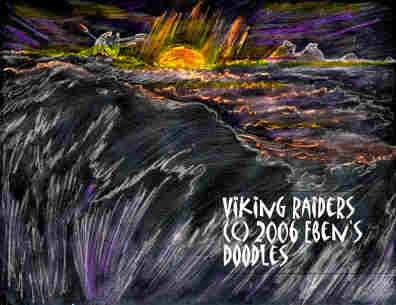
Like the Arab Muslims of the 7th Century, they seemed unstoppable on the seas, they were
so superbly equipped, trained, and yet absolutely barbaric, they regarded no man's laws but their own. Dane-land was, for one major group of them, the wolfish
mother, a breeder for the most powerful and rapacious of the whole
race. Small, but ideal for sheltering and hiding their fleets,
the northern land across from Britannica birthed tens of thousands of ferocious fighters called Danes.
With ax, sword, or bow and spear, they could, man to man, take on any armed
soldier anywhere in the world.
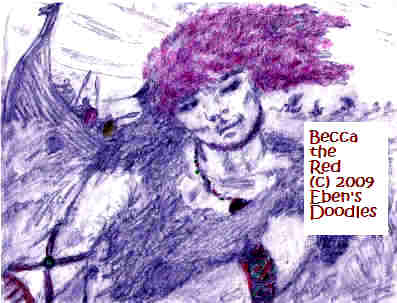
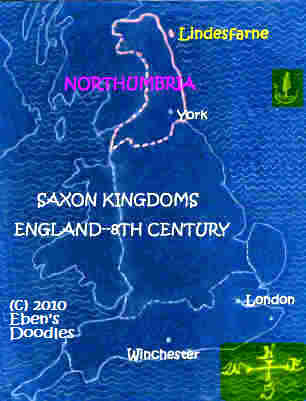
Most people acknowledged, that Becca's grandfather was the
most sagacious of men. Even wise men came to talk to him, seeking counsel in
matters small and great. Chieftains and princes also came, since they were invested with weighty affairs of state regarding whole districts. As for the Danes' king
headquartered at Hedeby on the Baltic coast, in regard to the expeditions
of war fleets
for raiding and plunder that sallied forth from there, an official came one day and returned to the king with a sour expression, bearing Mimir's counsel which said all the king's
plundering of neighboring folk would bring nothing that would not turn to ashes in his hands one day.
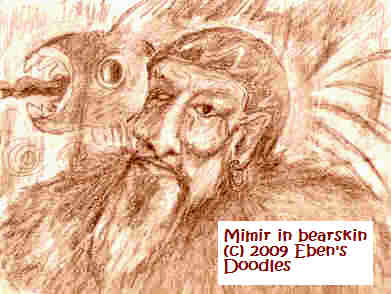
The greatest of the king's plans centered on Lindisfarne, or the Holy Island.
Lying hard off the coast of the King of
Northumbria's domains, the island was the seat of St. Cuthbert's Church and
monastery, the wealthiest in all the Saxon kingdoms of the British Isles. Having
long eyed that glittering treasure-hoard of the Christians, but keenly aware how powerful the
Northumbrian king was, the Danes conferred together
as to how best to join their men-strength, weapons and ships to seize it. As their fleets grew in number and strength, the day passed when they were not assured they could
match the
Northumbrian king's forces with their own and win the prize. But, after hearing all the various strategems thrown out in the thick air of the king's grand feast-hall, some
craftier soul among them had this cunning thing to say: "Hold, all you high chiefs and young, daring blades! Why fight the king? We need not risk
our men and ships in battle with the Saxon dog? Why not sail our fleet on a suitable day of our choosing and take the Holy Island by surprise and
carry away all we want from it before the king springs from his bed as he hears the first
alarm?"
In the following days, Becca continued his regular pursuits, though
the meetings increased concerning a coming expedition that involved all the
ships combined that the Danes could muster. Being of fighting age, he was
not exempt and had to attend, so he went and listened to the older men discuss
the matter concerned. The king was involved directly in
its details, which meant it was bigger than the chiefs' usual raids. What could be
bigger? Lindesfarne, the golden prize of Northumbria, of course! Everybody knew
that, though no one dared to speak about it openly in public.
The best way, he found, to draw him out like drawing water from a deep well was to ask him things and get his responses.
When the old man's eyes closed, and Ingmar drew up the beautifully dyed and woven woolens, taking a stool by the bedside to watch him for the hours of the night, then Becca
withdrew and went out to let him rest until the next time. In the meantime, he
recited what he had heard, over and over, commiting those wise sayings to memory. The sayings were like pure gold to him, better than gold, since he could carry them
anywhere and no one could steal them!
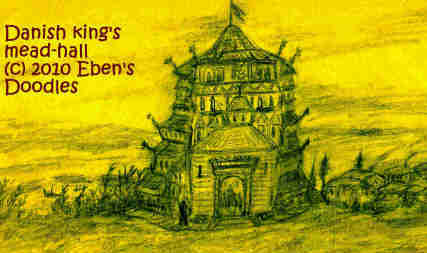
Becca stopped by his home to pick up his hunting gear and a bow and
went to see if there were some game birds for the table down at the nearby
marshes along the river.
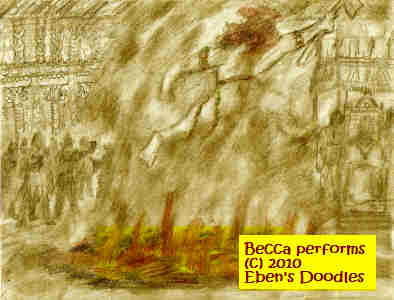
The king liked his fire leaping so much,
executed with a battle-ax, that he couldn't get enough of it seemingly. After he
leaped it, then he would bring the battle-ax down on the embers, casting
thousands of sparks whirling upwards, as he gave battle cries and leaped, swinging
the ax beneath his feet.
His sword play, clashing the swords together as he leaped,
gained him a lot of applause and cheering.
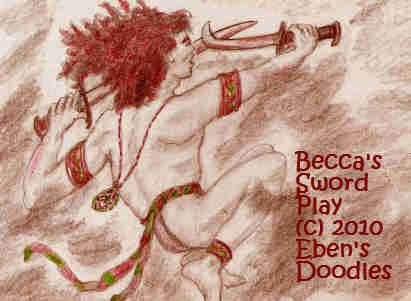
Becca's leaping and dancing with swords delighted the nobles of the king but they
enjoyed a good riddle just as much. So Becca supplied them with riddles!
His singing, dancing, and riddles captured the men's
hearts, despite the jealous professional skalds looking on critically. They remarked he was
stealing from their riddle-hoard, but what they said was not true, he knew plenty riddles his grandfather
had taught him that the king's skalds and jesting fools hadn't even heard. But his enactment of the death of the most beloved god Balder was the
most popular. Balder was a young and handsome and strong, brave and
courageous, and his loving mother, the goddess Frigga, sensing that he might come to an early end,
tried to get the whole earth to agree not to harm him.
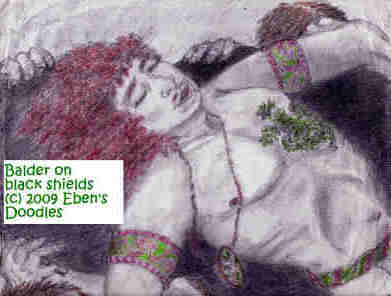
The king and his entire court and all the celebrants with him
went out to view Balder's pyre-ship burning. This event was a costly one, indeed, for the ship was no rotten, old derelict. It was a very valuable ship the king kept in his own fleet, that was still seaworthy and could have been sent on raids but was sacrificed expressly for this grand event.
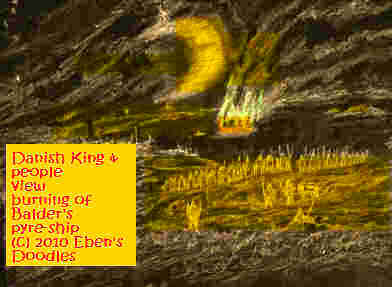
The reenactment of the
Balder tragedy was a
great success and the king was vastly relieved, as it had cost him greatly in
the loss of a fine fighting ship. Becca instantly became more than a clever gymnast and a skald combined, he
was seen as a hero to the king and the people, who represented the the
greatest story they had in their long memory of past events. Becca was given
a king's ring, a bag of gold, two cows, and ten sheep, with
a nobleman's cape besides! He could have asked for a royal bodyguard
position if he had thought of it and gotten it.
He could not forget how his father had once seized
him by the shoulders, his voice choked as she said: "You have my color eyes!
You have my heart and blood also! If I let you go, and you did not come back
alive to me, I would perish too. What are your brothers to me now?
You are more to me than all of them! They care only for
their own things--not like you, you are different from them."
Becca, as if he were set like a clock,
awakened promptly before dawn, and crawled out of his
sheltering log.
Months before this year dawned, he
began to think afield again. He was a man and wanted his own house, wife
and family. He had his secret hoard of gold, ornaments, even
some jewels. But he would
need more to last him a lifetime. Why not volunteer on the
raids that were going on increasingly, now every year in fact?
If his father would release him to fight, he could
win some plunder and no one could take it from him--not even
his father--as it was accounted a warrior's personal
property, and no village chief or his own father could
take it away. Law protected it. He could take it to his
grave and have it buried with him, if he so chose.
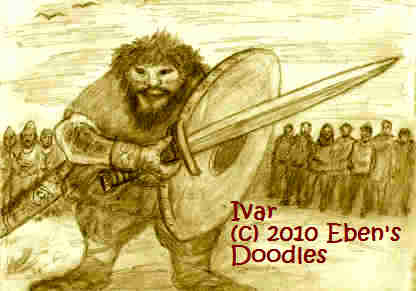
But the pig-eyed man was dangerous, a war veteran
who did not give quarter.
It either worked this time, or he was
finished, for this man--Ivar Hairy Breeches--
was not known for treating anyone kindly
who failed to fend him off.
In fact, despite what his brothers had told
him back at the breakfast, he would kill and finish the
job with taking his head too for a belt
trophy, if he wasn't hauled
off a man.
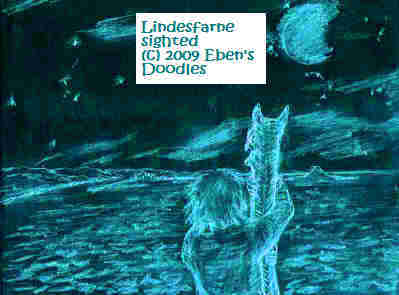
It was too dark as yet, so
they then moved slightly south of it, to the lee
of the island's highest point, a mount of bare rock, and
waited, in the hopes that no watchman was
standing duty there to give warning of them. They also
hoped no storm would blow up and
seriously endanger the whole fleet and the expedition.
It was dark, and they also counted on not being spotted
by any patrols sent out by the Northumbrian king. Perhaps they would be lucky, and the
king's eyes and ears would be shut, as they slept off the
effects of the glad celebrations of the days before.
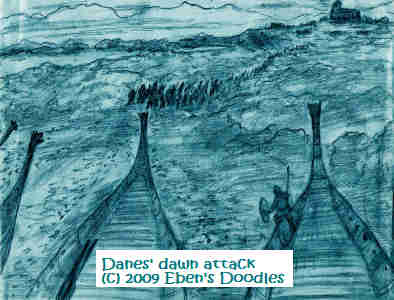
Becca and his fellow crewmen found the
guards' huts and the battle began. They had little
difficulty, as the men were mostly asleep or groggy, and
were killed, most of them, struggling out of their
beds as they reached for their weapons too late.
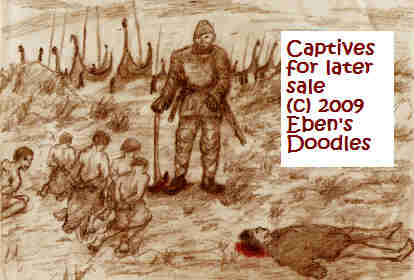
Even while the sacking was going on, buildings were
set afire, as the Danes always preferred to leave nothing standing if they could help it. Why? It was just their old custom, to level the
the sites they raided. But there might have been this practical
reason too. It made it easy then to tell if
the people, if there were survivors, had returned after all, if the buildings rose again.
Othewise, the ruins could fool a ship at sea, and hold nothing for them for the trouble of going to look.
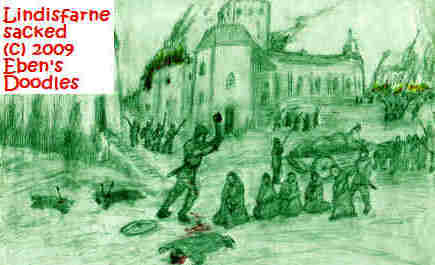
Custom or for practicality in a raider's cynical
book, burning always created a great deal more terror and confusion, which
helped them in their efforts to completely subdue any opposition.
If the terror was great enough, less resistance. Cowed Sheep were thus
easy to manhandle and slaughter. After all, they hadn't come for the fighting, they had come for easy plunder.
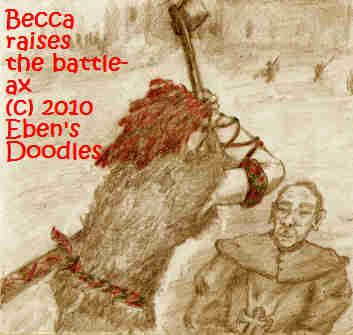
Since this was Becca the Red's first raiding expedition,
he was normally excited and did all that a young warrior
was trained to do--without much thought about it. Obeying
Soren's orders it went so
quickly and well, and he dispatched the guards, then turned with
his comrades to deal with the pilgrims and the monks.
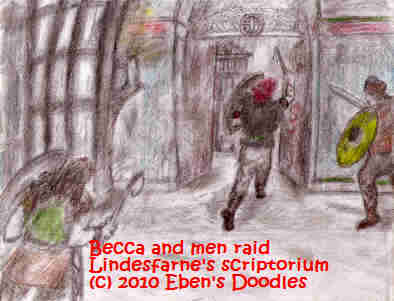
There they came to
a door set in a long wall, and Becca chopped it open and swung the
doors wide. He burst into the great hall and found strange
things, indeed. It was full of work desks, stools, benches,
writing tools, and cabinets full of books, all very large and
full of mysterious Christian runes.
The monks' novices were driven at spear point to the shore along with the other captives, and
Aelfric waited for whatever would happen to him, his hands bound
behind him. He watched the biggest boys killed with ax blows, strong young men who might turn on their masters or attempt to escape, but
the very smallest ones too were also dispatched, since they judged
too weak to do heavy farm labor and cattle herding. Was he too small?
No one came for him, and he thought he might live, but
then he wasn't sure. What if he and a few others around him
were to be killed, and they just hadn't gotten to it yet. He felt
this must be the case, and was certain he was doomed. He began
praying, for there was nothing else to give him any help or comfort.
The Danes, he knew, were pagans with no sense of mercy for their
captives. They destroyed everything they did not carry away, for the
sheer joy of destroying fine things. They were nothing but barbarians,
and so that was all they knew to do. He felt sorry for them, but
they terrified him more than he felt sorry for them. Only one of them had
made him give his name--what did that mean? As he waited for
some Dane to come and kill him with his ax, a flame-haired
Dane moved closer, inspecting one captive after another.
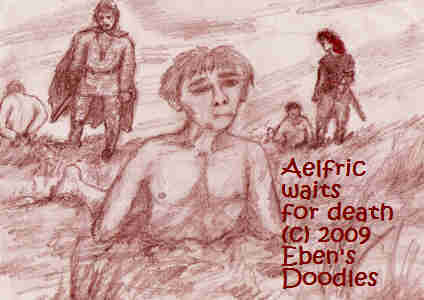
Then the big, tall Dane with the lion's mane of red hair falling down his
face and over his shoulders came to him, and called his name. He answered,
and the man grabbed his arm, hauling him to his feet, and then
made him walk toward one of the ships that stood drawn up partway on
the beach.
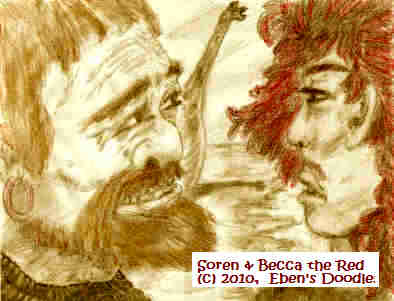
Soren, though smaller in stature, swaggered up to Becca.
At the docks and yards on return, the moment they berthed, the men in Soren's crew scrambled off with their treasure-stuffed lockers as fast as they could,
eager to get away from the tense atmosphere aboard ship.
No drawn bowstring was half as taut as that strained silence on board! The booty aboard, stowed in a big heap containing gold, silver, jeweled altar ornaments, fine robes, and foodstuffs and mead, was also seized and carted off in a great haste to the dividing stake in the village. All they wanted now was to
gather their fair shares of the booty and whatever slaves were apportioned out, and
head home to celebrate. Only two men and one slave lingered behind--the two
antagonists, Soren and Becca, and Aelfric the monastery novice Becca had snatched out of the
scriptorium in the sack of the main sanctuary of Lindesfarne.
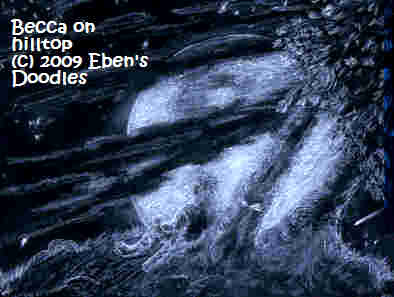
The sun went down, a cold wind blew, and it became dark. Then he knew! It was like light in a dark place to him. A beautiful, sleek, dragon-prowed ship--he would build his own and be her captain on the shining sea-path! There was no reason why he
shouldn't set his hand to such a mighty task.
He knew it would be a test, it would take much work and care and long labor, and all his gold hoard must be spent to build and equip it, but he knew he
could build such a ship, provided his father with his knowledge of
the shipwright's craft helped him all along the way. With his own vessel, he could make his own way
in the world and sail anywhere he chose to seek a living. What kind of living? He knew that kings, even the emperors of the East, needed fighting men, bodyguards, escorts and champions--and paid well for them too! As to who would go with him, he would leave that matter to later. He needed first a ship in hand, if
he was to be a captain taking on applicants!
Becca's case nothwithstanding, the village celebrated, just as all Dane-land celebrated,
the tremendous windfall of treasure and glory from the Lindesfarne
expedition. It was accounted the greatest victory in many a
year--and the skalds got busy polishing up old epic battles and heroes
of the past with which to add lustre to the Lindesfarne expedition. The celebrations, the feastings, the
mead-halls' gatherings, went on for days and in some places, weeks. And
already plans were afoot for another even grander expedition
back to Northumbria, to
seize yet more wealth from the Christians. They had tasted
the sweetest honey mead at Lindesfarne, and now they desired the entire
hoarded honey comb of
the Saxons!
A ship began at the keel, to which all the
ribs were fitted, and then the boards sewn to the ribs. But the single
beam of strong oak, where could he find one that was long and strong enough? He took
Aelfric to help him find the best tree in the woods in the hills, and
they looked about for hours, but without success. The woods had
been stripped of the straight oaks, and none of the remaining trees
were tall enough to give him a keel oak. He
sat down on a rock, while Aelfric waited.
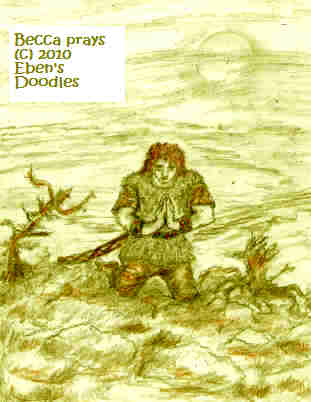
"O Lord Christos! The son of Rasmus, Becca, calls on your mighty
Name! You know all things. But nevertheless, I am in most need of a fine tree, that will be straight
and true and strong. I have nothing in my hands to give
thee for this great favor, but I ask thee to guide
me to the tree of your choosing. And I will give them
afterwards a goat or a sheep or even a cow in sacrifice to thee!
Hear my cry, O Christos!"
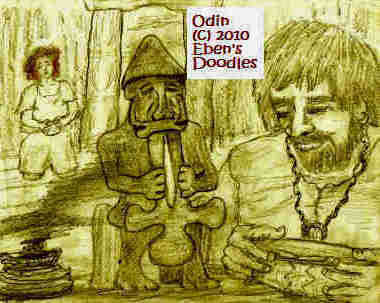
But now he was calling on the "Greater Than All." He
hadn't even thought to call on Odin, or ask this great
favor from him! Why? Odin had not cured his father, despite
all those bowls of milk, curds, and honey. Even when his
father sacrificed a goat, still nothing but silence from
Odin! The priest had nothing to say for Odin's
silence, and his father had continued to suffer.
Perhaps Odin was sleeping when they came to visit him?
They could not tell, as Odin was made of forged iron,
and never moved, never spoke, never ate,
never relieved himself, so could he hear? From an early
age, Becca had his doubts, and wondered if Odin
was deaf, as well as being half-blind because of the
loss of one eye.
His thoughts were whirling, but
somehow he was assured it would all work out.
Yes, they were far from the water, but he could
hire six oxen,
and get the trunk, after cutting away all the
branches, dragged out. It would be slow going, but
not impossible. He would have to go to quite a few
farms to find the oxen he needed, that was all.
He had his keel oak! It was better than he had hoped! With the extra strength
of this tree, gained by fighting the savage winds
that roared for months up over this ridge, a wind
that few trees could withstand over the many years,
all the struggle produced even greater strength
and endurance in the wood, making it more flexible
and less brittle. Brittle trees were the first to go down in
a gale, but this one stood tall and straight!
It could bend to any assault but never break!
But what excited him most was it was an answer
to his prayer. Lord Christos heard
him! This noble oak was the living proof!
Odin and Thor--what were they anyway?
They never answered--they were deaf and dumb!
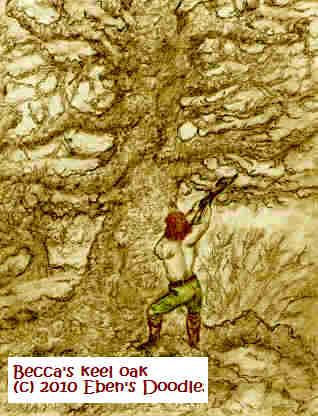
Hurrying back to the village with Aelfric,
he told Mimir and his father the good news.
It was a bigger job than he had anticipated, however,
getting the tree chopped down, all the branches
cut away, and the trunk
dragged from the site.
The first time Becca visited his grandfather after their
return home from Lindesfarne, his grandfather awoke from a nap and
asked, "Have you come to show me your booty and treasure from the raid, my son?"
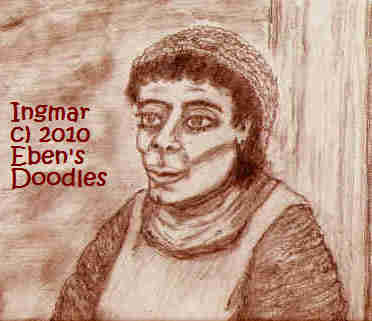
Mimir, his eyes on the gilded, beautifully painted and illustrated
pages, nodded, then saw Aelfric, and beckoned for him to come forward
with a move of his finger.
"Who has believed what we have heard?
As Grandfather Mimir rested after the reading
and translating of the Heavenly Runes, he spoke again, this time
only to Becca, who had eaten with Aelfric the roasted quail, cheese and
fried bread Ingmar brought to
them on a serving board.
"Therefore, having been justified by faith,
Grandfather Mimir, his eyes lighting up for the first time,
was full of a joy Becca had never before seen in him. He looked
like the greatest stone weight had just rolled off him and smashed
utterly to dust. Becca too felt something of this
release--as he considered the words of the Rune-Book of Heaven.
If his grandfather's sins were covered and taken away by the
blood-sacrifice of God's Son, then couldn't his own be taken
away the same time? Fighting and killing armed guards was one thing, but he had slain harmless, weaponless
pilgrims at Lindesfarne, had he not? By faith and trust in this
suffering Son of God alone--he could have the same assurance and
joy by putting his faith in Jesus Christ?
"I suspected it," Becca replied. "I saw a light in your
eyes that was the same as I had seen in Aelfric--and so I
thought there might be a reason for it.
Now I know the reason. Now I know!"
The
ship took shape, though no one in the village took interest or encouraged
him, they were all so taken up in the preparations for the next raid
on the northern Saxon kingdoms. Then his own older brothers, Helmod,
Eric, and Hoder, wouldn't even come by to look at it. They
were loath, he realized, to show any interest in whatever he accomplished or
attempted, because they themselves
thought they were superior and to show any regard for
a younger brother's work would demean themselves.
This time the ships seemed to be late in returning, though no one could guess
what day it might be.
Becca and his father saw that Helmod, Hoder, and Eric were
too despirited and shamed to tell them the full truth, so they turned from them
in disgust and seized one of the bedraggled, wounded men who had bandages over legs and even one on his head for a cap. His name was Borgen, and he was
a honest man. He told them the whole sad tale. The expedition was
defeated by a large force of Saxons! Destroyed at Jarrow! The king was even captured, and
they heard he was tortured and killed before they, the remnants of
their forces, succeeded in breaking
away from the slaughter fields and got a few ships back on the water headed
for home. The rest of the ships were unmanned and unguarded, and were captured and burnt.
"Thy glory, O Dane-land, lies slain and rotting upon Saxon earth! Saxon
furrows drain their blood like gurgling brooks! How are the mighty fallen!
Becca sang his Lament in the presence of his father, and his father took him out
into the village, so the other mourners could
hear it too. Somehow it took away some of the bitterness,
for it was beautiful and spoke so well of the
heroism and bravery of the ones who had been lost.
That is what the loved ones needed to hear, not that
they could repair the losses, but that they
heard how much these losses were
of such great value that the skalds would
sing them to people everywhere, far beyond
their own lifetimes. All men and kindred die in their time,
every Dane well knew, but only the Danes could die
so bravely and heroically, each fighting
to save his brothers' lives, though
he sacrificed his own.
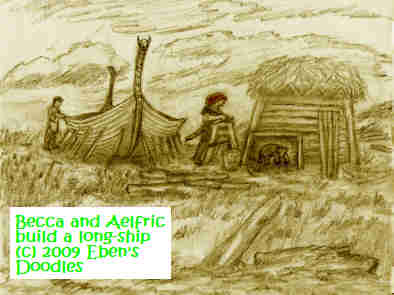
Every village, and certainly every town and city, has
an Olof, the idle carping kind of fellow and prating fool Mimir warned Becca not to
be like, who thinks he knows it all and though he
won't lift a hand is willing to give plenty of what he calls "advice."
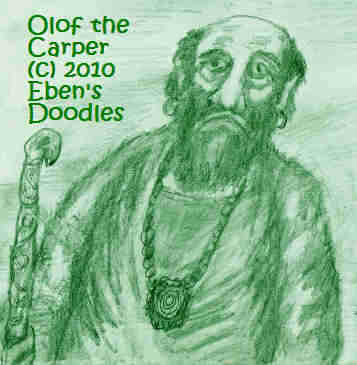
"Hey there, youngest son of Rasmas!" Olof greeted him one day at work. "Fine ship
you are building there, I'm sure, and no doubt you would be
needin' some wise counsel to get it done right."
Someone else paid him a visit. His mother!
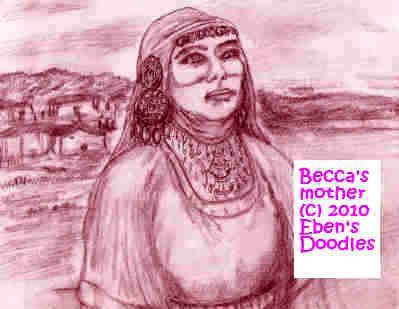
Do you like it, mother? Is it good enough?"
What a day for visitors this was! Becca was very busy
when he grew aware someone was gazing at him. He turned and
found it was Ingrid, a girl from the house nearest theirs--only she wasn't
a girl any longer, he realized. It seemed she had turned
into a woman overnight, especially when she walked and
he could see her shapely form move beneath her
woolen garment.

Her lingering glance told him everything he
might need to know from a woman who had
chosen him to be her man. But he decided he had a ship to
build. A woman was for later, when he had made
a living for his household! Just the same, it
was a hard decision. Ingrid was
ready to be a wife for a man, as far as he could tell.
And it wasn't hard for him to tell!
One day Becca left Aelfric and a bear cub
he had found after killing the mother who had charged him while
going up to the woods on the hills to gather logs for rolling the
ship down to the water. He
was drawing close with a cart of logs drawn by the cattle
the king had awarded him for his singing and dancing when
he met Olof in passing, who averted his eyes and ducked away, giving him
a bad feeling. He left the oxen and cart and ran to his
ship. How strangely silent the place was! Where was Aelfric?
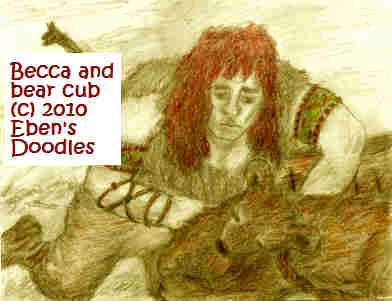
Becca sprang up, his sword drawn, and dashed to the boat,
but there was no Aelfric in it.

But it wasn't quite right. With dread in his heart
he waded out, and saw what he dreaded was true.
He pulled Aelfric out, but the body hung blue and cold
in his hands. Carrying him quickly to the camp, he laid
the boy out, and pressed on his chest, but
Aelfric did not gasp and sputter. He kept pressing, but
still Aelfric lay
lifeless. Then he saw the head wound, made by
an ax. It was no use trying to revive him, he saw.
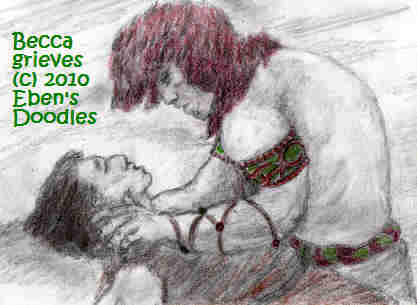
Laying his own bear-shirt upon Aelfric, Becca rose and
went to the ship. He found something, a sign of struggle with
feet tearing up the sand
next to it he had not seen before. In the
middle of the torn up ground, Aelfric's knife, and then a dark stain near it that could
only be blood. Then he knew what happened.
Aelfric had been slain fighting to defend the ship.
Aelfric went and got his father and Mimir's shields, and with his own he and
two big boys from the village went and carried Aelfric on the shields to
the house, where he was laid in honor in the main room.
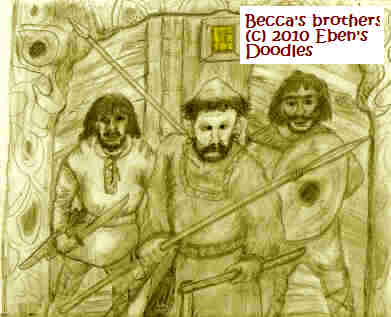
They strode forth with a swagger, and just began to speak the customary
greeting when their father silenced them. "You three are the disgrace of my old age! You have
sought to burn my son's ship, for you were always jealous of him and
hated him for his good ways, and you added to this crime by slaying
his boy slave that served him well!"
After the custom of a certain number of days he was
mourned, Aelfric was buried with honor. He lay in Becca's bear-shirt beneath a fine cairn of big, smooth stones that
Rasmus and Becca heaped up, to keep his bones and the fine ornaments
given him by Rasmus and Mimir safe from spoiling by wild beasts and robbers.
On Aelfric's neck and arms Becca put his own neck ornament and chain, and his bracelets.
Last of all, Becca laid Aelfric's knife and a long straight timber of the
ship's wood.
Listen, brother Danes, Becca the son of Rasmus sings this Lament. Who is my true brother?
A roaring fire was lit by the cairn, in which they
burned the bear cub, and they sat in vigil
for that night by its embers. In the morning, father and son returned to the ship, and knew as they looked at it that they need not fear for it anymore.
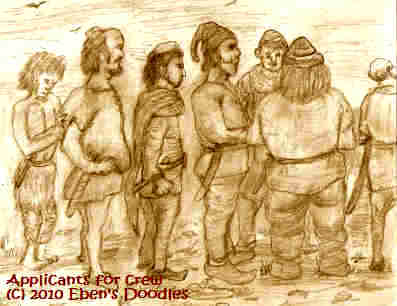
There wasn't a one he could take! It was useless to test any of them, he knew
they were unsuitable the moment he set eyes on them. After sending them away, he
went to his grandfather and father, asking their counsel, telling them it
seemed hopeless to find a crew among the Danes that were left.
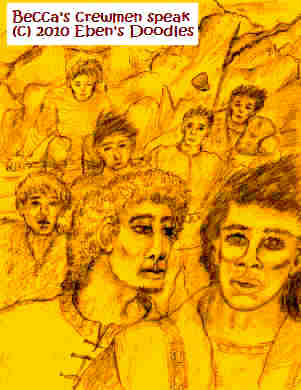
"Captain, I too have felt that way, when I saw the raiding parties
launch, and then when they returned, I saw what effect their
treasure and slaves had on them. They were not good men, not men
of honor then!
Their wives and families suffered, as they were all the more
abused, despite the good fortune the men had won with
their weapons and courage on their raid. We have not been made happier, though
the people have become richer, and our chiefs becoming
mighty have been able to quit scratching the soil for a living and
erect great mead-halls for banquets and the skalds to
sing in."
Another new crewman, Bjorn, son of Bjorn,
stood and spoke and asked Becca a question. "Would you
think of moving from Dane-land and settling among us with
your household? We need more men like you, sir. We would
do anything if you would make our land your home."

Grandfather!" Becca called, hoping he might awaken
him to his presence. "I am Becca! Your grandson! Father and I are back."

He thought about what his grandfather had described of
things to come about within another generation. Danish ships and arms would win glory
for a time, recouping their terrible losses at Jarrow forty years before,
as they returned to fight the Saxons with even bigger fleets. They would prevail this time,
and Northumbria would be crushed and the other northern kingdoms too.
Yet his people, once they settled down in those lands, would be
conquered, and the lands again ruled by Saxons as they had been before.
What use was all that fighting and shedding of Danish youth and grown men?
When the next week turned, and they loaded the longship and a knorr from Hedeby and were
on their way toward the northern coastlands, Ingmar sat in the hold protecting a
leather bag containing earth dug from Rasmus's fields, which was to be poured out at their next
farmstead, and another special earthenware
urn, containing Mimir's heart plucked from his pyre's ashes, for she was
going to be part of Rasmus's household the rest of her days. She was offered her freedom
and some gold and silver to help her, but
said to Becca and his father she chose
not to return to her Saxon village, for it had been so many years she would
return a stranger, and find her parents gone and her relatives looking
strangely at her and maybe think her a burden. Besides, no man would ask her to be his wife at her age,
so how was she going to support herself? She would be very poor indeed, and
a solitary woman, with no man to protect her. Rather than that, she
wanted to remain with the family she had served, for they were kind to her,
she said.
Becca sprang to his feet. "Howso?" he called out. Then he waited.
More words came.
What cursed things? Becca looked all around him for an explanation. But there was none.
He had to return to the ship to find it out, he realized. He
climbed back around the headland's big rocks, then hailed the ship
that lay not far off.
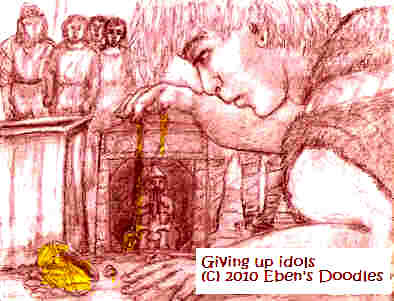
Finally, the last man had given up whatever god or
pagan item he had brought
onboard. They all looked mightily relieved, as Becca
observed, once this was done.
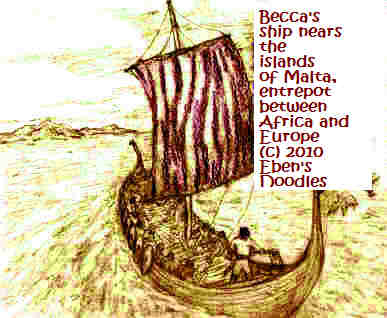
Making much out of little, extremely fertile patches of ground, the gardens were cultivated and watered by hand-drawn water from deep wells, yielding all sorts of fruits, trees, and grains, with rock walls
enclosing them and sheltering them from thieves and the burning, dry winds of Africa just over the horizon.
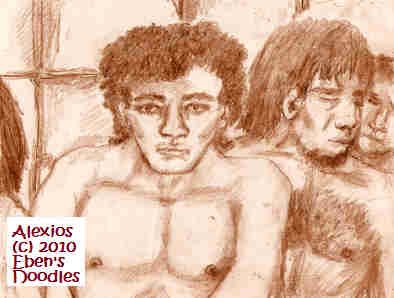
He offered to buy the slave, and the slave master, Hakim from
Carthage, was not about to sell him, for since it had been such a poor day for sales he was just then prepared to drive
the whole consignment back to his ship for transport to the bigger markets of Carthage.
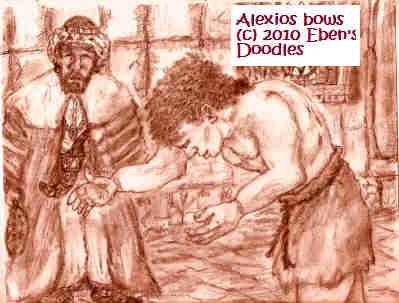
Hakim was one of those who saw the gesture, and was visibly chagrined, reminded by this of his own recent harsh whipping of the slave, who had just now escaped his clutches. Becca too was surprised, but
he saw that it only confirmed that he had made a wise choice, that this slave was
different. Could he replace Aelfric? No, but perhaps he would play a different role than Aelfric, but none the less important to him. Time would tell!
Back at the ship, when they had loaded up whatever provisions they had bought
for their journey, Becca had his slave come to
stand by him as the ship cleared the harbor.
The slave had given Becca much to think about. He had not heard
about these Saracens and their religion to this extent before. He had not known
that they denied the Christian God and His Son, as a Muslim trader in Hedeby told him they worshipped the same God and that the Muslims believed in peace.
But now he knew the truth about
Islam, their religion, and would he meet with more of these wicked Saracens in the coming days, and perhaps trade sword blows with them? He knew he would not mind
if he were sent to fight them--for they were nothing but cruel men, who would
force believers in Christos to take a god in whom they did not believe. How could
that faith be of value? Danes never forced people to believe in Odin or Thor--
why should they believe in their captors' gods? It was forced! Anything a slave was forced to do, would
God accept that as true homage? All the love of freedom in his Danish soul
rose up enraged at the thought. He knew he would have fought such
a thing himself, with all his strength and will. No one was going to force him
to give homage to a god, it was to be of his own free will or nothing!
"Now what do you want of me, master?" Alexios asked Becca, as Becca took a sponge and a bottle of olive oil and applied the healing oil to Alexio's lash-covered back.
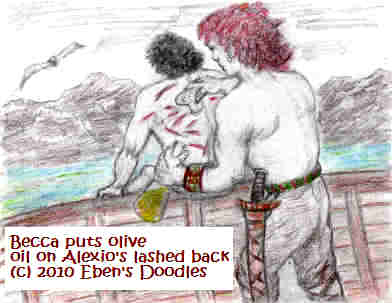
Becca smiled. "You are Greek, are you not? I am Danish from the far north country, a barbarian to your eyes! I learned of you Greeks when I was a boy. You have your heroes and great sailing ships too, like us. Greeks still come all the way to our markets, just to buy amber, some of which I have brought with me for trade. It is true, we are barbarous, and need much teaching. Teach me your Greek language and your runes, for
that is why I rescued you from that dog of a trader. I saw you were not like the others, you
were a man of knowledge, smooth, not rough handed like them.
Now tell
me about the places we are looking to go."
As for why they passed by the slave's home, Becca explained: "If I come with this one steed of war, your people might set upon us and kill all of us, thinking we are returning for more captives! But I will take you back to your home after we
reach the city of your emperor."
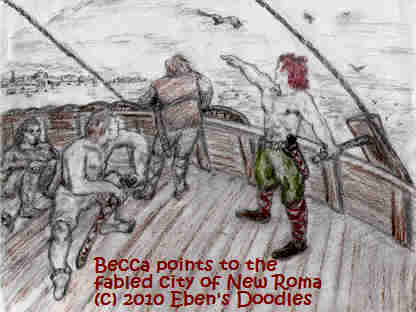
Becca was already known to the City Prefect and the naval authorities as they
were stopped and interviewed by commanders of imperial warships while still miles at sea.
After a lengthly inspection of his ship and his men and weapons, he was ordered to report to the imperial court for possible service to the Emperor.
There he
enlisted his ship and men in the naval forces of the emperor, who drove hard deals with
barbarians who entered his service.
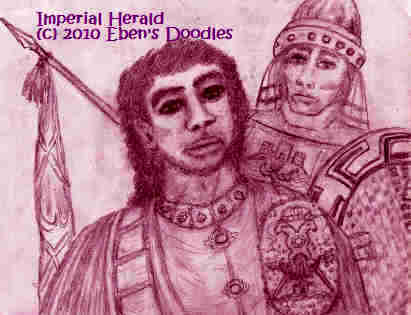
"We know that you, as foreigners, do not know our ways, but you will learn them. Welcome to New Roma! You are more than a guest, you are
to be extended every courtesy, as your character as you have already displayed is rare among barbarians, and
is greatly prized here."
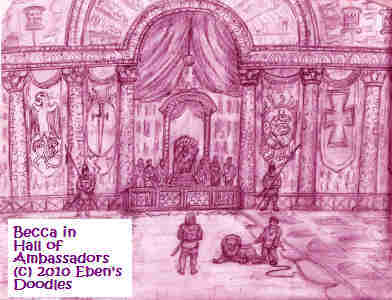
A jem-incrusted throne that rose up into the air, transporting the emperor to the ceiling of a immense mead-hall that could contain all the mead-halls of the Danes and still have much room to spare? A golden mechanical tree by the throne that held golden, cunningly fashioned birds that sang as sweetly as any in the wood?

The amphitheatre was another great attraction, of course, with four chariot races daily, attended tens of thousands of citizens, half of which were one color, half another, depending on the colors of the two favorite contenders. They all drove quadrigas,
which were drawn by four horses apiece. As they raised around the obelisk, Snake Column,
and a gold-sheathed column of the Emperor Theodosius, with the crowds of tens of thousands roaring their
favorites' names from the tiered stands, it was a magnificent spectacle to the Danes, beyond anything they had imagined it would be. The emperor himself and his chief officials sat in a special box, which
had a private entry opening on a guarded tunnel that took him to and fro from the palace.p>
Gambling was a Danish passion from of old, but Danes were not particularly obsessed with horse flesh, preferring their "steeds of the sea" to the land-bound species, so they did not spend
the day there, as most other visitors would, throwing all their cash away on this and that contender.

Allowed to remain armed, to keep their swords and shields because they were imperial bodyguards, Becca and his Varangians were escorted through the most magnificent and largest temple on earth,
the one built by Emperor Justinian three centuries before. Becca was more than
thrilled by the sight, even moreso when he was told the edifice was called Divine Wisdom.
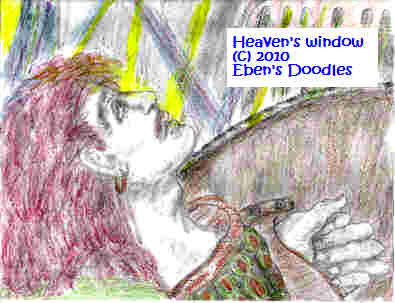
In the galleries on the second storey, gazing down at a forest of alabaster columns and upwards at
countless shining golden lamps and domes overhead pierced by
many-colored windows all pouring their light and color into the
vast spaces beneath upon thousands of congregants and priests, he paused to take his sword and with the point carve a rune on the
alabaster railing. It was one he had learned from one of his northern tribesmen onboard who
was the son of a rune-master.
Touring the world's greatest and wealthiest city and its marvels, they were interrupted by a call from the emperor to
return to their ship to get ready for duty. Spies had reported
a sharp increase in activity in the ports of Muslim kingdoms to the south. Diplomats from the emperor had been hard at work, trying for months to delay the coming attack with
treaties and offers of many gold byzants for mutual trade and prosperity, but the Muslims under the leadership of the Caliph of Baghdad did not want to
share anything, they wanted to seize the whole empire of the Christian emperor at New Roma,
lock, stock, and barrel! Holy, golden-domed Byzantium had been assaulted countless times before, but her
triple walls would repulse them, so that the only way left to her enemies was by water, by sea-borne war ship. The enemy fleets could do much damage to the country, and so the emperor was forced to destroy them, or suffer the destruction of most of his country, even if the capital itself was spared any injury, thanks to its tremendous land and sea walls and forts.
The emperor's chief weapon was not sword or warship or
even massed calvalry charging the enemy--it was Greek fire! A demonstration was
given Becca and his men by a descendant of the discoverer of this weapon, held in a place of ruins where
military devices were tried out and tested.
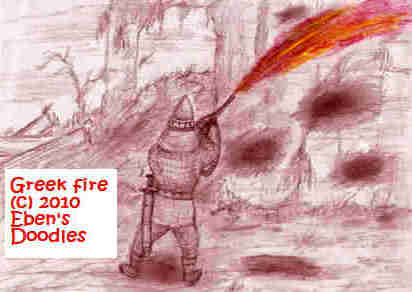
After the hand-held cannon was displayed to Becca, the
great-grandson turned to him and gave his name. "My name is
Basil, and my forefather was Callinicus, a refugee from Syria when the
infidel Muslims invaded. He brought the secret recipe for
the fire we use against our foes. Next I will show you
the munitions works where I prepare my special fire for the emperor's forces."
Becca and his fifty warriors soon had their
first action. Everything worked well, as Basil had shown them
all they were to do to handle Greek fire safely. The training session was
abruptly turned into actual combat when the Arab armada launched a massive
attack.
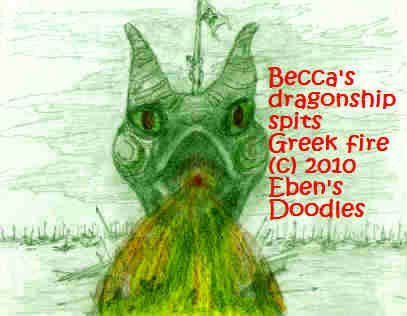
With this wonderful weapon they met the attacking armada head-on and burnt ship after ship of the enemy navy. Becca
was like lightning from just heaven, as he laid waste to the invading armada, whose god
denied the One True God for whom he had gladly given up his own people's false and
bloody gods. Yet he felt sorry for his and the emperor's enemies, as they perished.
"It is too bad they do not know the truth. They are ignorant of the truth.
That is why they serve such a low god of war and blood as this they call Allah! Wasn't I such as them, only but lately?"
Probably as a result of this thought, that the enemies of God were ignorant and did not know what they were doing, he ordered a swimming enemy sailor rescued from the water, even
against his own men's wishes. Alexios in particular
was unhappy with bringing an enemy aboard. "But that man is a snake, master. You must not bring him among us, for he will turn on us when he has a chance and bite one of us!"
Indeed, the saved man was not happy at his rescue either. He had pushed the oar away that
was held out to him to grab. Several times he did this, then finally
grabbed it and he was pulled onboard.
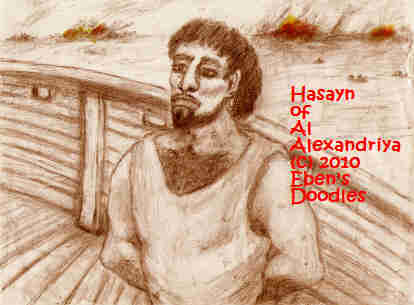
Becca send Alexios to see if he could find out anything from the prisoner. "Come and tell me if you learn anything," Becca told him. "It will help me to decide what to do with him. I don't want him harmed, just let him speak so we can tell what he is about."
"What is your name?" Alexios, who knew some Arabic language, asked him.
The Golden Horn Chain was drawn up well before the Muslim navies appeared.
Boys took advantage to climb out on it and cross to the other side. But this was
now wartime,
soon the guards were posted that kept everyone away, except those who came by ship
to inspect it.
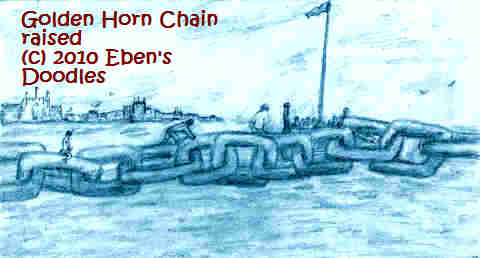
When the sea battle was over, and the scorched remnants of the once
grand and formidable Muslim navies
drawn from Egypt, Libya, Syria, and Lebanon were turning and fleeing back to their
home ports, Becca's ship returned to the imperial wharves, a day's work well done. They knew they would receive double pay at least, with perhaps a reward on top of that! As for Captain Becca,
he knew he might even be in line for a promotion to squadron commander of the auxiliary
mercenary ships, as his has performed the most ably and taken out the most enemy
ships of any of the emperor's navy and auxiliaries. Trebizond's
fleet had been a great help to the emperor among, but he knew he had destroyed
more ships than all of them combined. It was the agility and manueverability of his
longship that proved a great advantage in navigating the battle scene and getting to
fresh victims. In the time he had dispatched four enemy craft, his best competitor
from Trebizond had put away only one. There was no rival to his ship, indeed,
and his fine, individually-picked crew.
The whole capital was full of celebration. Huge crowds had
thronged the walls and towers and watched the battle from start to
finish. The cheering when up the moment the enemy turned tail and fled away,
Becca's ship in hot pursuit, taking out several more of them before he
turned back. It was clear to all that the
emperor had won a great resounding victory over the enemy, one they would not recover from for
years. It would give them peace from that quarter and perhaps even tribute and
recovered territory if the emperor followed up with further military action on land
to regain provinces, such as
Egypt, Libya, Syria and Lebanon that Muslim armies had invaded and taken
starting in the 7th century when Mohammed their prophet and war commander first gained control in Arabia.
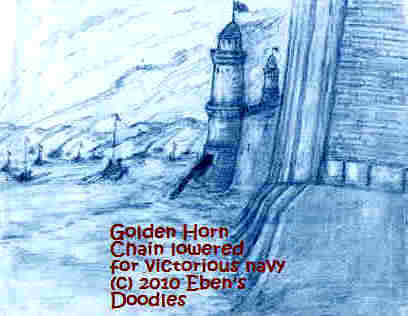
Becca directed his ship to the military's naval wharves, but they were
full and very busy, and the dockmaster informed him that he
was early, they were not prepared to take his ship and his men yet. As soon as
the ships at dock could be loaded for the new imperial expedition to
Thracia, they would be
sent out, but that might be in a day or so. So Becca moved on to another anchorage and there
were plenty he knew of where he could tie up. He continued
to a quay at a big commercial square, and found it open at the moment. They
moved in and tied up. Becca and his men tied up the ship securely, took their belongings and arms,
and leaving a guard, they began to move into the vast square.
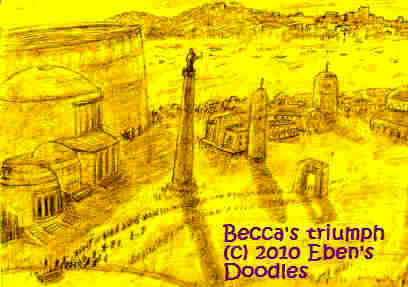
As Becca and his men trooped through the lines of
celebrating citizens, many calling out his name,
he felt humbled, as he recalled his father and his grandfather,
and wondered what they would say if they could see him now.
His father would be so proud, but his grandfather? Old
Mimir would stroke his wispy beard no doubt, then
say something like, "This too shall pass!"
There was little spoil, of course, from this naval battle, since the ships were burnt and
sunk with everything in them, even though
it was still a very great victory. A few ships had seen it was hopeless and given up and had been captured, which
yielded up some recompense to the victors as well as slaves to be sent to
the quarries (since there was no other safe place to place them, and prison for
the rest of their lives was
out of the question). But most of the enemy fleet had been incinerated by
Greek fire. One ship was allowed to flee away, to take the news of the calamity
back to the Baghdad caliph and his Egyptian and Syrian confederates.
When Becca arrived at the main gate of the palace and
gave his name to the guards, they knew at once what to do. He was given escort
directly to the emperor in his royal quarters.
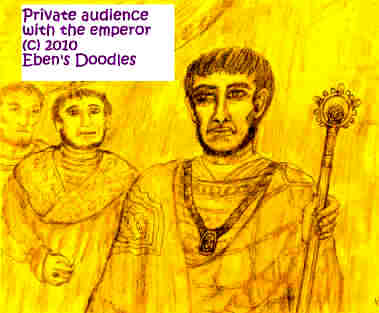
Dispensing with protocol and ceremony, the emperor got right to the
point of the private interview.
The carpets arrived just as Becca and his men were about to leave the next
morning for a voyage to the north, to give added clout to the emperor's bid to quell the Bulgars that were
moving down across the border to settle in the emperor's European territories north
of Greece.
While he waited for the
physician to be roused at this early hour and
come to the barracks, Becca had time to reflect
on the events leading up to the attack.
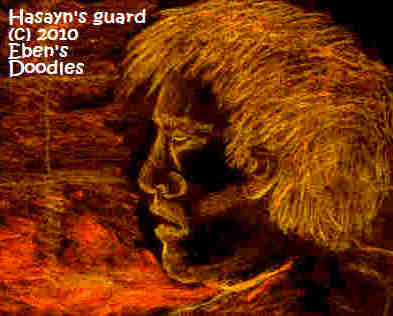
This sight made Becca feel even worse, even sick
in the pit of his stomach. He went to a corner and
retched into a basin, then wiped his face with some water on a towel and
tried to get his thoughts straight. He
now had two deaths to his account,
both unnecessary. Despite all the wisdom his grandfather had poured into him,
this had still happened! Where had he gone wrong? He now reconsidered, with
the facts staring him his face. He should have listened to Alexio's warnings! Alexios
knew the followers of Mohammed a lot more, and so he ought to have
been listened to. But he had to do something, he
felt he couldn't just suffer waves of remorse and self-blame. What good would
that do?
But he couldn't think too long, the
dawn was near, and it would be time to
set off on the new campaign against the
Bulgars.
Now he knew why he was so well received andf
well treated--the emperor was desperate for
new allies, any allies. He had alienated his own
people and even his own military. His
mistress-wife was hated even more since she had been
elevated to wife and "empress," so how could he expect
a son of that union to be recognized and
received as heir to the throne? It was an abomination to
the people, who knew the standards of God and
would not let them be abrogated in this way, even by
an emperor!
The means to dispose of
Hasayn came right to the back door. He was the one
who came every morning
to sift through garbage behind the barracks, and haul
it away to the dump. A barracks
cook detained him, and word was sent back to the cook, for him to take Hasayn's body
if he would, for
a good fee and bury it. There were no questions asked,
as Becca's name was sufficient enough to bury
him wherever he wanted.
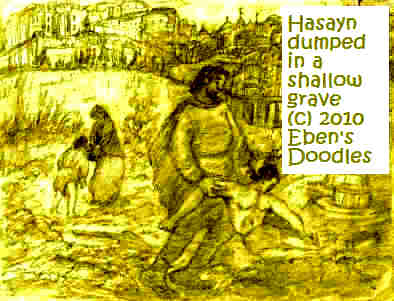
Of course, that didn't protect the body very long, as
the dump abounded in dogs that dug there for carrion, and lived
on dead carcasses, whether fish, fowl, canine or even human.
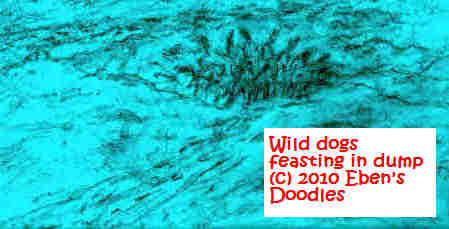
Then, with the body of Hasayn and the dead dogs
and other carcasses revealed, the fighting began.
Top dogs weren't going to feast alongside
of inferior mongrels, and first these inferior
wretches had to be driven off, which they soon were,
though there was a lot of savaging of each other before
the top dog gained command of the carrion.
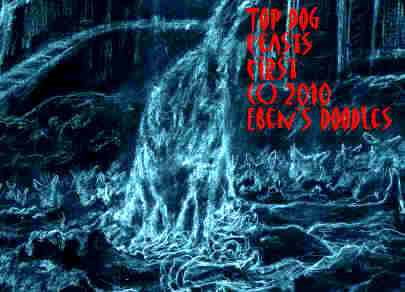
But other alpha dogs arrived on the scene to claim
the prize, and the
top dogs were rivals too of each other, and
they now fell on each other in their haste to
get the best parts of the abdomen's entrails and then
the other body parts. A leg went this way, an arm went
another, but didn't go far, as dogs tumbled
one over the other, tearing out fur and
nipping at each other's soft parts.
It was utter chaos, which the beaten
ones had to watch, though a couple
ventured in, and then were soundly
whipped worse than before and driven off once
again.
Claudius, the lowly refuse-handler, with the generous fee from Becca the
Varangian commander in hand,
was now a man of some means for the first time in his career. Up to this
day he had lived hand to mouth, with nothing to spare, as
he only scratched together enough money each day to feed himself
and his wife and two children he kept in a nearly roofless but rentless hovel outside the
walls. Even the rag and bone venders had been better off than Claudius!
Coming episodes:
Becca settled in with his men to their assigned quarters outside the
royal pavilions of Charles the Great. He could hobnob with other commanders
of mercenary forces if he chose, but he preferred his own men, and their
company, rough as it was. Franks were fearless, stout fighters, he found,
but they also tended to act superior to his own men, as if they were the most
ignorant savages, coming from the icy northern wastes that
someone had described to the Franks, though it wasn't nearly as bad in
Dane-land and the northernmost territories of the
Northmen as it had been pictured.
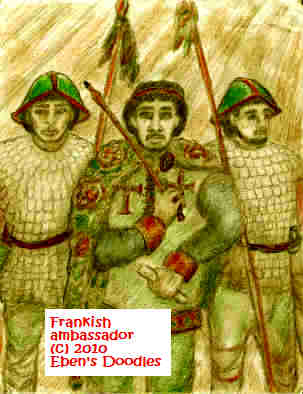
An hour later, the interview with the ambassador and
a second private talk with the strategos concluded,
Becca climbed back on board the ship to face
the inquiring glances of his fifty champions.
It was all too much to decide in a short time, so he
asked time of the strategos, that he could
think about it and then give his decision.
The strategos was not pleased. "I
had orders to come and arrest you on sight,
since you were not presumed loyal, being
a foreigner, but I forebear,
knowing you better than the
patricians and commanders who
counsel our ruler, Irene. I thought
you would see reason by virtue of
my forebearance. But now you ask
time? What is there to consider?
If you refuse our offer...
you will be responsible for the
consequences! I cannot help
you then. Well, how much time do
you require? I am busy with this
campaign, and will meet soon
with the barbarian Khargan and
issue him the conditions of
a peace pact. I cannot give you
anymore attention than this.
Becca agreed with these instructions. "It is
enough, and I will do as you say.
But I have to think upon these matters
before I decide."
He made his request
for counsel in a simple prayer, then
sat and waited. He did not have to wait
long. The still, small voice spoke to him
in his heart. "Do you return to
your former masters, for they do not
do my will but their own? Go to the
king of the Franks, seek a place with him, and
he will reward you richly for your
service. Do not fear
the anger of the queen in the
great city, for I will protect
you and your men by sending a
darkness for 17 days that will
confound them, enabling you to
slip by their ships unseen."
"Let the dead bury the dead," the Voice
in his heart responded.
With the imperial standard of Imperium Romanum and the Emperor of East Roma
flown high on the mast, Becca's ship turned from the dock, still under the covering
of darkness at noon while the sun remained black, and he and his men,
all accounted for, including the two comrades in their lead-lined coffins,
sailed forth. They turned south from the capital, and slipped swiftly down
the channel and into the Sea of Marmara, and thence to the Dardenelles and Hellespont.
Once there, the Aegean Sea's blue-green waters greeted them, and
they continued toward Cyprus.
On the long sea-journey and also river-journey into the
heart of the realm of the Frankish king and emperor, there was plenty time at various
stopping points, and even at sea, for Becca to practice his
singing and versifying, which he had not entirely forgotten.
Back in harness with the Frankish king's
forces, Becca felt much
relieved, that he had seen to
Torkel's honor in death and also
seen his father and family were
taken care of as well as could be expected. He had let
some of his older mariners go
home with their saved
wages, for they had earned enough
to remain home for good and buy
some acreage and cattle and
live comfortably the rest of
their days with their
wives and children and
grandparents and servants.
No need to go on raids
again for such men!
They need not risk their lives
for stolen goods and stolen
wealth from Christians! They had
earned their own way, honestly and
bravely, in the world.
It came about that he had opportunity to go to Aachen, the king's favorite
residence and capital. There he was soon favored with a request from the
chief scholar of the court, Alcuin of York, to come and visit him in his
private
chambers in the palace school.
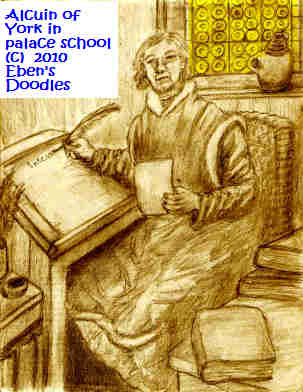
Becca was escorted into the room by
an amanuensis to the great scholar, then they were left alone, with the
door shut. Becca bowed to the older man, paying him the
honor due him not only for his position but his age, and Alcuin then rose from his
chair and went to greet him.
Charles the Frank, known across several
continents as Charlemagne,
was crowned emperor by the Bishop of Rome in the year 800, as he was defender
of Christian lands throughout his realm, and
fought against the pagans and the Muslims
wherever he found them, pushing them
back into the sea and the mountains. Becca heard of this
crowning of the Frankish king with the imperial Roman crown, but
he was a military man, and it seemed of little
importance to him personally, until
he was at court one day to see a certain commander
and caught the eye of the emperor just as he was
leaving at noon to go hunting, after turning
the rest of the business with foreign ambassadors over to
his son nearest the throne.
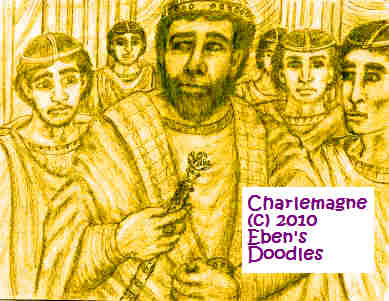
"Who is that soldier of fortune with the wolf shirt and red hair?" Charles asked, abruptly halting the
procession of St. Martin's Cape-entrusted courtiers that attended him.
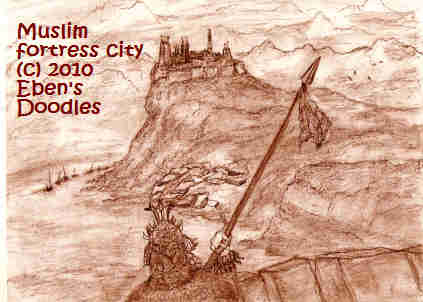
Becca kept a keen eye out to learn
everything about the hostile
territory, to discover a weakness, or if not
a weakness, some way to
turn some aspect of it to his advantage and against the
enemy who knew it best.

He sent the youngest sailor, Gundar the Scizzor-Legged, who was agile as a monkey
or squirrel,
to scale the mast and see if he saw anyone on the
crests while he debated whether to
retreat or not.
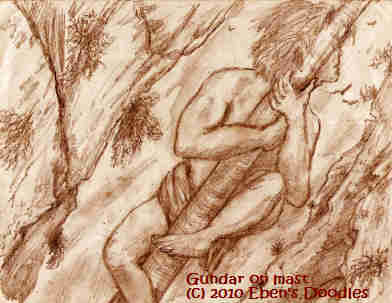
He took another look at the map, and
as he recalled, it showed a broad channel at this point, nothing
like what he was seeing!
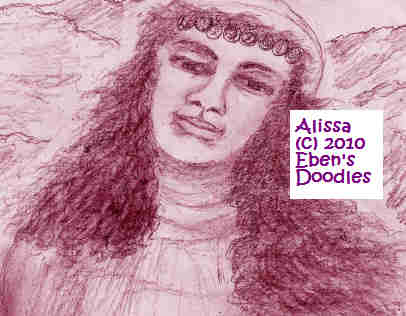
Becca had the ship
maneuvered as close to the
overhanging rock walls as he
dared, and the maiden
reached them, then by means of
an oar propped against the
rock wall of the gorge, she swung nimbly
down onto the deck.
After she had
given her warning to Becca, she
spat three times toward
the holy city of the Muslims, then
said she
wanted to return to her flock.
So they let her go, and she
climbed back up the
cliff face, though they all
wondered if she might
not slip and fall, it was
so treacherous and steep.
Becca was surprised to
find someone was swimming out to them.
He had his archers hold their
bows ready, but the youth was
alone, and he gave orders to have
him pulled onboard.
The youth lunged forward, but
Becca was faster and caught him.
Fighting to get free like
wild animal, Ranorr
only ceased struggling when
he was exhausted, and then he
wept in Becca's arms.
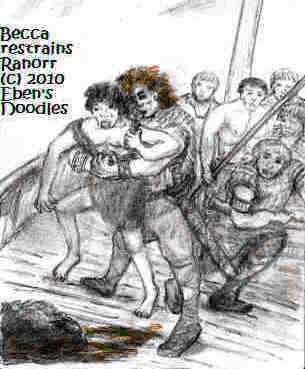
After Becca had the bag taken away and laid in his locker,
he returned to Ranorr, who was sitting still, his head sunk on his chest,
where he had slumped down to the deck. It seemed he had
fallen asleep!
The men nodded, their eyes shone, then some began to cheer--but
Becca cautioned them, and they quieted. "It may be we will
die here in this cause, but how can we turn aside and let them
suffer this slavery forever. We gave our word to Charles the
great king of the Franks, and now we see what a just venture he sent us on,
against the oppressors of a Christian people. It is time to
raise the Cross again in this land, where it once waved
from the towers and walls on the height. May the mighty sword
of God set them free this day!"
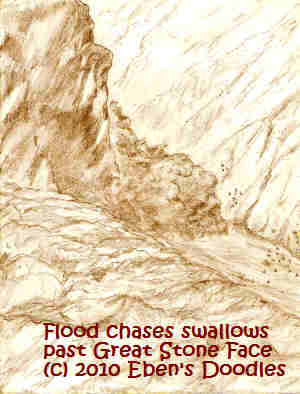
But Becca didn't waste time listening to the sound of
approaching doom, he shouted orders, and
the men sprang to the oars and turned the ships to meet
the oncoming waters.

Options for Becca

Fellow Voyager in Life, Argonaut of Divine Destiny, which way did the Lord Yeshua choose to
deliver Becca, the man of no guile whom heaven favored, from the roaring floodwaters trapped on the Upper Nive and then released to
destroy them utterly? And how did the extremely volatile Greek fires not ignite aboard
his ship when the first waves struck his vessel a tremendous blow at
the prow. Choose which you think best. Your choice will tell a lot about you
that you.

As he had done in the taking of Laith, which the Basques
renamed in their own language, Becca fought well and long for Charles
in other campaigns, until
Charles' death and his magnificent funeral rites and burial in
a royal tomb. His sons soon proved not so great, and one was pius and cunning too at
warcraft, but
the other was not and spent most of his time in the
baths and at gaming parties with his
drinking cronies while being entertained with
dancing girls and concubines.
Neglected, the empire soon began falling apart as
enemies took advantage of the weakness of the sons. Becca saw it was time
to leave, as he had given his word to Charles but
the son that ruled from Aachen hadn't even bothered to seek
him for another oath of allegiance and new terms. It was time to
go! Becca decided.
At the time Becca and his veteran crew were
preparing to leave for home, a new song began
singing in Becca's heart. Despite how busy he was, he started
composing it, and with Alcuin's help he even began writing it down with ink on parchment in Latin letters,
taught him by the great rune-master.
"I have journeyed
Becca's battle-worn ship and
tall, undaunted mast neared
a certain village on the coast that was
nestled in a small baywater of its own. Smaller than
it had been, and its people given mostly to
farming and sheep and goats, few ships sought it out these days, as it
had been forgotten by the great chieftains and
supplied few good men for the crews of
the raiding, sea-faring Danes.
A Danish woman stood by her window, scanning
the view as was her custom, and this time, of many hundreds of
times, she was
not disappointed.
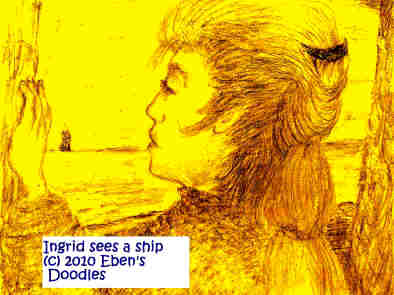
"My Sailor, home from the sea!"
Becca returned to his ancestral village. He did not come with
any other purpose but to seek a wife among his own people.
Not that the
Northlands beyond Dane-land did not have pretty faces and willing women enough!
They did--and most were even more fair in face and fair-haired and
bolder in spirit than
Dane-land could boast. But it was not the same there. He did not want
a woman whose speech would tell him as long as he lived that she
was foreign to him. So he turned his ship homeward where
his ancestors had their graves, intending to return to his father's
household as soon as he took a bride.
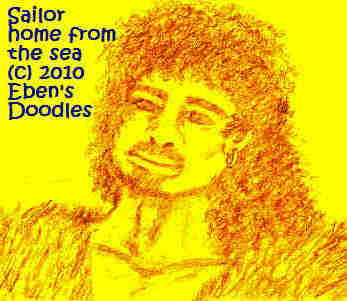
"What do you wonder, Old Oat-Eater?" Becca laughed. "Wondering can
kill a cat, you know!"
The Oat-Eater eyed him keenly, knowing the old story told children well enough, that
described how a cat seeking to raid a dairyman's milkroom had stuck its head through a hole in a door, only to get
a noose around it. "Then I was thinking, sir, if you be the jolly, bright-maned, clean-limbed gentleman she waits for...it's been
years now...maybe it is someone else, or
maybe it is you, sir. You do look part, I must say!"
Everything was
delicious, done just right as he liked
Danish foods. She won his heart through his stomach, in truth
the best way with any man since men were first created!"
"You have spoken well of yourself," said Becca.
"I have never heard the like, but
I can tell you are a woman
who speaks only plain truth. You are the woman
I want and been seeking all this time away! There is no guile in you, and you
are wise in your ways. I could never take a woman before, as
I could never find one I
could trust and respect, but
I see I no longer have to
search for such a one. My search,
my journey, is ended."

Feeling he had heaven in his grasp, Becca would have continued kissing her,
but she turned her face and pushed him away. She was a virgin,
just as he was, she reminded him.
As the chroniclers of the church
took up their account, Becca and Ingrid were married in the grand Nideros
sanctuary that would become the great stone edifice of the Nideros Cathedral,
residing peacefully among their adopted country's
people. They settled near Rasmus's household in the
far south facing Dane-land, and raised a large
family, which would abide peacefully there for
many centuries and, in fact, never die out but continue
to flourish. As they
were connected with the farm community later known
as Holm, their name took on that placename and was combined as "Holbek."
They remained faithfully Christian, followers of Christos,
the only begotten Son of God from heaven,
who as Christos was born in Bethlehem in the hills south of far-off
Jerusalem. And Becca's flame-red hair continued to
be the color of many an honest, noble, brave Holbek head, both
man and woman, boy and girl.



Retro Star Directory and Linking Page
(c) 2010, Butterfly Productions, All Rights Reserved

